Medisense Blood Glucose Meter Art06986 Users Manual Precision Xtra Advanced Diabetes Management System
MediSense Blood Glucose Meter ART06986 ART06986-Rev-B
art06986 0b702622-2d48-4c0b-a73f-d28134d62c61 MediSense Blood Glucose Meter ART06986 User Guide |
2015-02-09
: Medisense Medisense-Medisense-Blood-Glucose-Meter-Art06986-Users-Manual-554716 medisense-medisense-blood-glucose-meter-art06986-users-manual-554716 medisense pdf
Open the PDF directly: View PDF ![]() .
.
Page Count: 93

For in vitro diagnostic use.
Advanced Diabetes Management System
User’s Guide
Artwork File Name: ART06986-Rev-B
Orig. Creation Date: 28/Apr/05 By: Donald McAtee
Last Modified Date: 15/Aug/05 By: Donald McAtee
Software/Version: QuarkXpress 5.0, Photoshop,
Illustrator.
Fonts: Please Refer to Collection report.
Bar Code (Code 39):PRT06986 Rev B 8/05
Colors:
FILE INFORMATION — For Artwork and Packaging Department Use Only
PMS
286
CMYK PMS
289
ART06986-Rev-B-CVR 8/15/05 2:11 PM Page 1

Table of Contents
Welcome 1
1 Important Things to Know about
Your Precision Xtra Advanced Diabetes
Management System 3
Intended Use 3
How Your Precision Xtra Advanced Diabetes
Management System Works 4
Precision Xtra Kit Contents 5
Getting to Know Your Monitor’s Features 6
2 Setting Up Your Precision Xtra Monitor 9
Buttons to Use 9
Setup Options 9
How to Set the Beeper, Date, Time, & View
Measurement Units 11
Set Beeper 11
Set Time 13
Set Date 15
Set Time Format 18
Set Date Format 19
Blood Glucose Measurement Units 20
3 Calibrating Your Precision Xtra Monitor 22
Why Calibrate Your Monitor? 22
When to Calibrate Your Monitor 22
What You Will Need 23
How to Calibrate Your Monitor 23
How to Recall the LOT Number or Calibration CODE 28
4 Monitoring Your Blood Glucose 30
What You Will Need 30
Important Information about Monitoring
Your Blood Glucose 30
How to Monitor Your Blood Glucose 31
Understanding Your Result 39
5 Monitoring Your Blood ß-Ketone 43
What You Will Need 43
Important Information about Monitoring
Your Blood ß-Ketone 44
How to Monitor Your Blood ß-Ketone 45
Understanding Your Result 52
ART06986-Rev-B-MAN 8/22/05 11:02 AM Page 1

6 Doing A Control Solution Test 55
Why Do A Control Solution Test? 55
When Is Doing A Control Solution Test Recommended? 55
Important Information about Control Solution Testing 55
What You Will Need 57
How to Do Control Solution Testing 57
Understanding Your Result 64
7 Reviewing & Using Your Results 65
What Can Your Monitor Show You? 65
How to See Results in Memory 66
How to See Averages 69
Transferring Your Results to A Computer 71
8 Understanding & Troubleshooting
Error Messages 72
What An Error Message Means & 72
What You Need to Do
9 Your Monitor’s Specifications
& Limitations 77
Important Information about Using Blood 80
Samples from the Forearm, Upper Arm,
or Base of the Thumb
10 Caring For Your Monitor 82
Cleaning Your Monitor 82
Replacing Your Monitor’s Battery 83
11 Support, Guarantee & Limited Warranty 87
References 89
ART06986-Rev-B-MAN 8/22/05 11:02 AM Page 3

1
Welcome
Thank you for choosing the Precision Xtra™
Advanced Diabetes Management System.
Important steps for using the System are inside this
guide. Please read it carefully.
Your new Precision Xtra Advanced Diabetes
Management System is an important tool that can
help you better manage your diabetes. The System
measures both blood glucose (sugar) and blood
ß-Ketone. Blood glucose and blood ß-Ketone results
can help you understand your diabetes and what
happens with:
•Food
•Exercise
•Stress and illness
•Diabetes medications
Always monitor your blood glucose and
blood ß-Ketone according to your healthcare
professional’s recommendations.
ART06986-Rev-B-MAN 8/22/05 11:02 AM Page 4

In the United States, call Customer Care at
1-800-527-3339 with any questions you may have
about the Precision Xtra Advanced Diabetes
Management System. We are available 24 hours a
day, 365 days a year. If you cannot reach Customer
Care, contact your healthcare professional.
Outside the United States, please contact your
local Abbott Laboratories, Abbott Diabetes Care
office or distributor.
Please read the following items before using
your Precision Xtra Advanced Diabetes
Management System:
•User guide
•Blood glucose test strip instructions for use
•Blood ß-Ketone test strip instructions for use
•Lancing device instructions for use and
other information
•Warranty card
IMPORTANT:
Any user guide text shown
in a shaded box like this one
is important information.
Please pay special attention
to these boxes.
2
ART06986-Rev-B-MAN 8/22/05 11:02 AM Page 5

CHAPTER 1
Questions? Call
Customer Care:
1-800-527-3339
▼
Important
Information
Important Things
to Know about
Your Precision Xtra
Advanced Diabetes
Management System
Intended Use
Your Precision Xtra System:
•Is indicated for home (lay user)
or professional use in the
management of Patients
with diabetes.
•Is for use outside the body
(in vitro diagnostic use).
•Is for monitoring glucose
in fresh whole blood (for
example, from the fingertip).
•Is for monitoring ß-Ketone
in fresh whole blood from
the fingertip.
•Measures ß-hydroxybutyrate
(ß-Ketone), the most
important of the three
ketone bodies circulating in
the bloodstream.
•Is for use with Precision Xtra™
or Precision™POC Blood
Glucose Test Strips and
Precision Xtra™Blood
ß-Ketone Test Strips.
3
ART06986-Rev-B-MAN 8/22/05 11:02 AM Page 6

4
• Precision Xtra™and Precision™
POC Blood Glucose Test Strips
are different. Please refer to
your test strip instructions for
use for important information
about sample types that may
be used with these test strips.
• Precision™POC Blood Glucose
Test Strips are for use by
healthcare professionals only.
Potential Infection Risk:
Healthcare professionals performing
blood tests with this system on
multiple patients must always wear
gloves and should follow the
infection control policies and
procedures approved by their facility.
How Your Precision Xtra
Advanced Diabetes
Management System Works
When you insert a test strip into
your monitor, the Apply Blood
message shows on your monitor’s
display window. When a blood
sample or control solution sample is
applied to the test strip, the glucose
or ß-Ketone reacts with the
chemicals on the test strip.
This reaction produces a small
electrical current that is
measured. The result shows on
your monitor’s display window.
Important
Information
▼
ART06986-Rev-B-MAN 8/22/05 11:02 AM Page 7

Precision Xtra
Kit Contents
Precision Xtra Monitor
Precision Xtra User’s Guide
– Contains system information
and directions.
Carrying Case
– Use this to store and carry
your monitor and other
monitoring supplies.
Your kit may also contain:
Precision Xtra Quick
Reference Guide
– Gives the basic steps to calibrate
your monitor and check your
blood glucose.
Logbook
– Use this to record your test
results, activities, and medications.
Precision Friends for
Life Card
– Please fill this out and return to
the address provided to activate
your warranty. Filling out this card
helps to ensure that you receive
any updates regarding your
Precision Xtra monitor.
Lancing Device, Lancets,
Instructions for Use and
Other Information
Blood Glucose Test Strips
and Instructions for Use
Important
Information
▼
5
ART06986-Rev-B-MAN 8/22/05 11:02 AM Page 8

Important
Information
Display Check
Back
Button
Backlight
Button
Strip
Port
Mode
Button
Forward
Button
Display
Window
▼
Items not included:
MediSense Control Solutions
Blood ß-Ketone Test Strips
and Instructions for Use
Data Management System
Getting to Know Your
Monitor’s Features
Display Window
This shows:
•Blood glucose and blood
ß-Ketone results
•Glucose LOT numbers and
ß-Ketone calibration CODEs
•Previous test results and
error messages
•Blood glucose averages
IMPORTANT:
Each time you turn your
monitor on, a full display shows.
This is called a Display Check.
Look at the Display Check each
time it appears on your
monitor’s display window,
especially before you check
your blood glucose or blood
ß-Ketone. The Display Check
shows on the display
window briefly.
6
ART06986-Rev-B-MAN 8/22/05 11:02 AM Page 9
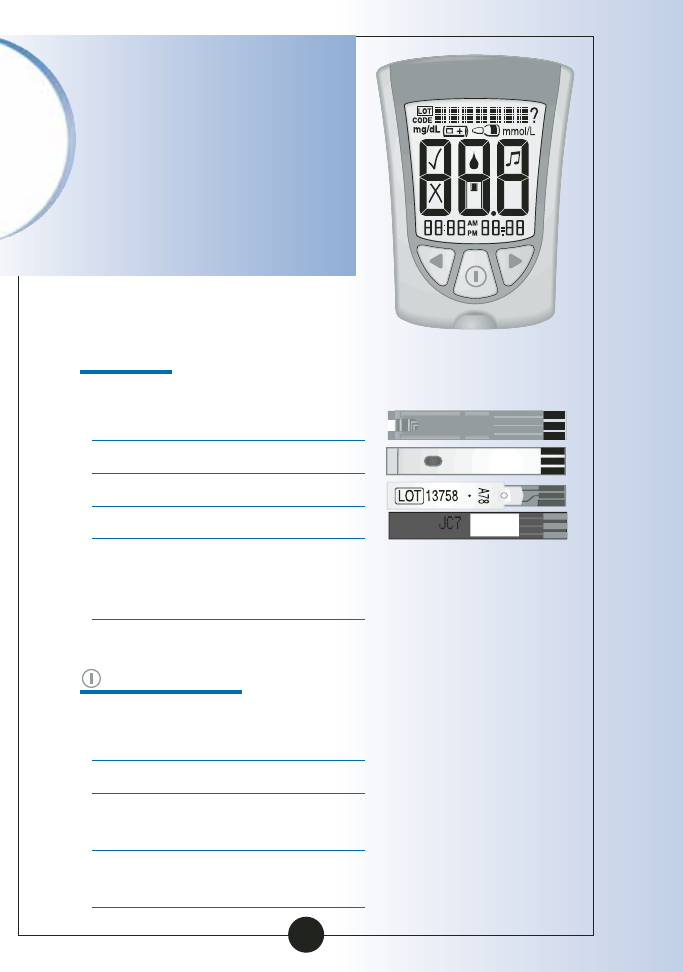
7
Do not use the monitor if the
monitor Display Check does
not exactly match the picture
here (for example, if you see
a "3" instead of an "8").
The monitor may show an
incorrect result when you use
it. Please call Customer Care
for assistance.
Strip Port
This is where you insert:
•A blood glucose test strip
•A blood ß-Ketone test strip
•A glucose calibrator
•A ketone calibrator
•Data cable (not included)
for uploading results to
a computer
Mode Button
Use this button to:
•Turn monitor ON and OFF
•Access monitor setup options
•Access and save
monitor settings
•Access previous results
and averages
Important
Information
ART06986-Rev-B-MAN 8/22/05 11:02 AM Page 10
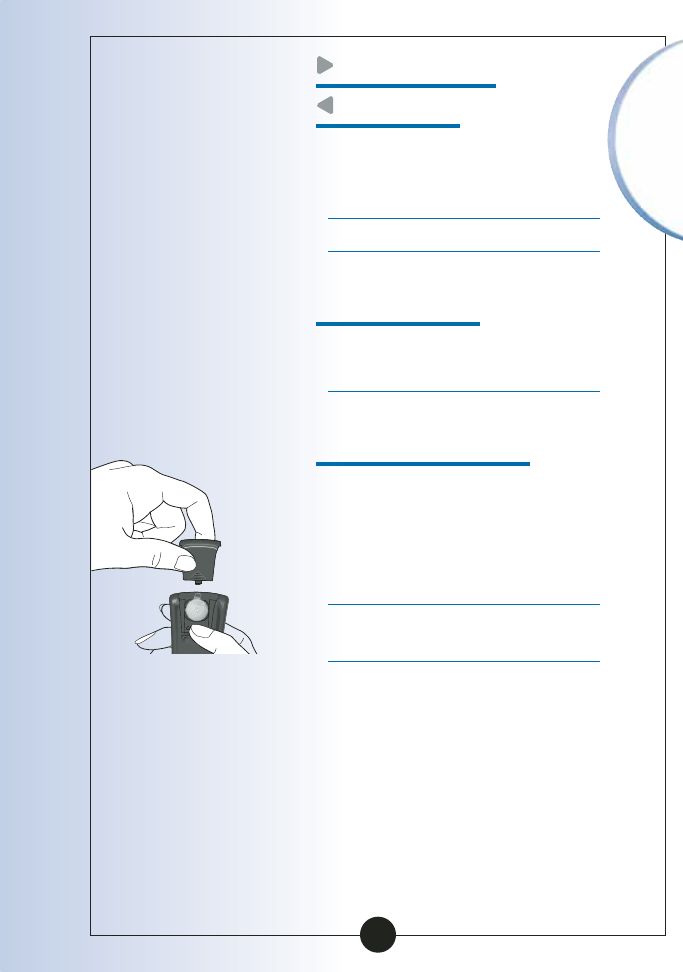
8
Forward Button
Back Button
Use these buttons to:
•Review and select
monitor settings
•Review results and averages
Backlight Button
Use this button to:
•Turn backlight ON and OFF
Battery Compartment
This is where the battery
is installed.
•If your monitor does not turn
on, check that your battery is
installed properly.
•For new battery installation,
see Chapter 10.
Important
Information
ART06986-Rev-B-MAN 8/22/05 11:02 AM Page 11
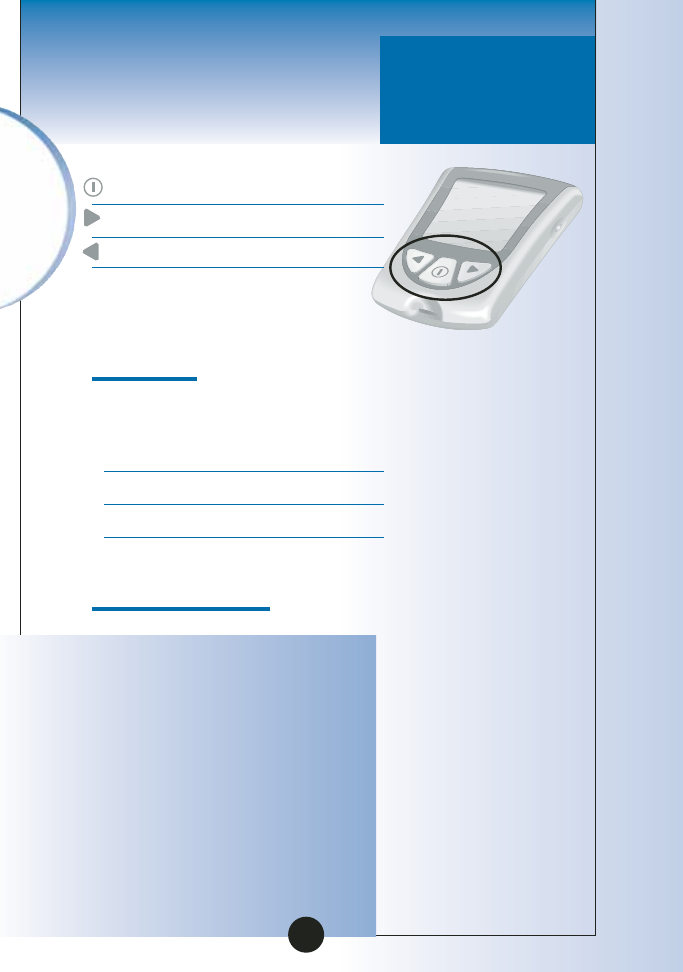
CHAPTER 2
Questions? Call
Customer Care:
1-800-527-3339
▼▼
Setting Up
Your Monitor
Setting Up Your
Precision Xtra Monitor
Buttons to Use
Mode Button
Forward Button
Back Button
Setup Options
Set Beeper
If the beeper is set ON, it will
beep when:
•The calibrator is fully inserted
•The test countdown starts
•The test countdown finishes
Set Time, Set Date
Important: Set the correct
time and date before you use
the monitor for the first time.
This will help you keep records
of when you monitor and will
help you and your healthcare
professional make informed
decisions about your care.
You must set the time and
date to review averages.
9
ART06986-Rev-B-MAN 8/22/05 11:02 AM Page 12
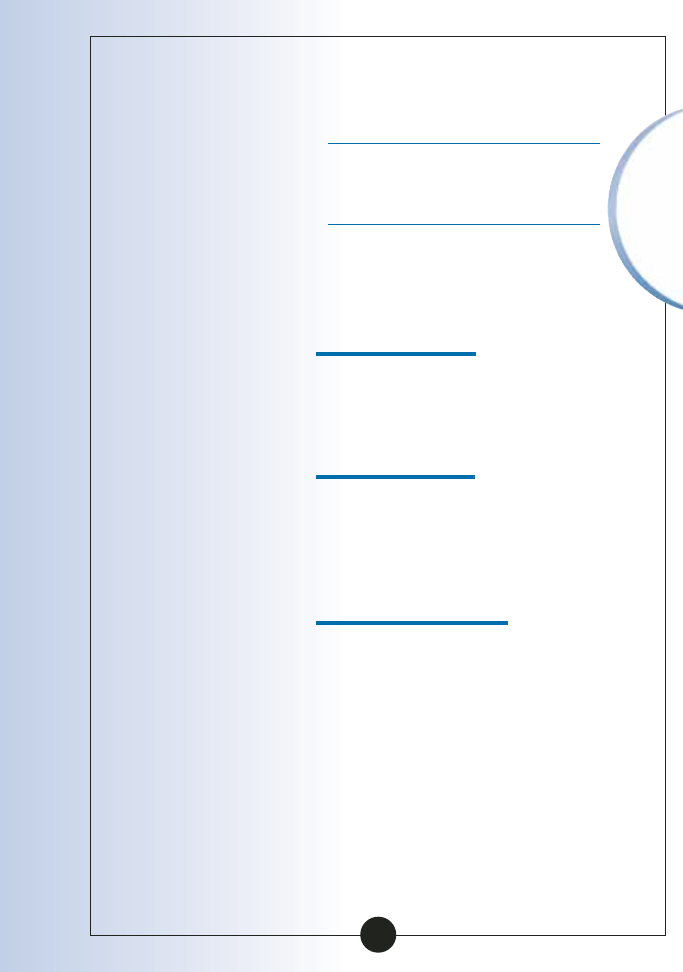
10
You may need to re-set the
time and date:
•After you replace the battery.
•When you travel between
time zones or when the time
zone you are in changes.
In "Set Date", you set the year,
month, and day.
Set Time Format
In "Set Time Format", you
choose how the time shows on
the monitor’s display window.
Set Date Format
In "Set Date Format", you
choose how the month and
day show on the monitor’s
display window.
Measurement Units
Blood glucose measurement
units are factory-set in
mg/dL or mmol/L.
Blood ß-Ketone measurement
units are in mmol/L only.
Setting Up
Your Monitor
ART06986-Rev-B-MAN 8/22/05 11:02 AM Page 13
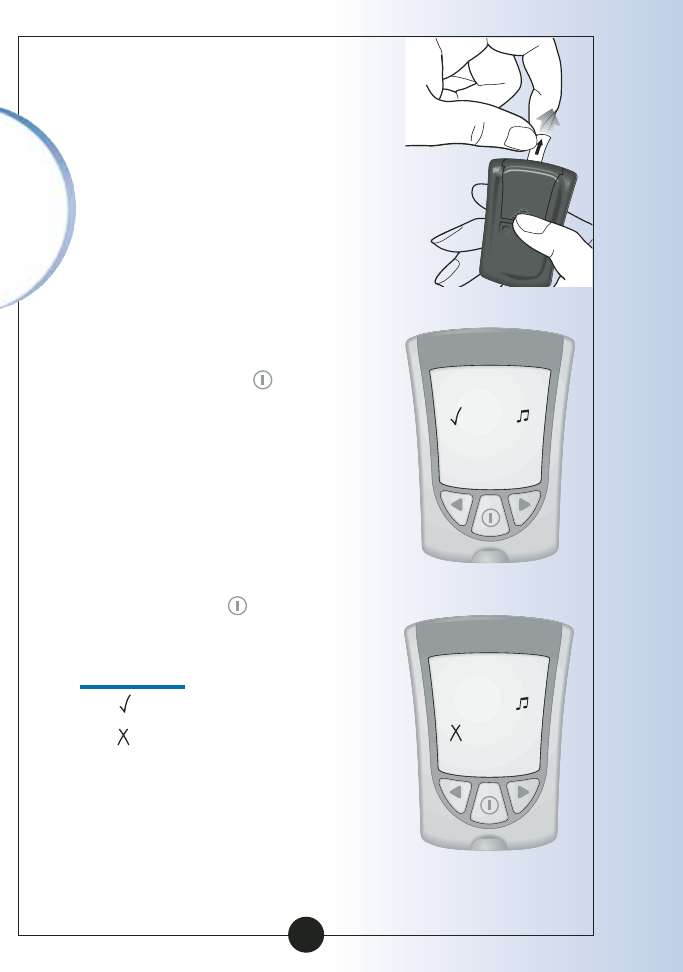
11
How to Set the Beeper,
Date, Time, & View
Measurement Units
To begin, pull the battery tab
out. Your monitor should be
turned OFF.
Before you start, please
note: "Press and Hold" means
that you press the button in for
at least 2 seconds. "Press and
Release" means that you press
the button and let it go quickly.
Press and Hold the button
to turn the monitor off and
save your settings at any time.
The monitor automatically turns
off after 30 seconds of
no action.
If you like the setting that you
see on your monitor and do
not want to change it, Press
and Release the button to
move to the next setup option.
Set Beeper
The means the beeper is ON.
The means the beeper is OFF.
Setting Up
Your Monitor
Beeper ON
Beeper OFF
▼
ART06986-Rev-B-MAN 8/22/05 11:02 AM Page 14
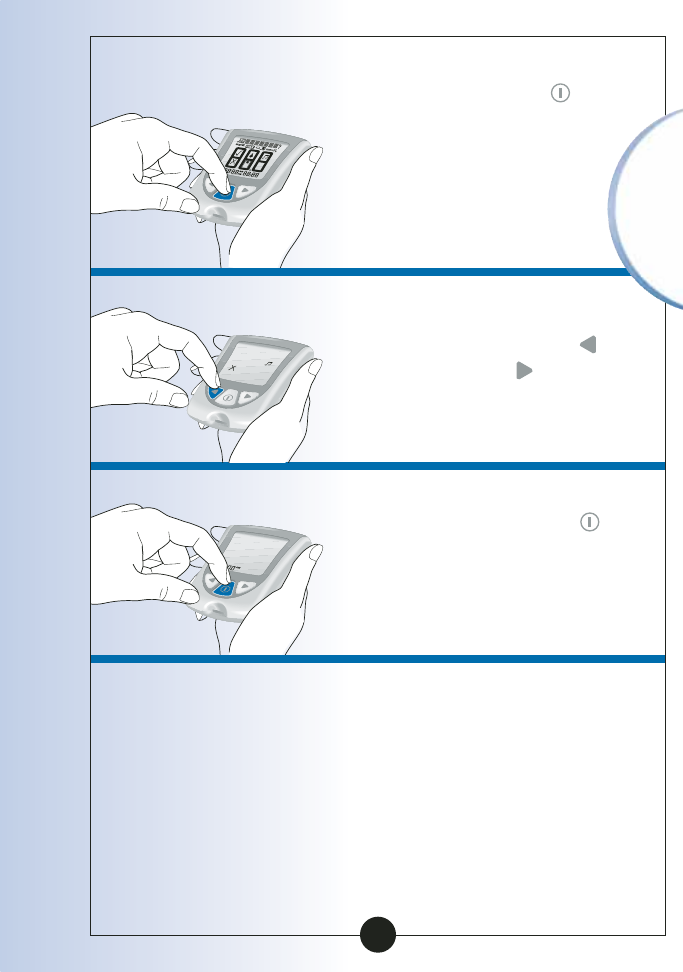
1To turn your monitor ON,
Press and Hold the button.
The beeper ON message
shows on the display
window. The musical
notes flash on and off,
and the monitor beeps.
2To change the beeper setting,
Press and Release the
button or the button
once.
3Press and Release the
button to save the beeper
setting and to move to Set
Time (Hour).
12
Setting Up
Your Monitor
ART06986-Rev-B-MAN 8/22/05 11:02 AM Page 15
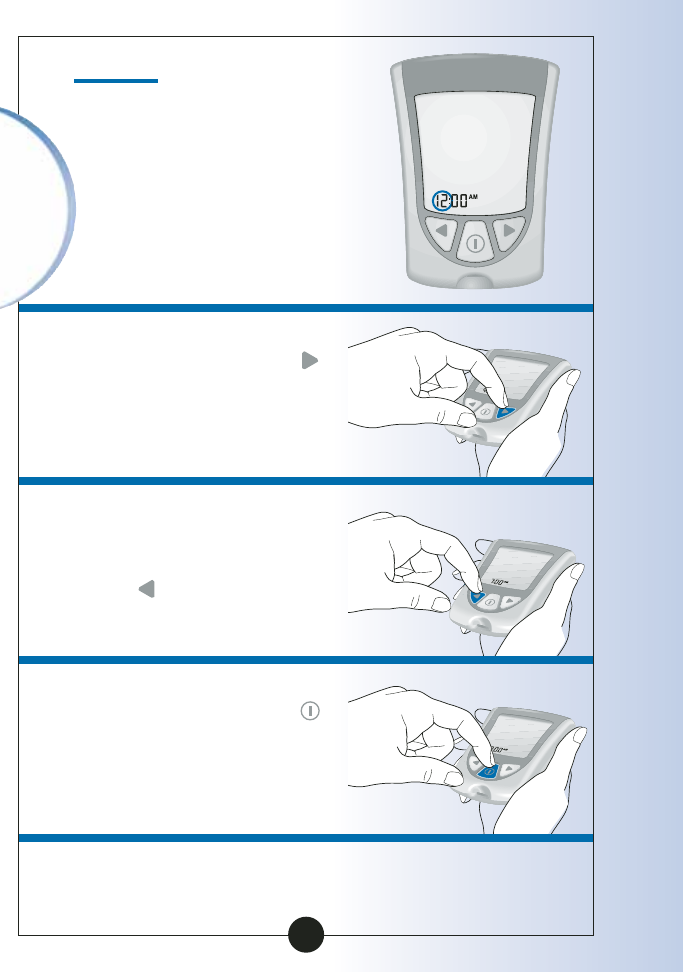
Set Time
Hour:
The Hour flashes on and off.
1Press and Release the
button to move the
hour forward.
2If you go past the correct
hour, Press and Release
the button to move
the hour back.
3Press and Release the
button to save the
hour and to move to
Set Minutes.
Setting Up
Your Monitor
13
ART06986-Rev-B-MAN 8/22/05 11:02 AM Page 16

Minutes:
The Minutes flash on
and off.
1Press and Release the
button to move the
minutes forward.
2If you go past the correct
minute, Press and Release
the button to move the
minutes back.
3Press and Release the
button to save the minutes
and to move to Set Date.
14
Setting Up
Your Monitor
ART06986-Rev-B-MAN 8/22/05 11:02 AM Page 17
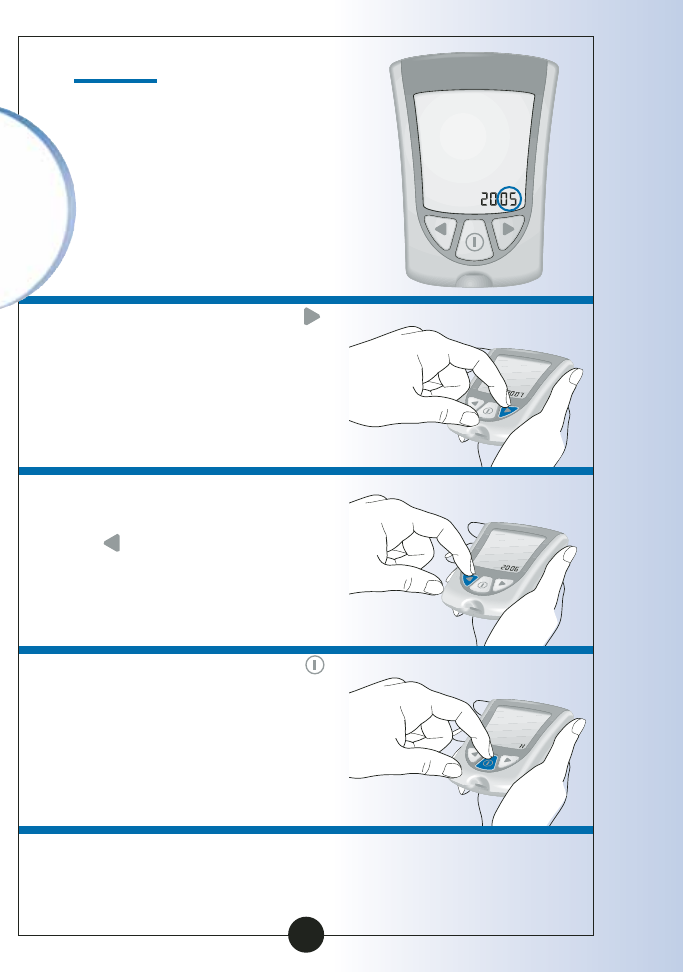
Set Date
Year:
The Year flashes on and off.
1Press and Release the
button to move the
year forward.
2If you go past the correct
year, Press and Release the
button to move the
year back.
3Press and Release the
button to save the year
and to move to Set Month.
Setting Up
Your Monitor
15
ART06986-Rev-B-MAN 8/22/05 11:02 AM Page 18

Month:
The Month flashes on
and off.
1Press and Release the
button to move the
month forward.
2If you go past the correct
month, Press and Release
the button to move the
month back.
3Press and Release the
button to save the month
and to move to Set Day.
Setting Up
Your Monitor
16
ART06986-Rev-B-MAN 8/22/05 11:02 AM Page 19
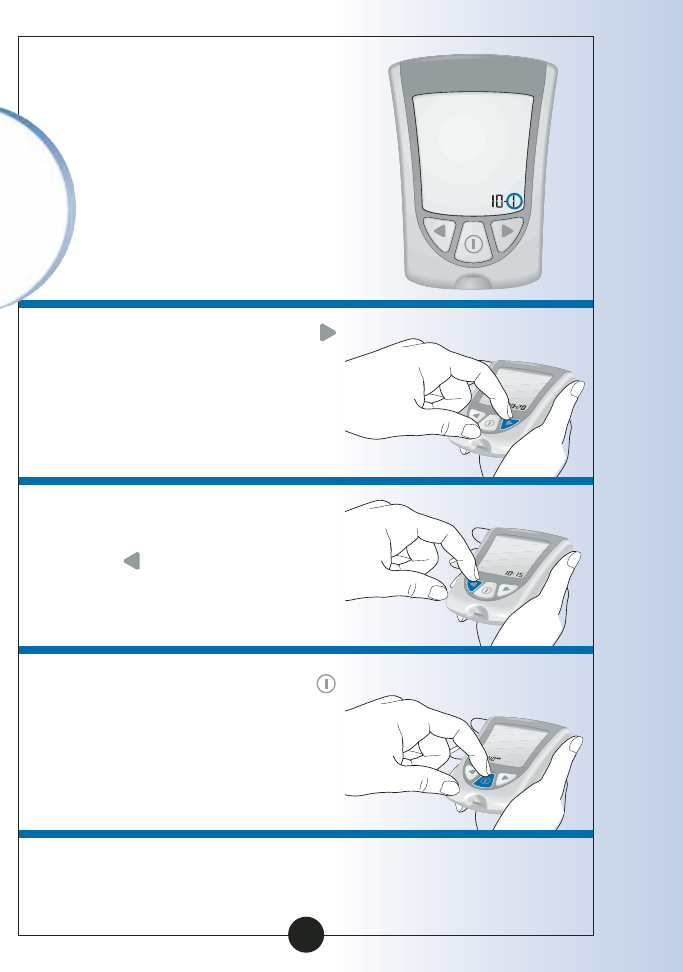
Day:
The Day flashes on and off.
1Press and Release the
button to move the
day forward.
2If you go past the correct
day, Press and Release the
button to move the
day back.
3Press and Release the
button to save the day
and to move to Set
Time Format.
17
Setting Up
Your Monitor
ART06986-Rev-B-MAN 8/22/05 11:02 AM Page 20
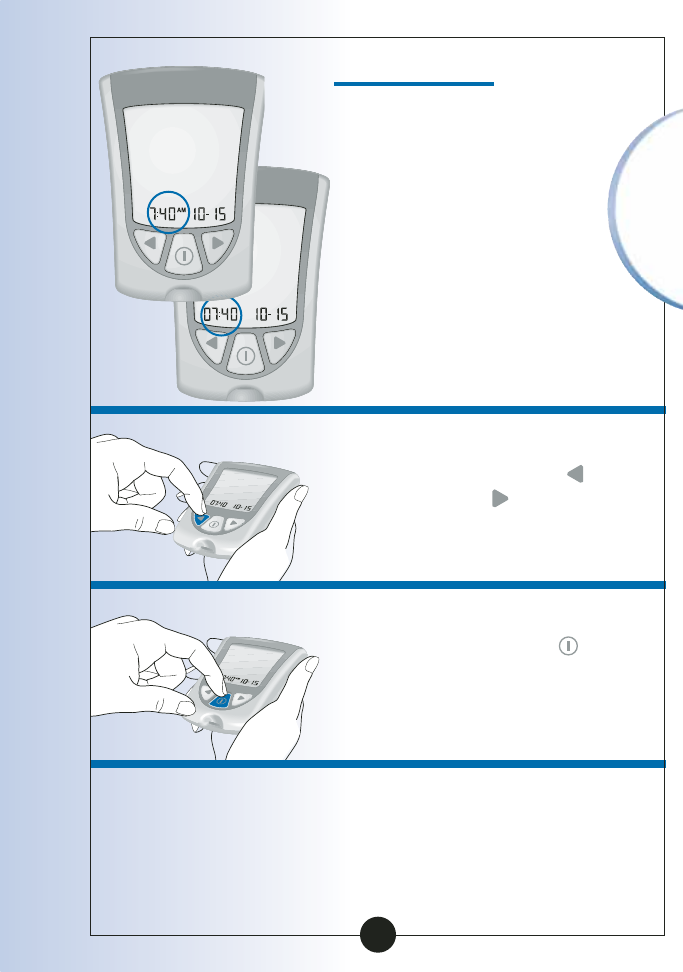
Choice #1
Choice
#2
Set Time Format
You have two choices:
Choice #1: For the 12-hour
format, AM or PM shows.
Choice #2: For the 24-hour
format, AM or PM does
not show.
1To change the Time Format,
Press and Release the
button or the button
once.
2Press and Release the
button to save the Time
Format and to move to Set
Date Format.
Setting Up
Your Monitor
18
ART06986-Rev-B-MAN 8/22/05 11:02 AM Page 21
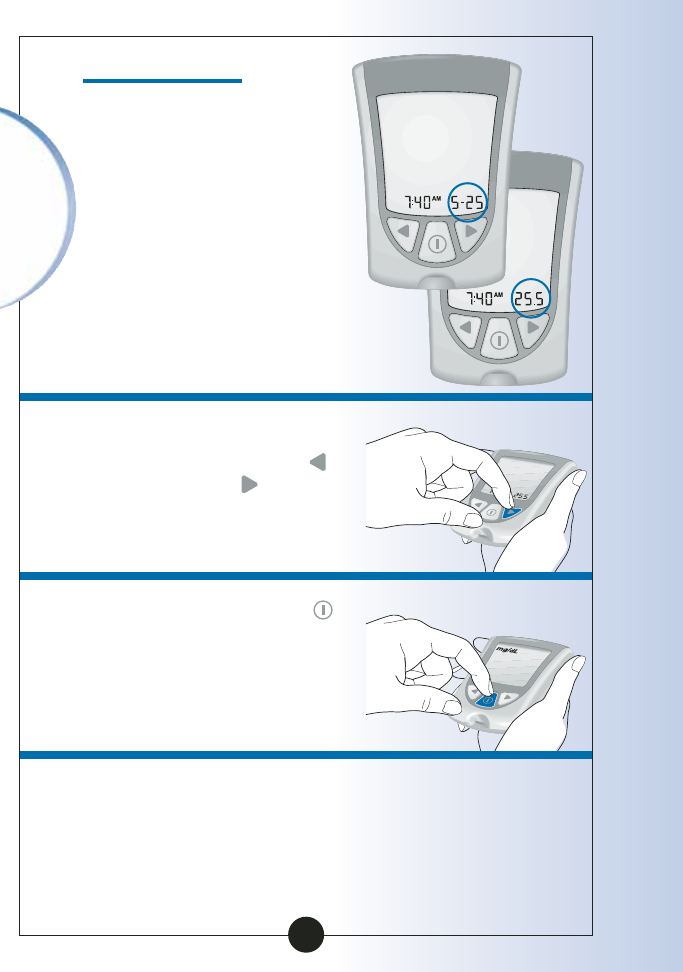
Set Date Format
You have two choices:
Choice #1: For the month-
day format, "-" shows with
the date.
Example:
"May 25" shows as "5-25".
Choice #2: For the day.month
format, "•" shows with
the date.
Example:
"25 May" shows as "25.5".
1To change the Date Format,
Press and Release the
button or the
button once.
2Press and Release the
button to save the Date
Format and to move to
Measurement Units.
Setting Up
Your Monitor
19
ART06986-Rev-B-MAN 8/22/05 11:02 AM Page 22
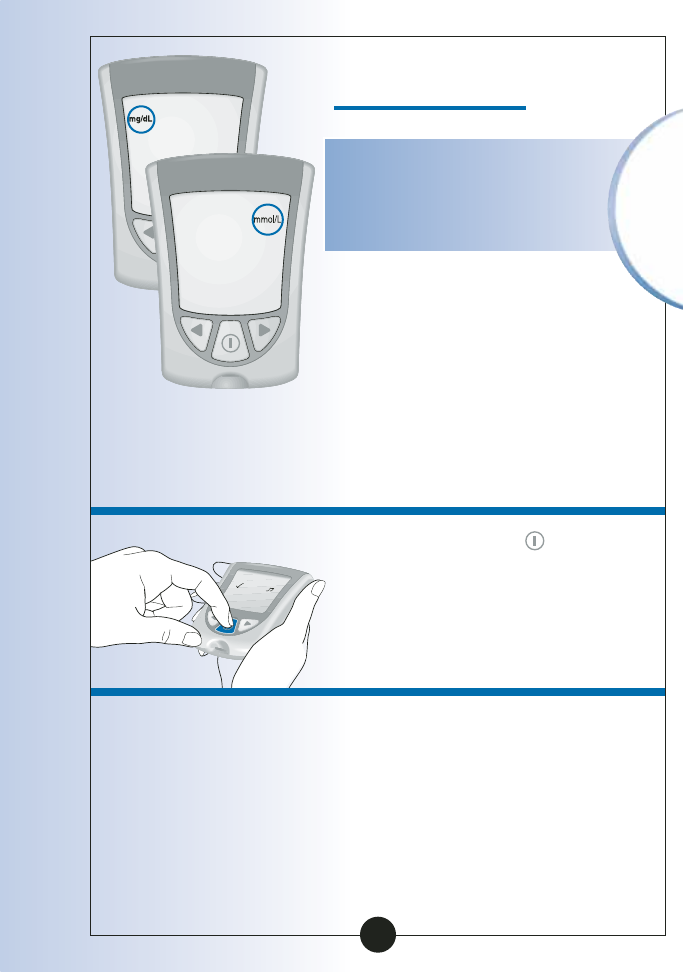
Blood Glucose
Measurement Units
Consult your healthcare
professional if you have
any questions about blood
glucose measurement units.
This screen shows the blood
glucose measurement units
(mg/dL or mmol/L).
Press and release the button
to return to Set Beeper.
Setting Up
Your Monitor
20
ART06986-Rev-B-MAN 8/22/05 11:02 AM Page 23
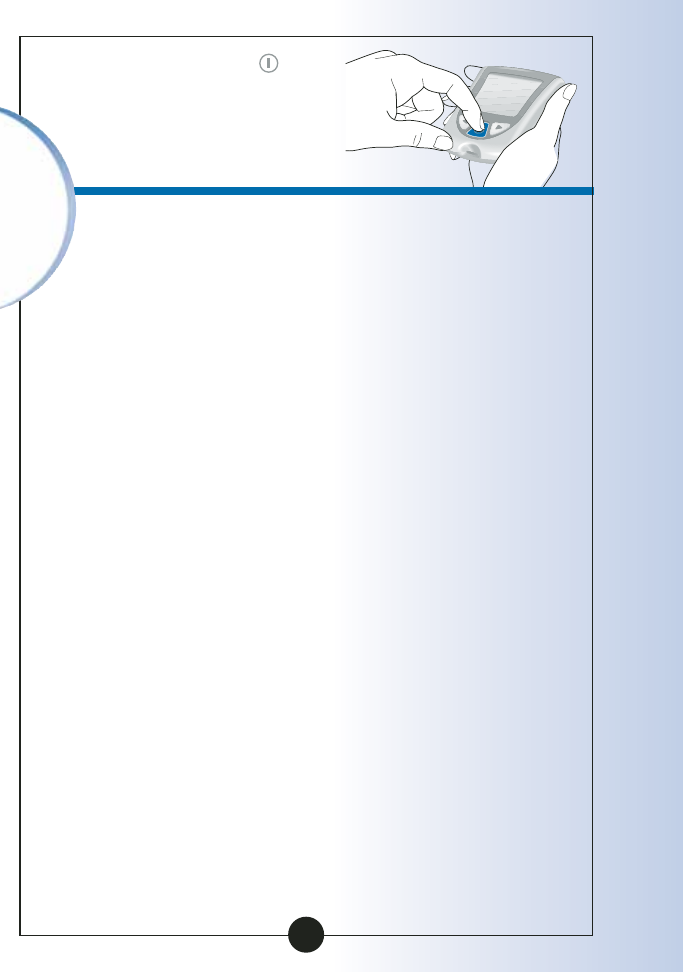
Press and Hold the
button to turn your
monitor off.
You have successfully set
up your monitor.
Setting Up
Your Monitor
21
ART06986-Rev-B-MAN 8/22/05 11:02 AM Page 24
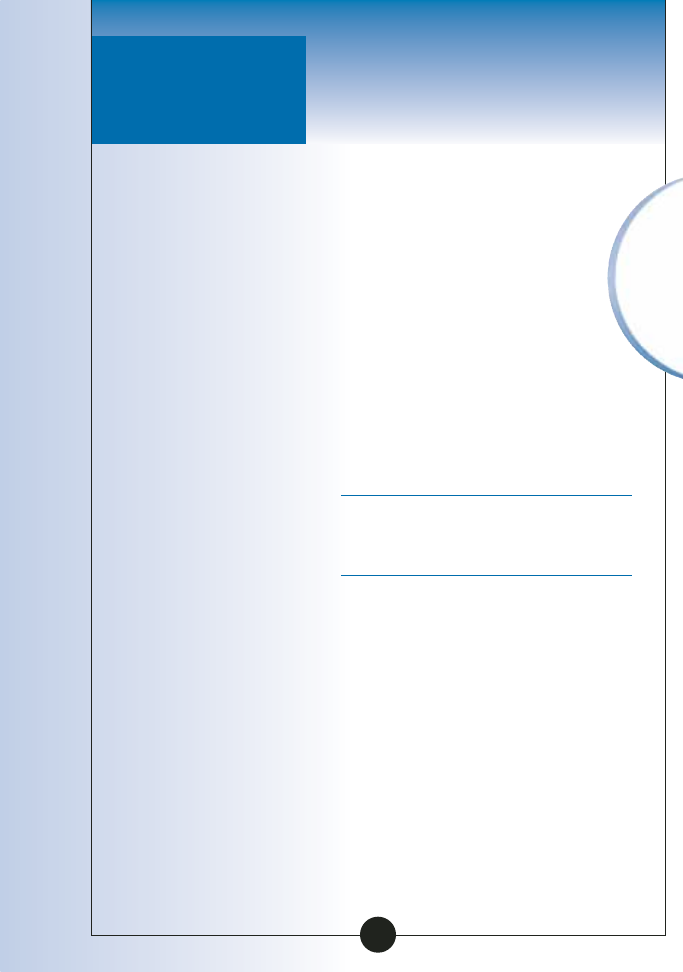
Questions? Call
Customer Care:
1-800-527-3339
CHAPTER 3
Questions? Call
Customer Care:
1-800-527-3339
Calibrating Your
Precision Xtra Monitor
Why Calibrate
Your Monitor?
Your Precision Xtra monitor
must be calibrated so that it
can recognize the test strip
you are using. Calibration
ensures that your results
are accurate.
When to Calibrate
Your Monitor
• When you use the monitor for
the first time.
• EACH time you open and use a
new box of blood glucose or
blood ß-Ketone test strips.
▼
Calibrating
Your Monitor
22
▼
ART06986-Rev-B-MAN 8/22/05 11:02 AM Page 25
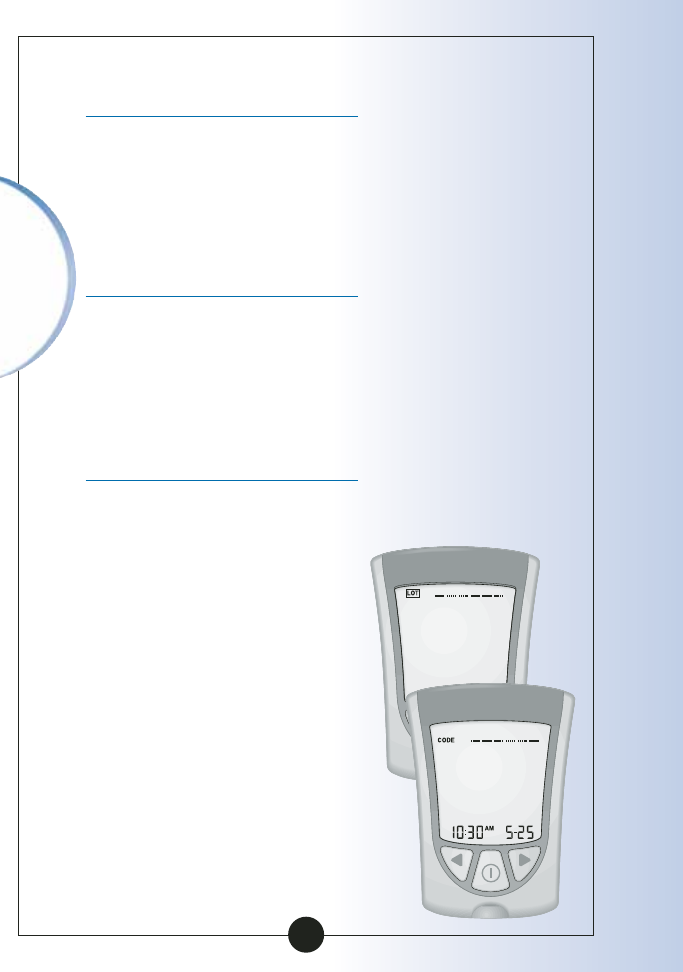
23
What You Will Need
• Precision Xtra monitor
• For glucose calibration:
Blood glucose test strip
Blood glucose test strip
instructions for use
Blood glucose test
strip calibrator
• For ß-Ketone calibration:
Blood ß-Ketone test strip
Blood ß-Ketone test strip
instructions for use
Blood ß-Ketone test
strip calibrator
How to Calibrate
Your Monitor
When you insert a test strip for
the first time, the display
window shows:
This means the monitor is not
calibrated for blood
glucose monitoring.
This means the monitor is not
calibrated for blood
ß-Ketone monitoring.
Calibrating
Your Monitor ▼▼
➡
➡
ART06986-Rev-B-MAN 8/22/05 11:02 AM Page 26
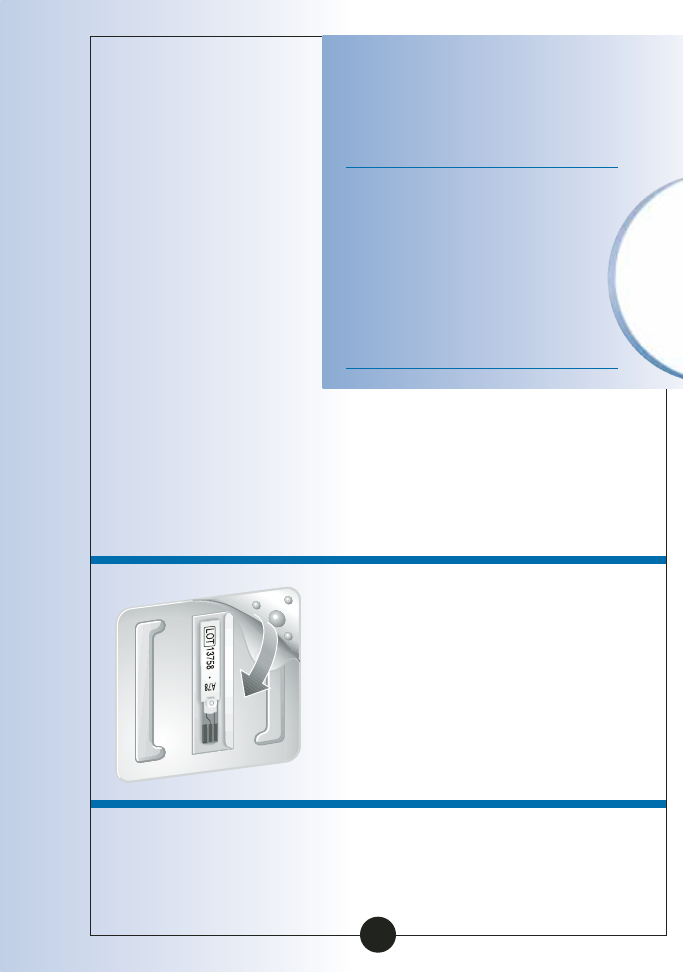
24
IMPORTANT:
•Use only the calibrator that is
packaged in the box of test
strips you are using.
•Do not use test strips that
have expired. Check the
expiration date on the test
strip foil packet and test strip
box. If only the year and
month are shown, the
expiration date is the last
day of the month.
1Remove the glucose or
ß-Ketone calibrator package
from the new box of
test strips.
2Open the calibrator
package. Find the three
raised bumps on the
calibrator package. Peel the
clear cover away from the
three raised bumps.
4. the the . it in until it stops.
Calibrating
Your Monitor
ART06986-Rev-B-MAN 8/22/05 11:02 AM Page 27
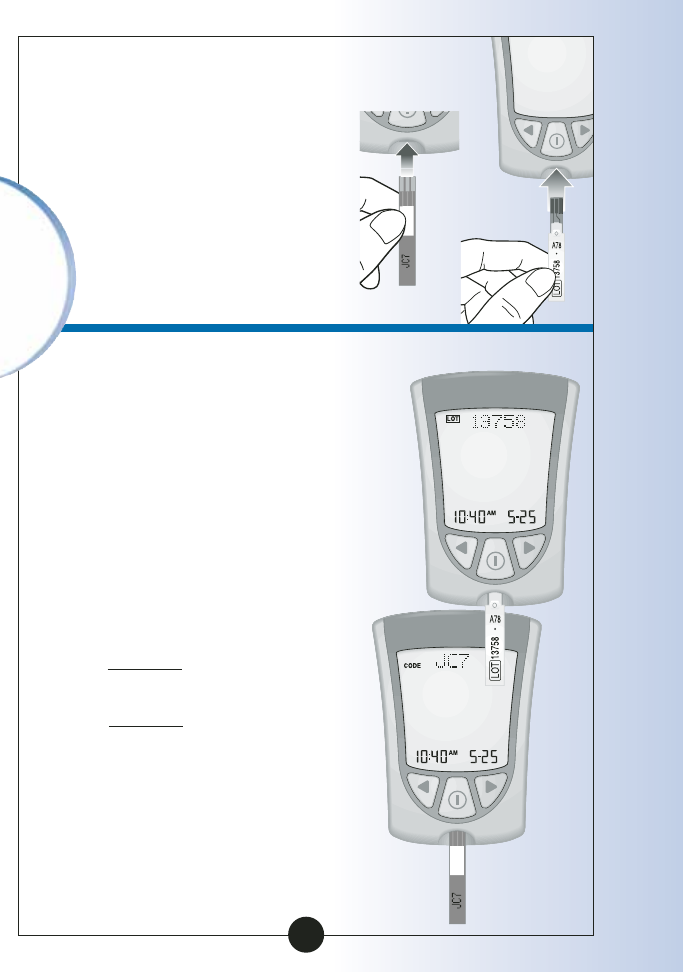
3Hold the calibrator with the
LOT number (glucose) or
calibration CODE
(ß-Ketone) facing you.
4Insert the calibrator into
the strip port. Push it in
until it stops.
The Display Check shows
on the display window,
followed by the time,
month, and day.
Next, the LOT number
(glucose) or calibration
CODE (ß-Ketone) shows
on the display window.
a. Example of glucose LOT
number: LOT 13758
b. Example of ß-Ketone
calibration CODE: CODE JC7
Then you hear the beeper, if
the beeper is ON.
Glucose
ß-Ketone
Calibrating
Your Monitor
25
ART06986-Rev-B-MAN 8/22/05 11:02 AM Page 28
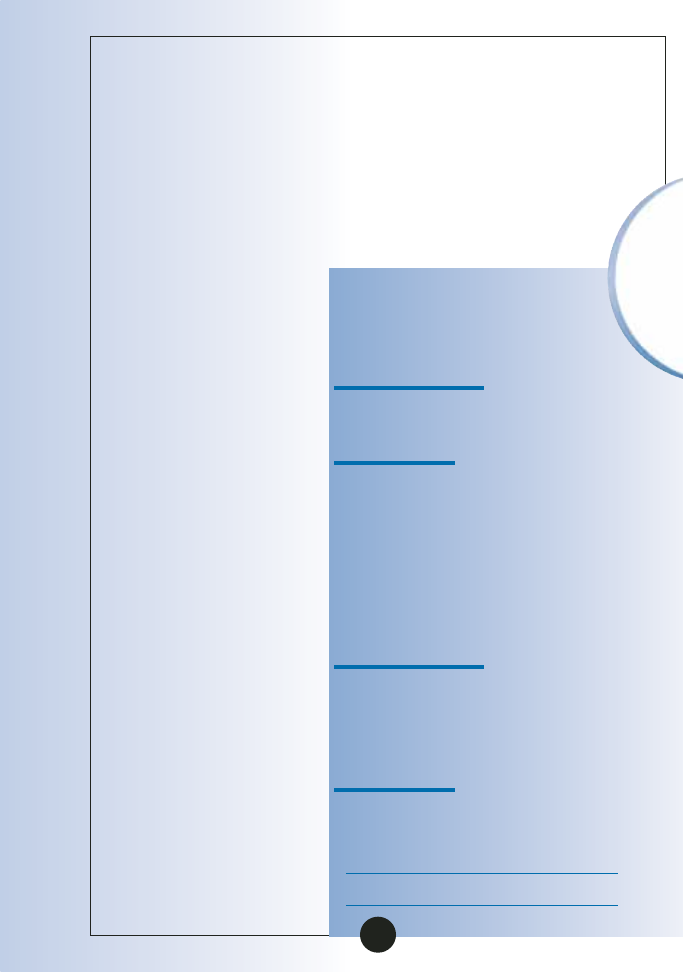
5Check that the LOT number
or calibration CODE on all
these items matches:
✓ Display window
✓ Test strip calibrator
✓ Test strip instructions for use
✓ Test strip foil packet
When the LOT number or
calibration CODE on all
these items matches:
What It Means:
Calibration is complete.
What to Do:
You may now monitor
your blood glucose or
blood ß-Ketone.
When the LOT number or
calibration CODE on all these
items DOES NOT match:
What It Means:
Your monitor may not be
calibrated for the box of test
strips you are using.
What to Do:
•Check that you are using the
calibrator that came in the box
of test strips you are using.
•Try to calibrate again.
26
Calibrating
Your Monitor
ART06986-Rev-B-MAN 8/22/05 11:02 AM Page 29
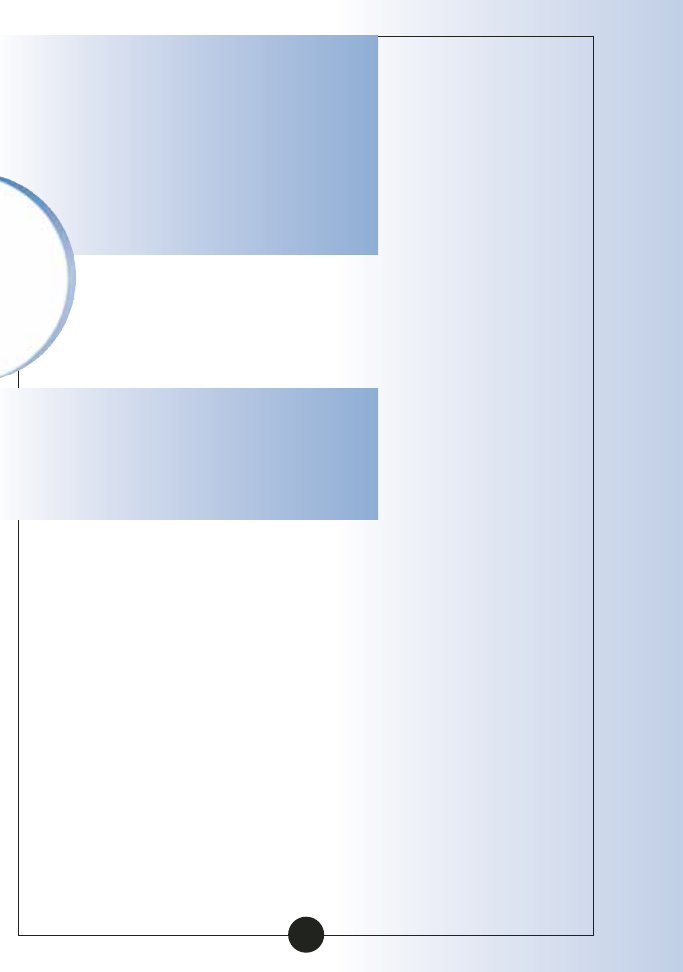
27
Calibrating
Your Monitor
IMPORTANT: If the LOT
number or calibration CODE
still does not match, contact
Customer Care. Do not
attempt to monitor your blood
glucose or blood ß-Ketone.
Your monitor may show an
incorrect result.
6Remove the calibrator from
the monitor and store it in
your monitor’s carrying case.
IMPORTANT: Do not throw
the calibrator away until you
have used all of the test strips
in the box.
If you have any trouble
calibrating your system, please
contact Customer Care.
ART06986-Rev-B-MAN 8/22/05 11:02 AM Page 30
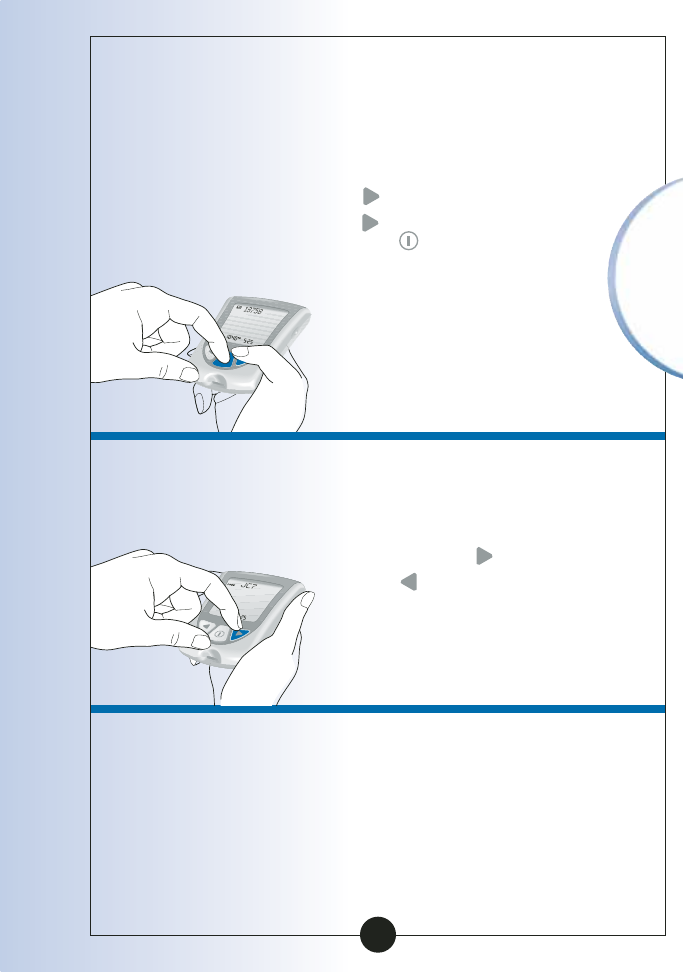
How to Recall the
LOT Number or
Calibration CODE
1To recall the glucose LOT
number, Press and Hold the
button. While holding the
button, Press and Hold
the button.
The Display Check shows on
the display window, then the
glucose LOT number shows
with the time, month, and
day of the most recent
glucose calibration.
2After the glucose LOT
number is displayed, you
can recall the ß-Ketone
calibration CODE. Press and
Release the button or
the button.
The ß-Ketone calibration CODE
shows with the time, month,
and day of the most recent
ß-Ketone calibration.
▼
Calibrating
Your Monitor
28
ART06986-Rev-B-MAN 8/22/05 11:02 AM Page 31
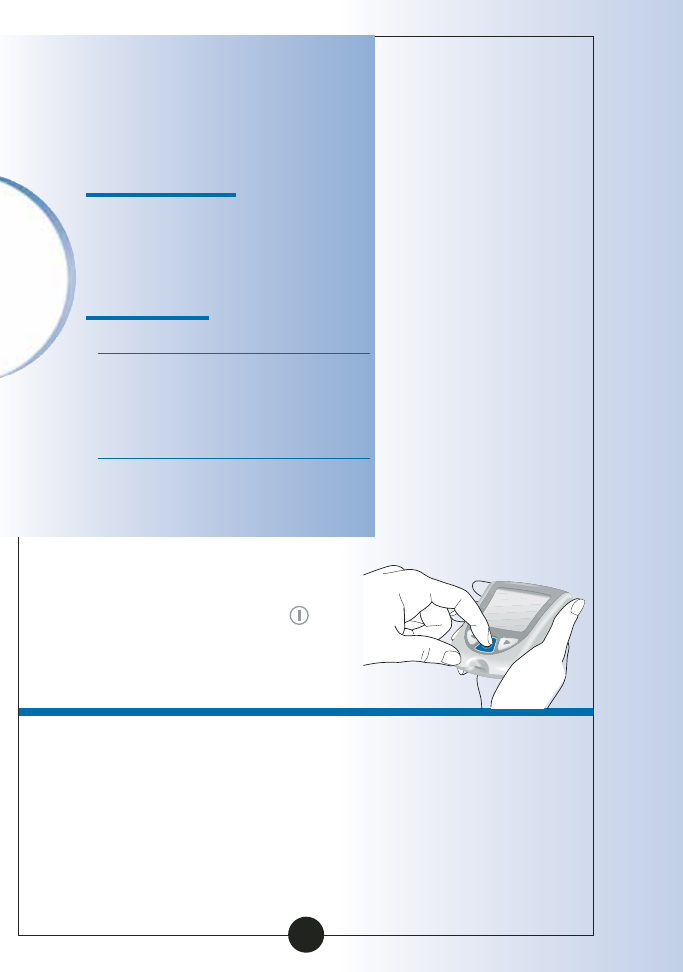
29
Calibrating
Your Monitor
Note: If the LOT number or
calibration CODE that shows
on your monitor’s display
window is not correct:
What It Means:
Your monitor may not be
calibrated for the box of test
strips you are using.
What To Do:
•Re-calibrate your monitor.
•Check that you are using
the calibrator that came in
the box of test strips you
are using.
Remember, improper
calibration will cause
incorrect results.
3Press and Hold the
button to turn your
monitor off.
ART06986-Rev-B-MAN 8/22/05 11:02 AM Page 32
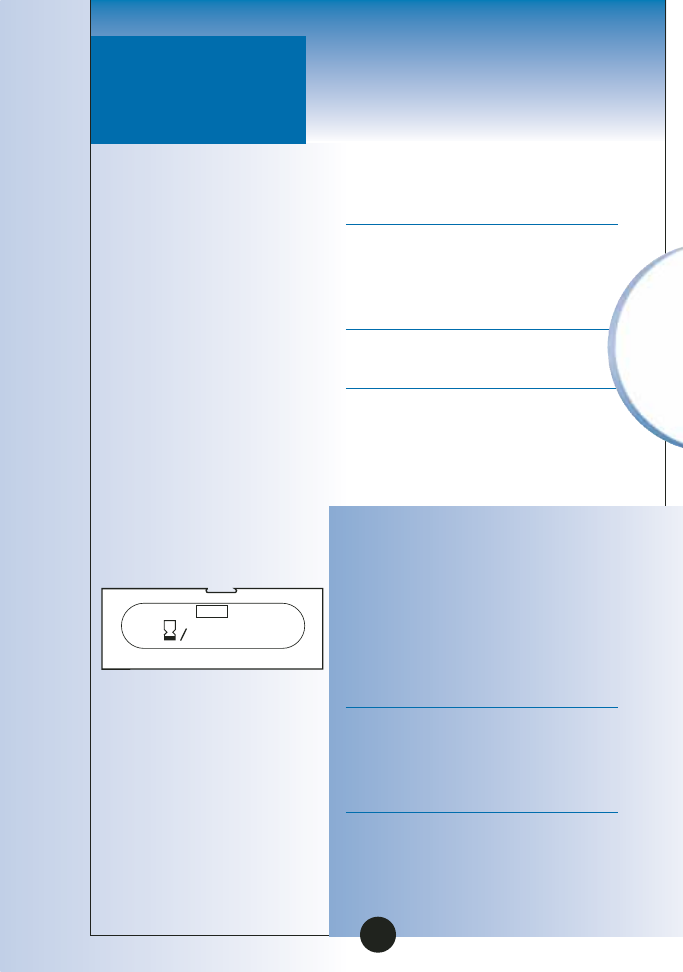
CHAPTER 4
Questions? Call
Customer Care:
1-800-527-3339
L O T 13758
E X P 2006/03
C5
▼▼
Example:
Expiration date
March 31, 2006
Monitoring Your
Blood Glucose
What You Will Need
•Blood glucose test strip with
its instructions for use
•Precision Xtra monitor
calibrated to match the LOT
number of the blood glucose
test strip you are using
•Lancing device and a new,
sterile lancet
Important Information
about Monitoring Your
Blood Glucose
•Do not use out-of-date test
strips. Check the expiration
date printed on the test strip
box and on each test strip foil
packet. If only the month and
year are printed on the test
strip, then the expiration date
is the last day of that month.
•For more detailed information
about your test strip, please
read its instructions for use
before monitoring.
•Use the test strip
immediately when you
take it out of its foil packet.
30
Monitoring
Blood Glucose
ART06986-Rev-B-MAN 8/22/05 11:02 AM Page 33
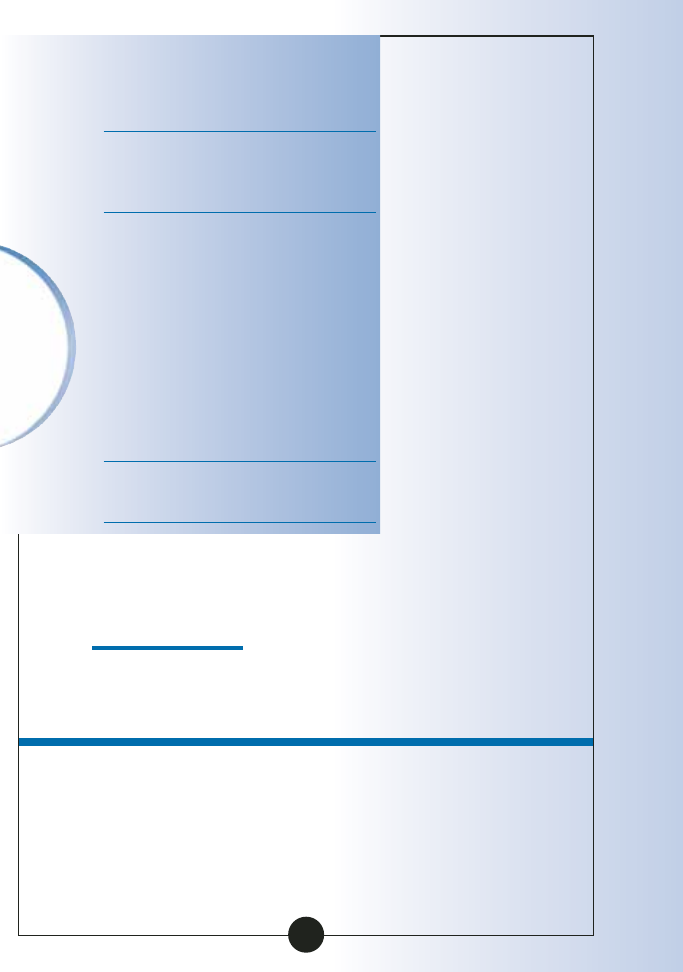
Monitoring
Blood Glucose
•Do not use a wet, bent,
scratched, or damaged
test strip.
•Do not use the test strip if its
foil packet has a puncture or
tear in it.
•Before you monitor your
blood glucose or blood
ß-Ketone, allow your monitor
and test strip to reach the
recommended operating
range of the test strip. The
test strip operating range is in
the “Limitations of Procedure”
section of your blood glucose
test strip instructions for use.
•Read the lancing
device instructions for use.
How to Monitor Your
Blood Glucose
Getting Started
1Prepare your lancing device.
31
▼
ART06986-Rev-B-MAN 8/22/05 11:02 AM Page 34
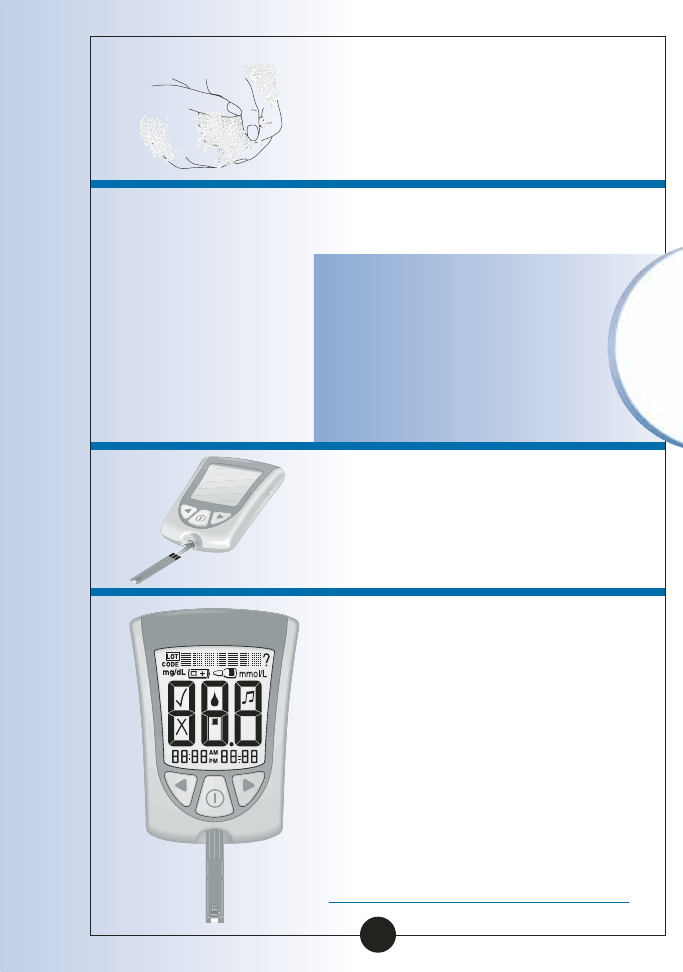
2Wash your hands using
warm soapy water and
dry them completely.
3Remove the test strip from its
foil packet.
Note: For pictures that show
how to open the blood
glucose test strip foil packet,
please see the information
card in the box of blood
glucose test strips.
4Insert the three black lines at
the end of the test strip into
the strip port.
5Push the test strip in until
it stops.
The monitor turns on automatically.
These items show on the display
window, one after the other:
•Display Check – Remember to
make sure that all items in the
picture here show on the display
window. (See Chapter 1 for
more information about the
Display Check.)
Monitoring
Blood Glucose
32
ART06986-Rev-B-MAN 8/22/05 11:02 AM Page 35
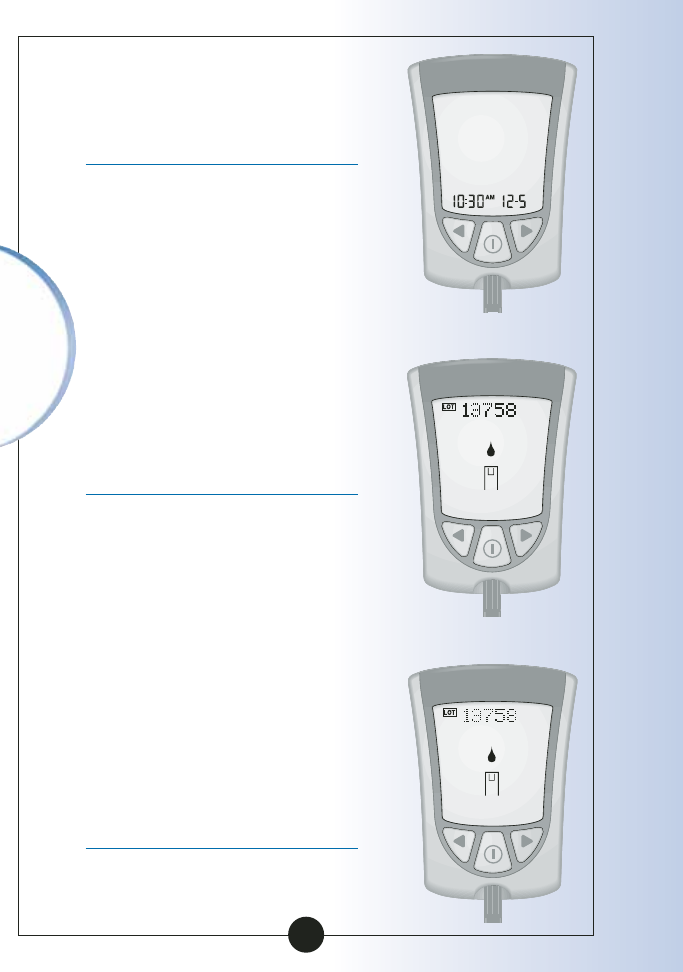
33
•Time, month, and day (if set)
If date and time are not
set, dashes will show instead
of numbers.
•LOT number for the box of
blood glucose test strips
you are using.
•Apply Blood message, which
tells you that the monitor is
ready for you to apply blood
to the blood glucose test strip.
Monitoring
Blood Glucose
ART06986-Rev-B-MAN 8/22/05 11:02 AM Page 36
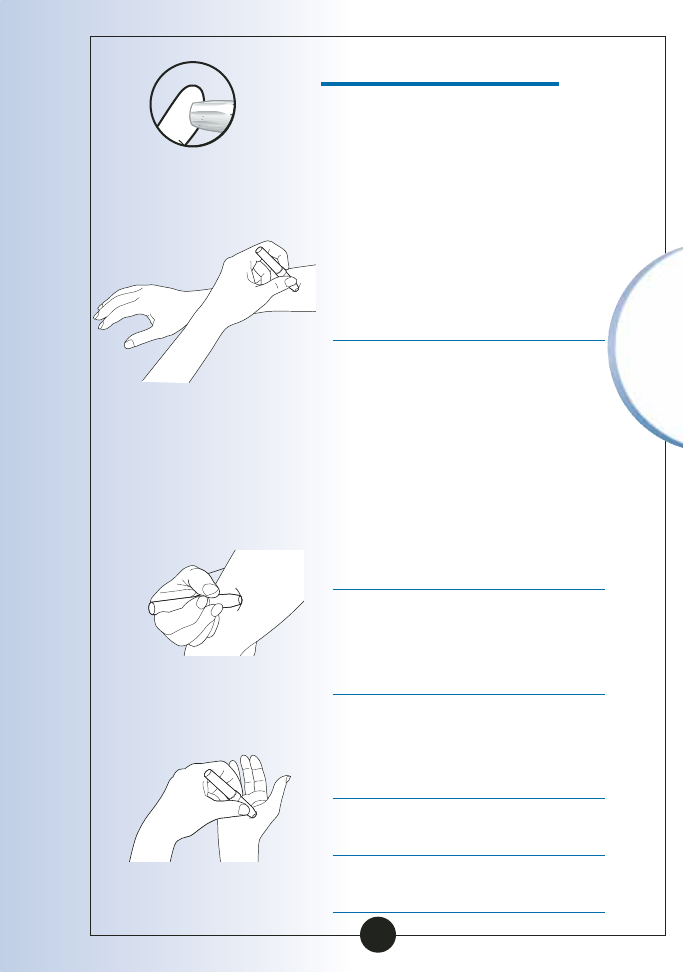
Monitoring
Blood Glucose
Obtaining A Blood Drop
Use your lancing device to
obtain a blood drop.
Recommendations for
Obtaining a Blood Drop
•To obtain a sample from an
alternative site (forearm, upper
arm, or base of the thumb),
use an appropriate alternative
site lancing device.
•Before you obtain a blood
sample from the fingertip,
forearm, upper arm, or base
of the thumb, make sure the
sample site is clean, dry, and
warm. To warm the sample
site, wash it in warm water,
rub the skin vigorously for a
few seconds, or apply a warm
pad to it.
•Hang your arm down before
pricking your finger or the
base of the thumb to help
blood flow.
•To obtain a blood sample from
the arm, use a fleshy area
away from bone. Avoid areas
where there is a lot of hair.
•Avoid squeezing the
puncture site.
•Apply the blood sample to the
test strip immediately.
Fingertip sampling
Upper arm sampling
Forearm sampling
Base of thumb sampling
34
ART06986-Rev-B-MAN 8/22/05 11:02 AM Page 37
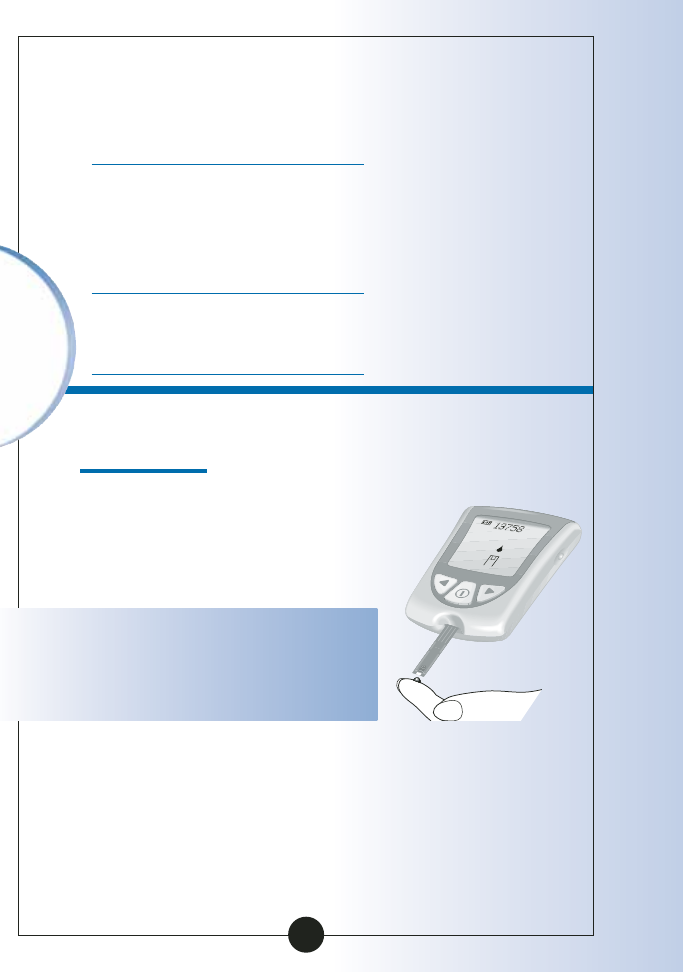
35
Monitoring
Blood Glucose
Lancets and Lancing Device
•Lancets are for one-time use
only. Use a new lancet each
time you monitor.
•Discard your used lancet
properly. Put it in an empty
puncture-resistant container,
such as a plastic milk carton or
detergent bottle.
•Never share your lancing
device or lancet with
another person.
Applying the Blood Drop to
the Test Strip
1Touch the blood drop to the
white area at the end of the
test strip. The blood is
drawn into the test strip.
Note: If the monitor shuts off
before you apply blood to the
test strip, remove the test strip
from the monitor and try again.
ART06986-Rev-B-MAN 8/22/05 11:02 AM Page 38
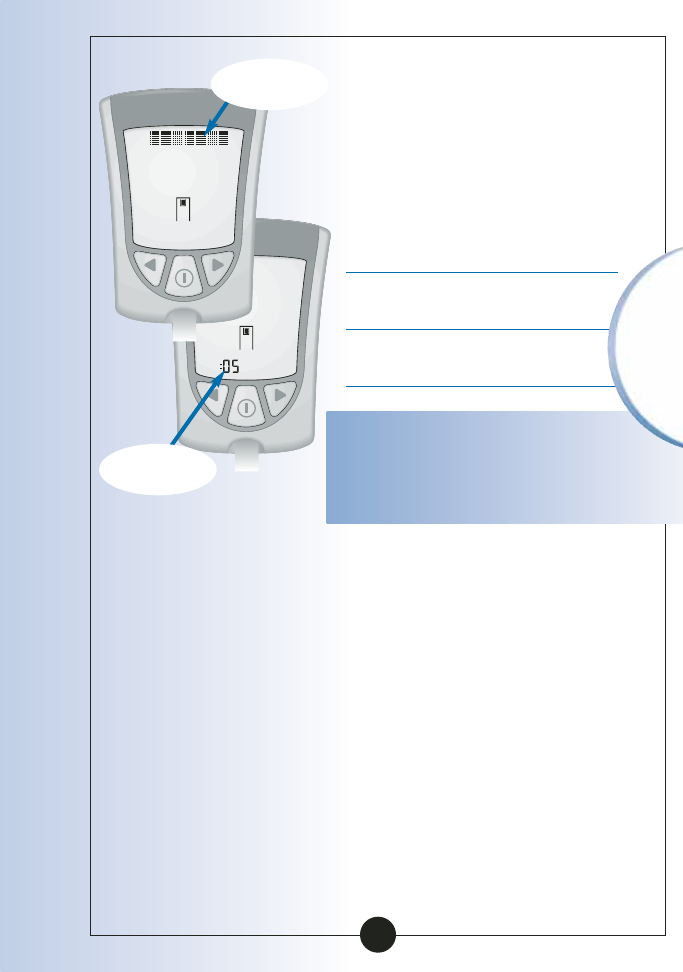
Status bar
Countdown
36
2Continue to touch the blood
drop to the end of the test
strip until the monitor
begins the test. The monitor
begins the test when:
•You hear the beeper, if the
beeper is ON.
•The display window shows
the status bar.
•Then the display window
shows the countdown.
Note: Do not remove the test
strip from the monitor or
disturb the test strip during
the countdown.
Monitoring
Blood Glucose
ART06986-Rev-B-MAN 8/22/05 11:02 AM Page 39
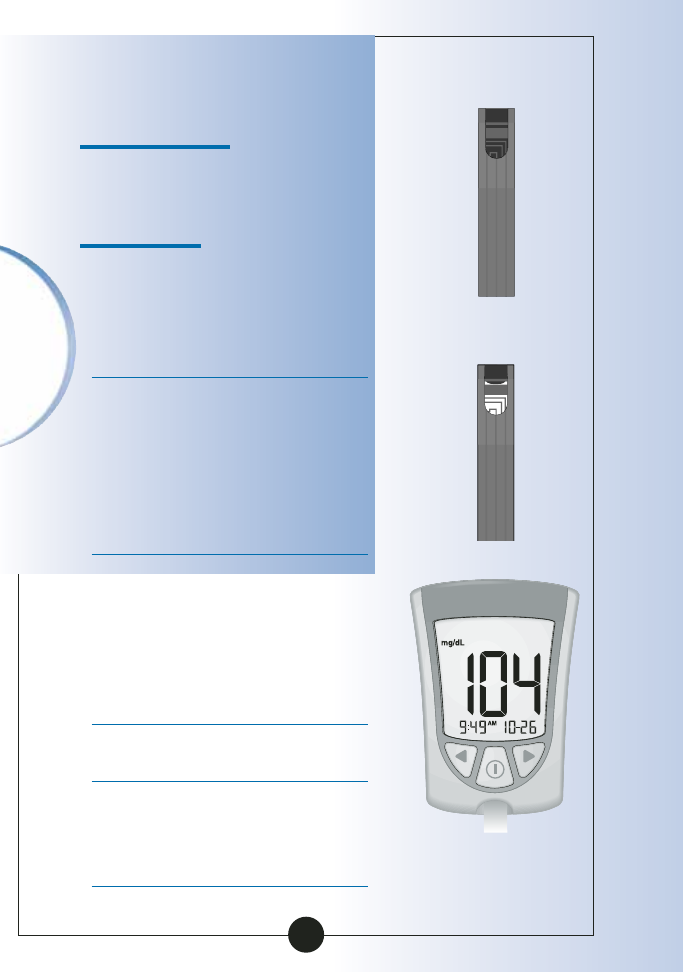
37
Correct
Apply second drop
✔
Important: If the countdown
does not start:
What It Means:
You might not have applied
enough blood to the test strip.
What to Do:
•Apply a second drop of blood
to the test strip. Refer to your
test strip instructions for use
for the number of seconds you
have to apply a second drop.
•If the countdown still does not
start, or if the number of
seconds you have to apply a
second drop have passed,
discard the test strip, turn off
your monitor, and try again
with a new test strip.
3At the end of the
countdown:
•If the beeper is ON, listen for
the beeper.
•The blood glucose result
shows on the display window.
•The result is stored in your
monitor’s memory. You may
also write the result
in your logbook.
Monitoring
Blood Glucose
ART06986-Rev-B-MAN 8/22/05 11:02 AM Page 40
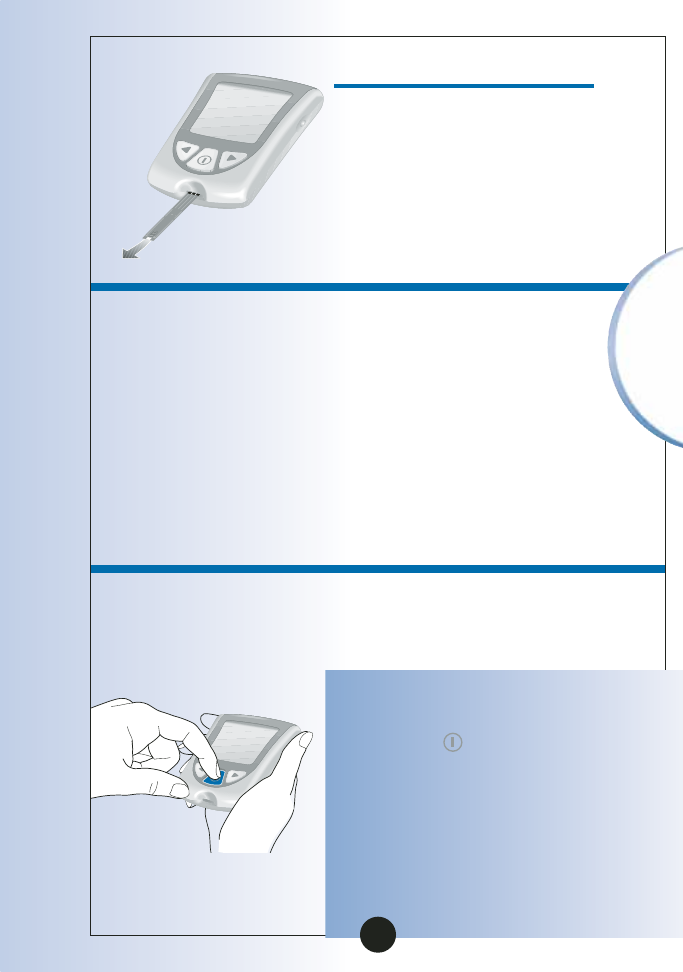
Monitoring
Blood Glucose
Shutting Off Your Monitor
1Removing the test strip from
the strip port turns off the
monitor. You can use the
opened foil packet to
remove and discard your
used test strip.
2Discard the test
strip properly.
Note: You may also turn the
monitor off by Pressing and
Holding the button. If you
do not turn your monitor off or
pull the test strip out, the
monitor shuts off automatically
after 60 seconds.
38
ART06986-Rev-B-MAN 8/22/05 11:02 AM Page 41
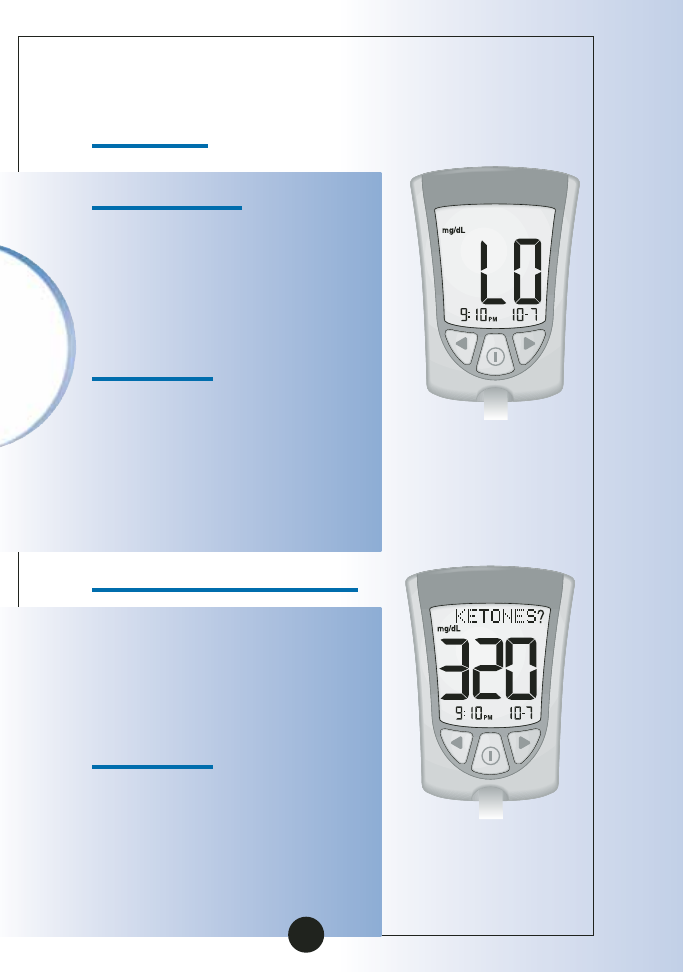
▼
Understanding
Your Result
"LO" Result
What It Means:
Your monitor has determined
that your blood glucose result
is lower than 20 mg/dL (1.1
mmol/L) or there may be a
problem with the test strip.
What to Do:
Monitor your blood glucose
again with a new test strip. If
LO shows on the display
window again, contact your
healthcare professional
immediately.
Result 300 mg/dL or Higher
When your blood glucose result
is 300 mg/dL (16.7 mmol/L) or
higher, KETONES? flashes on
and off on the display window.
What to Do:
If you check your ketones
as part of your diabetes
management program, it
is recommended that you
check your blood ß-Ketone.
Monitoring
Blood Glucose
39
ART06986-Rev-B-MAN 8/22/05 11:02 AM Page 42
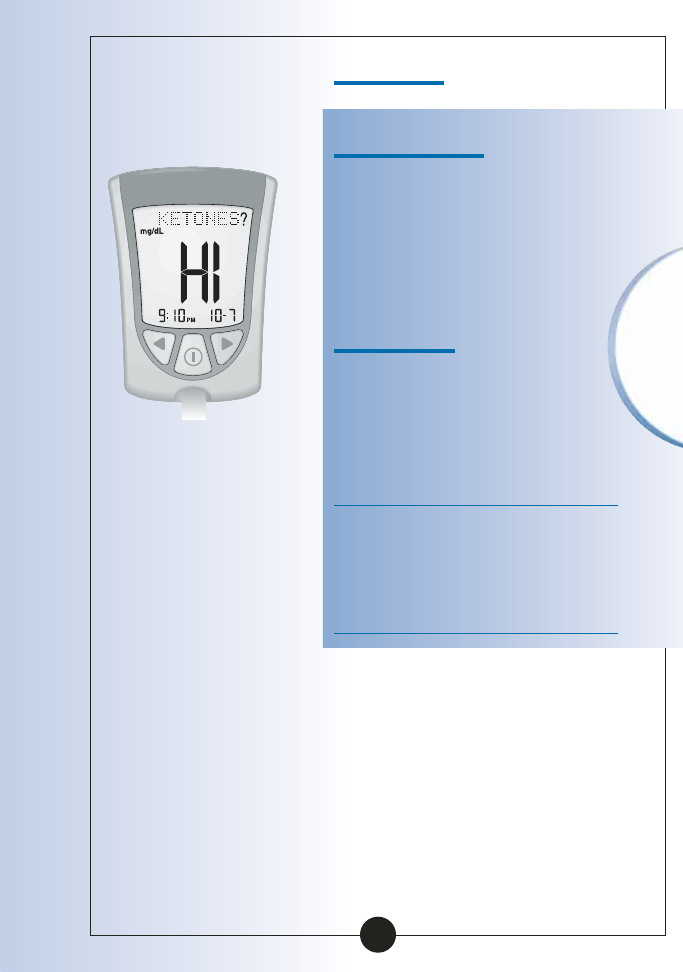
40
"HI" Result
What It Means:
Your monitor has determined
that your blood glucose result
is higher than 500 mg/dL
(27.8 mmol/L) or there may
be a problem with the
test strip.
What to Do:
Monitor your blood glucose
again with a new test strip. If
HI shows on the display
window again, contact your
healthcare professional
immediately.
If you check your ketones
as part of your diabetes
management program, it
is recommended that you
check your blood ß-Ketone.
Monitoring
Blood Glucose
ART06986-Rev-B-MAN 8/22/05 11:02 AM Page 43
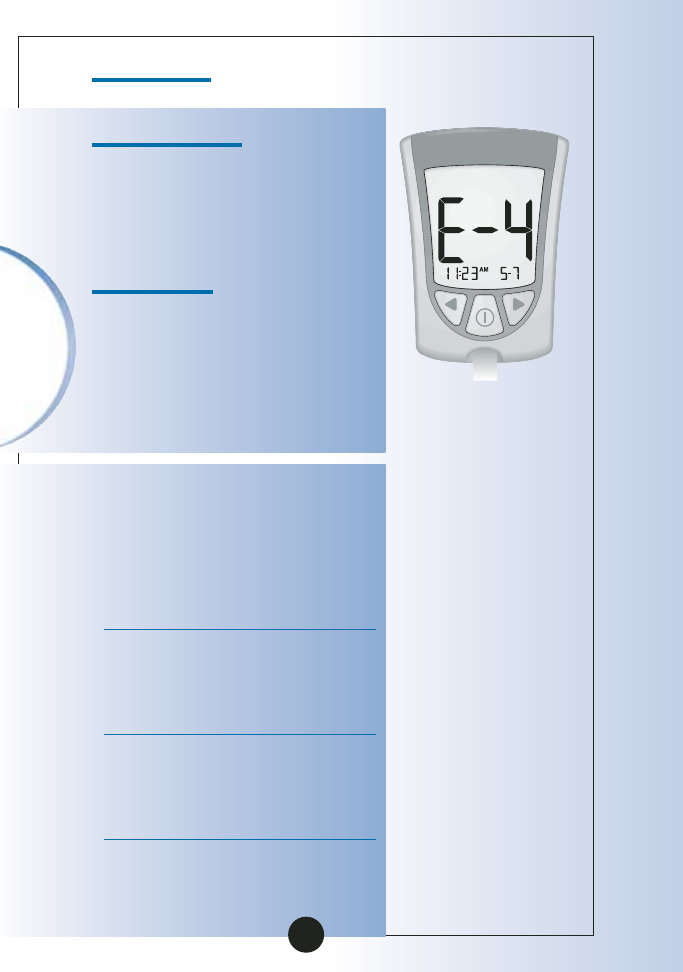
Monitoring
Blood Glucose
"E-4" Result
What It Means:
Your blood glucose may be too
high to be read by the system,
or there may be a problem with
the test strip.
What to Do:
Monitor your blood glucose
again with a new test strip. If
E-4 shows on the display
window again, contact your
healthcare professional
immediately.
Important:
It is recommended that you
repeat the blood glucose test
with a new test strip when:
•LO shows on the
display window.
•You obtain a low blood
glucose result, but you do
not have symptoms of low
blood glucose.
•Your monitor displays a blood
glucose result that is unusually
low, lower than 50 mg/dL
(2.8 mmol/L).
41
ART06986-Rev-B-MAN 8/22/05 11:02 AM Page 44
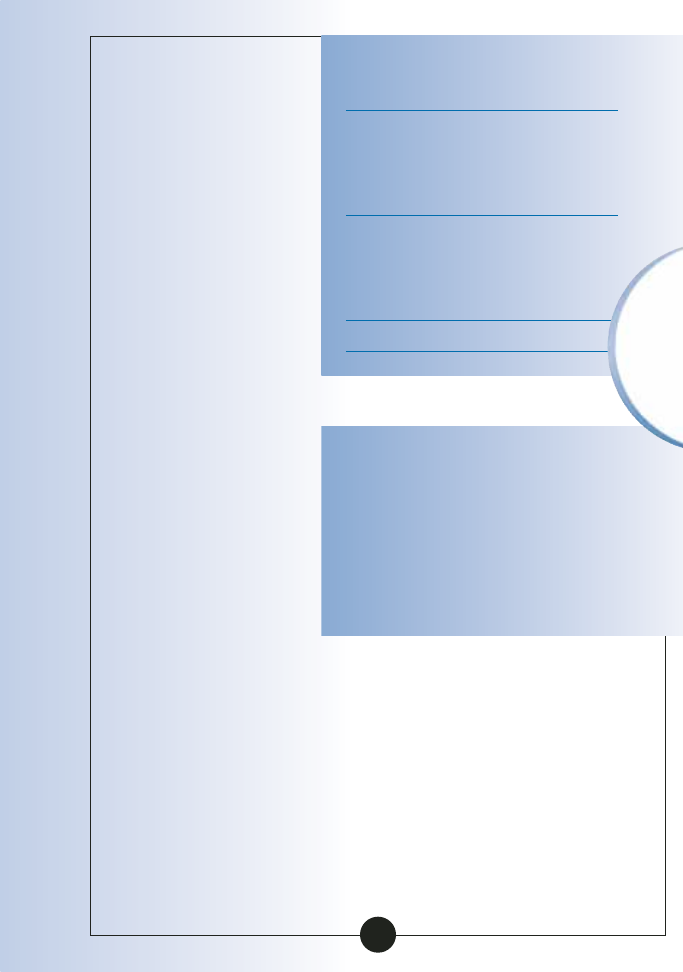
42
•HI shows on the
display window.
•You obtain a high blood
glucose result, but you do
not have symptoms of high
blood glucose.
•Your monitor displays a
result that is unusually high,
higher than 300 mg/dL
(16.7 mmol/L).
•You question your result.
Important:
A result that is incorrect may
have a serious medical
outcome. Consult your
healthcare professional before
changing your diabetes
medication program.
Monitoring
Blood Glucose
ART06986-Rev-B-MAN 8/22/05 11:02 AM Page 45
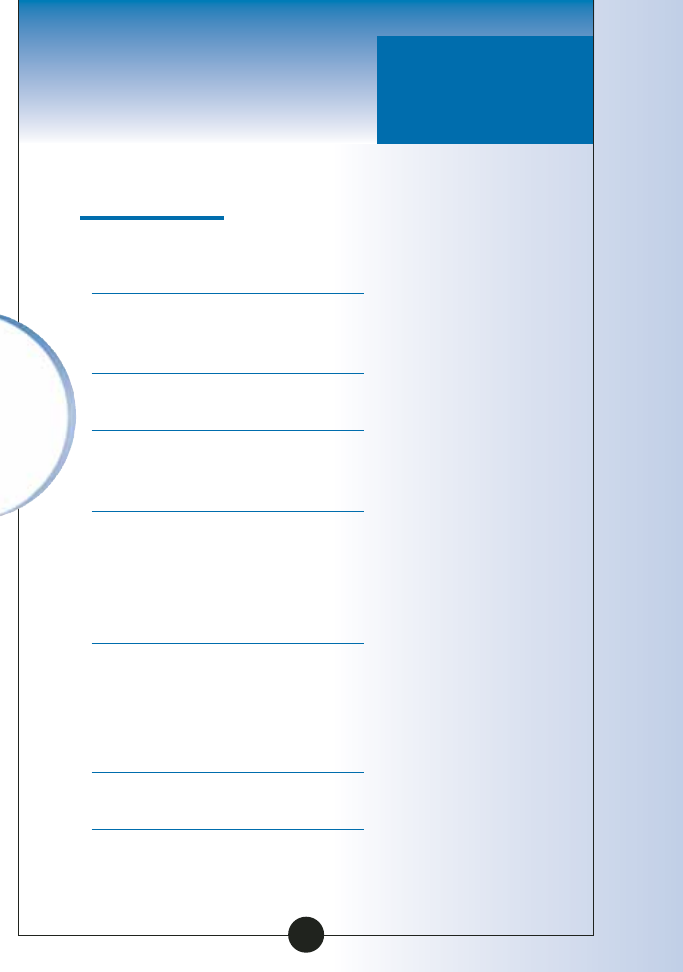
CHAPTER 5
Questions? Call
Customer Care:
1-800-527-3339
Monitoring Your
Blood ß-Ketone
It is important to check your
ketones when:
•You have an illness.
•Your blood glucose is
higher than 300 mg/dL
(16.7 mmol/L).
•You are experiencing unusual
blood glucose results.
•You and your healthcare
professional determine that it
is necessary.
What You Will Need
•Blood ß-Ketone test strip with
its instructions for use
•Precision Xtra monitor
calibrated to match the
calibration CODE of the
blood ß-Ketone test strip you
are using
•Lancing device and a new,
sterile lancet
▼
Monitoring Blood
ß-Ketone
43
ART06986-Rev-B-MAN 8/22/05 11:02 AM Page 46
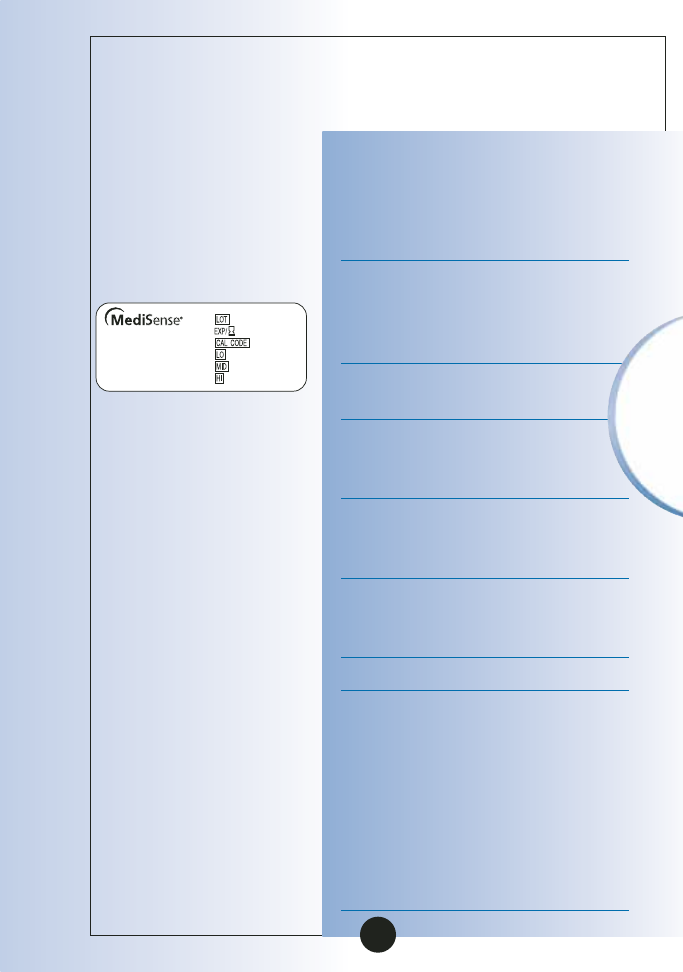
Made in UK.
P/N 120-1025
Rev. 0 1/03
ß-Ketone Test Strip
Abbott Laboratories
Abbott Diabetes Care
Alameda, CA 94502
USA
70208
2006/03/09
. JC7
0.3-0.7 mmol/l
1.9-2.9 mmol/l
3.7-5.7 mmol/l
Example:
Expiration date
March 9, 2006
Important Information
about Monitoring Your
Blood ß-Ketone
•For more detailed information
about your blood ß-Ketone test
strip, please refer to its
instructions for use
before monitoring.
•Do not use out-of-date test
strips. Check the expiration date
printed on the test strip box and
on each test strip foil packet.
•Do not put urine on the
blood ß-Ketone test strip.
•Use the test strip immediately
when you take it out of its
foil packet.
•Do not use a wet, bent,
scratched, or damaged
test strip.
•Do not use the test strip if its
foil packet has a puncture or
tear in it.
•Use each test strip only once.
•Before you monitor your blood
glucose or blood ß-Ketone, allow
your monitor and test strip to
reach the recommended
operating range of the test strip.
The test strip operating range is
in the “Limitations of Procedure”
section of your blood ß-Ketone
test strip instructions for use.
Monitoring
Blood ß-Ketone
44
▼
ART06986-Rev-B-MAN 8/22/05 11:02 AM Page 47
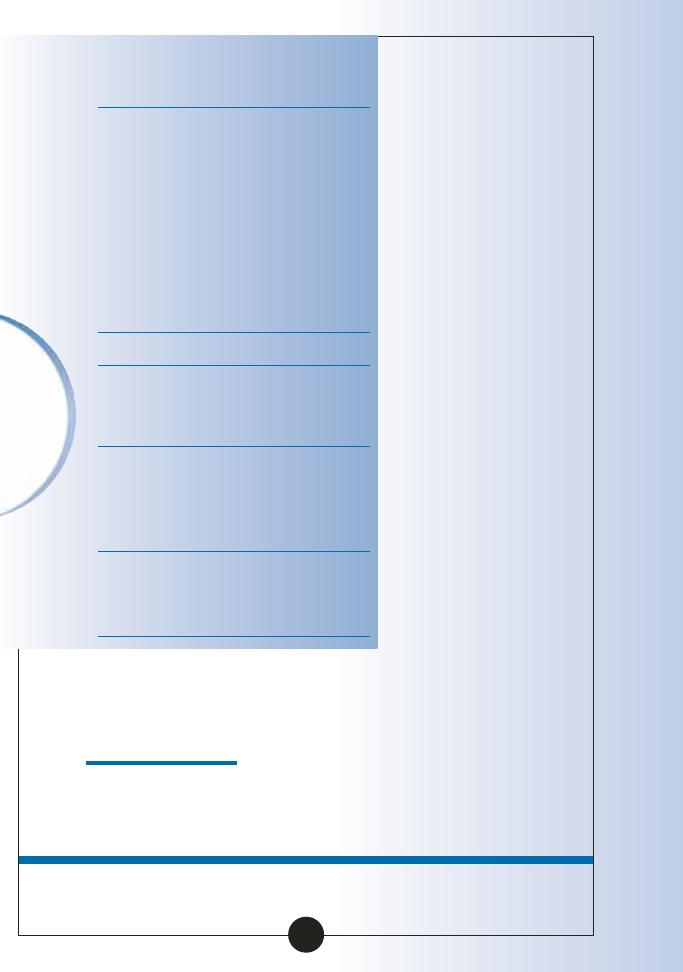
▼
•Read the lancing device
instructions for use.
•The blood ß-Ketone test strip
foil packet contains a
desiccant tablet (Zeolite -
Sodium Calcium
Aluminosilicate). Although
this material is not
considered dangerous1,
the following safety advice
should be observed:
1. Keep away from children.
2. Do not expose to water as
product gets hot and could
cause burns.
3. Do not eat, and avoid
contact with eyes and skin.
May cause burns to the
mouth and throat.
4. If swallowed, drink two
glasses of water. Seek
medical help.
How to Monitor Your
Blood ß-Ketone
Getting Started
1Prepare your lancing device.
Monitoring
Blood ß-Ketone
▼
45
ART06986-Rev-B-MAN 8/22/05 11:02 AM Page 48
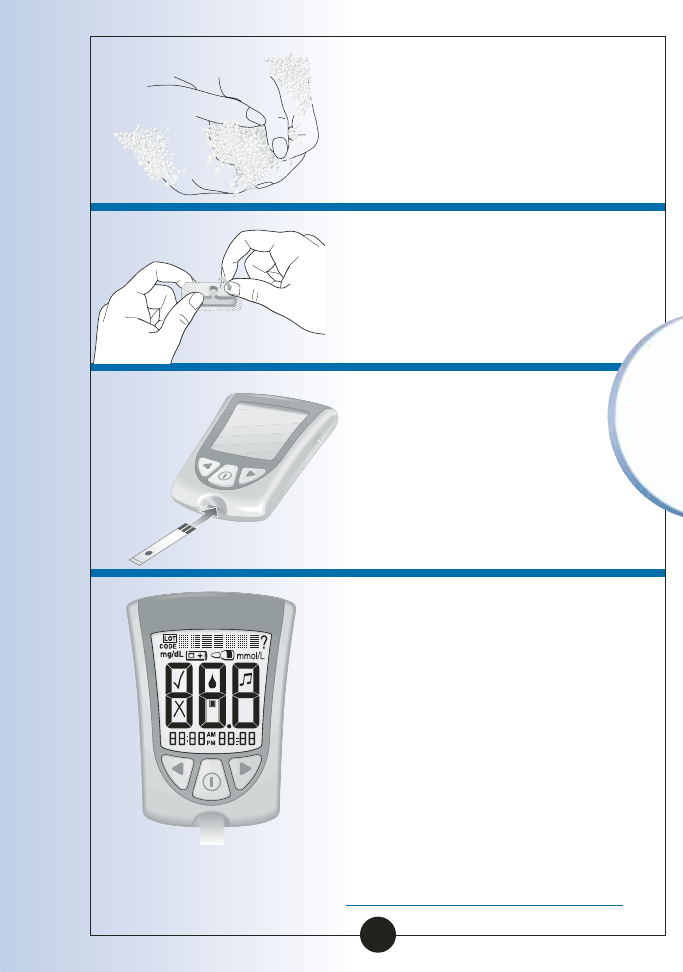
2Wash your hands using
warm soapy water and dry
them completely.
3Remove the test strip from
its foil packet.
4Insert the three black lines
at the end of the test strip
into the strip port.
5Push the test strip in until
it stops.
The monitor turns
on automatically.
These items show on the display
window, one after the other:
•Display Check – Remember to
make sure that all items in the
picture here show on the
display window. (See Chapter
1 for more information about
the Display Check.)
Monitoring
Blood ß-Ketone
46
ART06986-Rev-B-MAN 8/22/05 11:02 AM Page 49
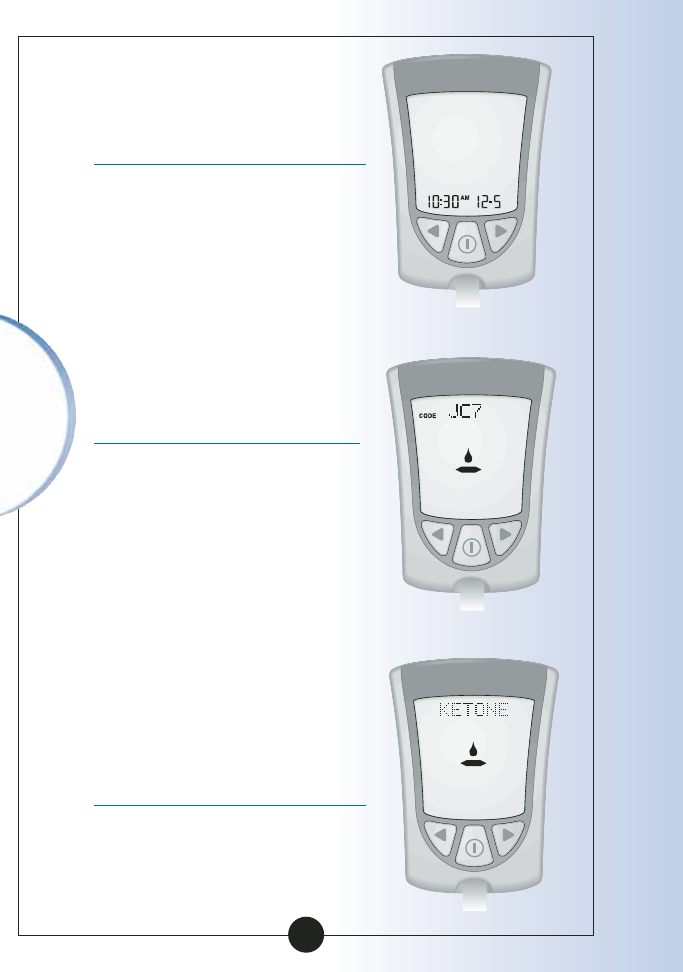
•Time, month, and day (if set)
If date and time are not set,
dashes will show instead
of numbers.
•Calibration CODE for the
box of blood ß-Ketone test
strips you are using.
•KETONE and Apply Blood
message, which tell you that
the monitor is ready for you to
apply blood to the blood
ß-Ketone test strip.
Monitoring
Blood ß-Ketone
47
ART06986-Rev-B-MAN 8/22/05 11:02 AM Page 50
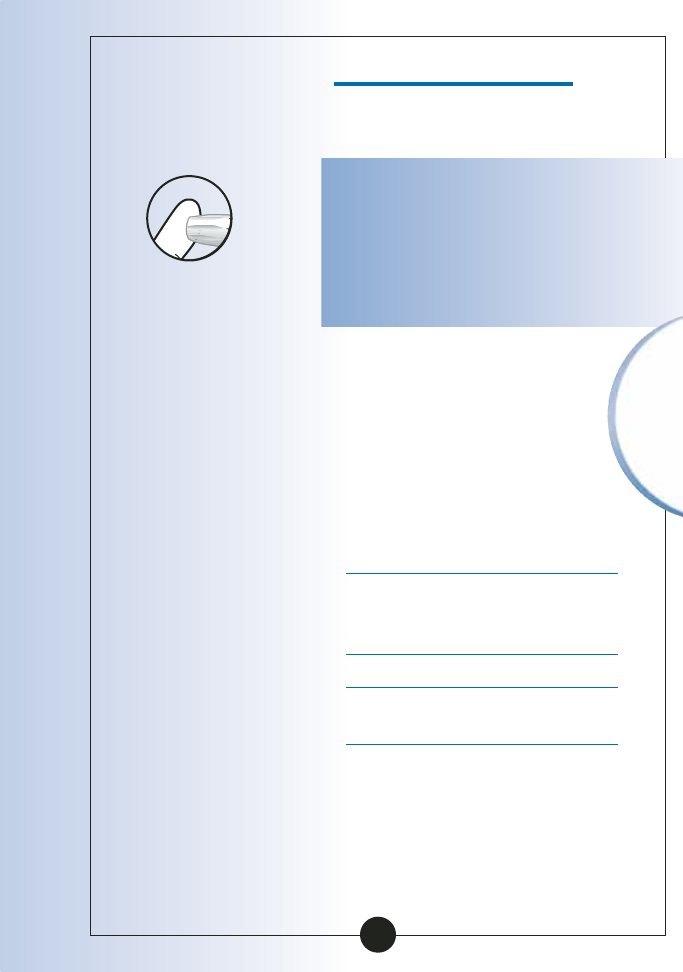
48
Fingertip sampling
Obtaining A Blood Drop
Use your lancing device to
obtain a blood drop.
Important: Blood ß-Ketone
test strips have not been
evaluated for alternative site
monitoring. Use only
fingertip blood samples for
blood ß-Ketone monitoring.
Recommendations for
Obtaining A Blood Drop
•Before you obtain a blood
sample from the fingertip,
make sure the sample site is
clean, dry, and warm. To
warm the sample site, wash it
in warm water or rub the skin
vigorously for a few seconds.
•Hang your arm down before
pricking your fingertip to help
blood flow.
•Avoid squeezing the fingertip.
•Apply the blood sample to the
test strip immediately.
Monitoring
Blood ß-Ketone
ART06986-Rev-B-MAN 8/22/05 11:02 AM Page 51
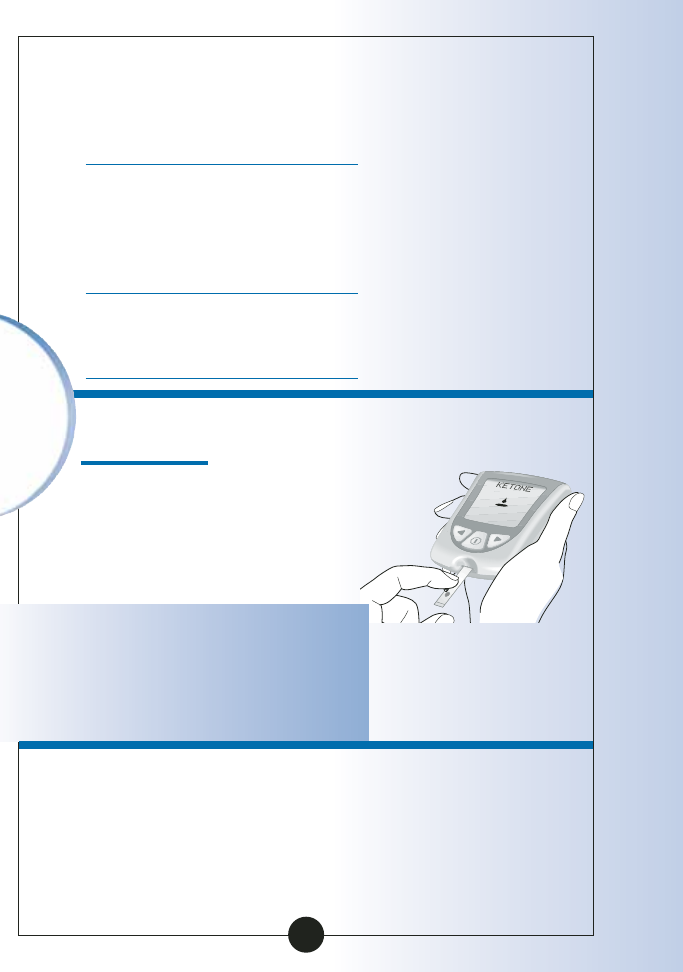
Monitoring
Blood ß-Ketone
Lancets and Lancing Device
•Lancets are for one-time use
only. Use a new lancet each
time you monitor.
•Discard your used lancet
properly. Put it in an empty
puncture-resistant container,
such as a plastic milk carton or
detergent bottle.
•Never share your lancing
device or lancet with
another person.
Applying the Blood Drop to
the Test Strip
1Touch the blood drop to
the purple area on the top
of the test strip. The blood
is drawn into the test strip.
Note: If the monitor shuts off
before you apply blood to the
test strip, remove the test strip
from the monitor and try again.
2Continue to touch the
blood drop to the purple
area on the top of the test
strip until the monitor
begins the test. The monitor
begins the test when:
49
ART06986-Rev-B-MAN 8/22/05 11:02 AM Page 52
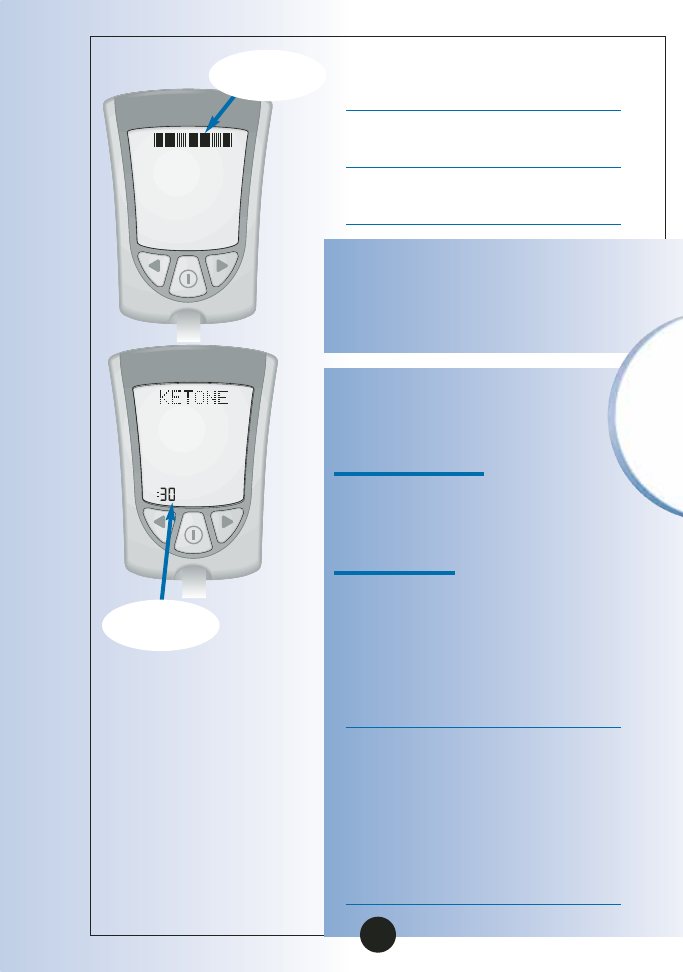
Monitoring
Blood ß-Ketone
Status bar
Countdown
50
•You hear the beeper, if the
beeper is ON.
•The display window shows the
status bar.
•Then the display window
shows the countdown.
Note: Do not remove the
test strip from the monitor
or disturb it during
the countdown.
Important: If the countdown
does not start:
What It Means:
You might not have applied
enough blood to the test strip.
What to Do:
•Apply a second drop of blood
to the test strip. Refer to your
test strip instructions for use
for the number of seconds
you have to apply a second
drop.
•If the countdown still does
not start, or if the number of
seconds you have to apply a
second drop have passed,
discard the test strip, turn off
your monitor, and try again
with a new test strip
ART06986-Rev-B-MAN 8/22/05 11:02 AM Page 53
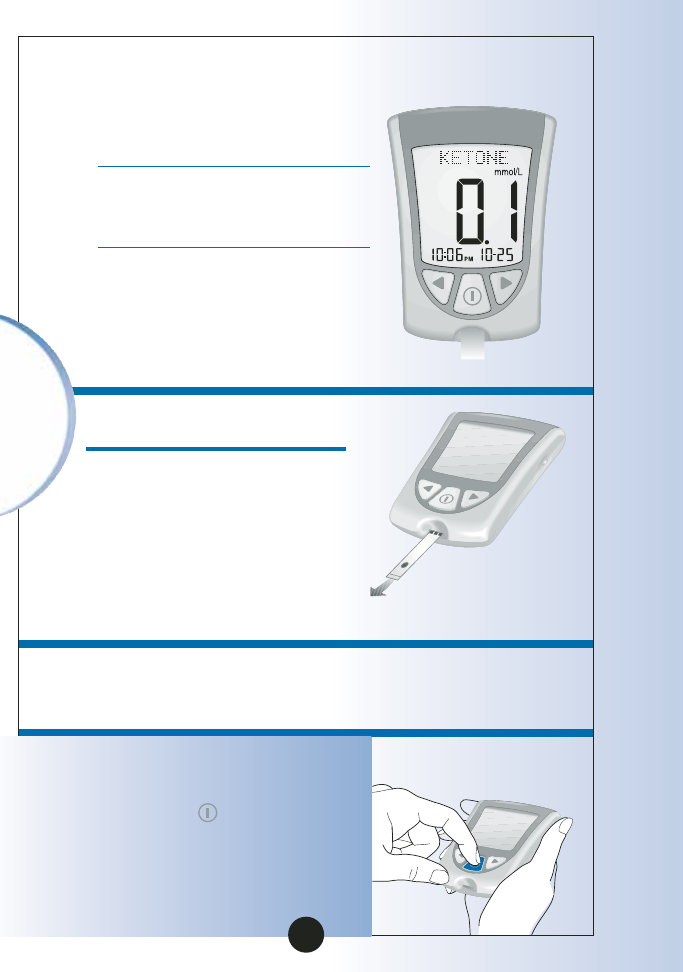
Monitoring
Blood ß-Ketone
3At the end of
the countdown:
•If the beeper is ON, listen for
the beeper.
•The blood ß-Ketone result
shows on the display window
with the word KETONE.
•The result is stored in your
monitor’s memory as a blood
ß-Ketone result. You may
also write the result in
your logbook.
Shutting Off Your Monitor
1Removing the test strip from
the strip port turns off the
monitor. You can use the
opened foil packet to
remove and discard your
used test strip.
2Discard the test
strip properly.
Note: You may also turn the
monitor off by Pressing and
Holding the button. If you
do not turn your monitor off or
pull the test strip out, the
monitor shuts off automatically
after 60 seconds.
51
ART06986-Rev-B-MAN 8/22/05 11:02 AM Page 54
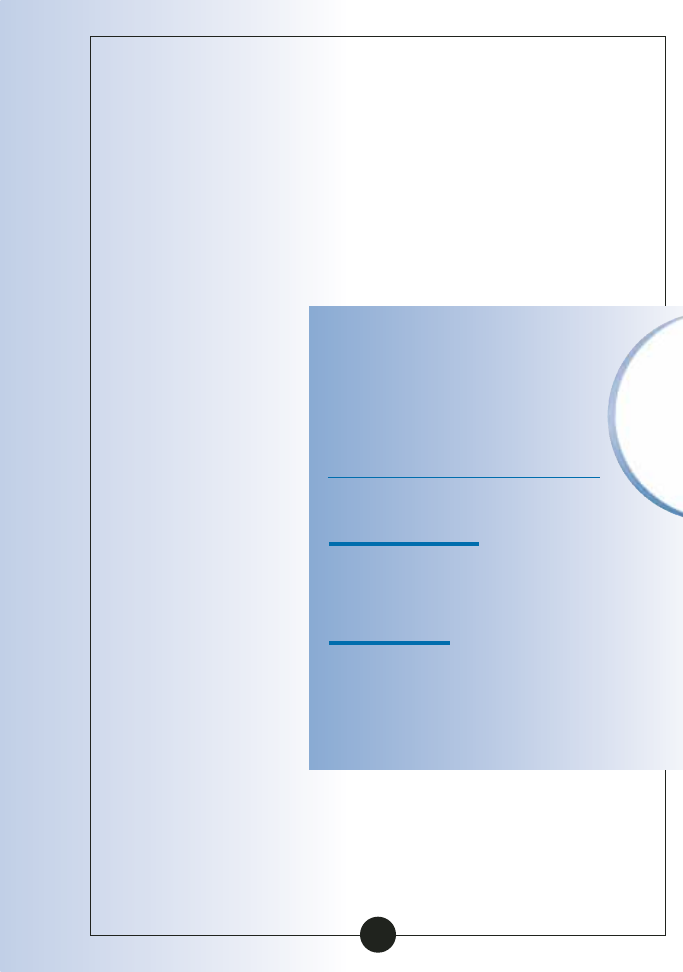
52
▼
Understanding
Your Result
Blood ß-Ketone is expected to
be lower than 0.6 mmol/L.3
Blood ß-Ketone may be higher
when a person is ill, is fasting,
exercises vigorously, or if
blood glucose levels are
not controlled.2-4
When:
•Blood ß-Ketone result is
between 0.6 and 1.5 mmol/L
and blood glucose result is
300 mg/dL (16.7 mmol/L)
or higher:
What It Means:
A problem requiring medical
assistance may be occurring.
What to Do:
Contact your healthcare
professional. Follow his or
her instructions for sick
day management.
Monitoring
Blood ß-Ketone
ART06986-Rev-B-MAN 8/22/05 11:02 AM Page 55
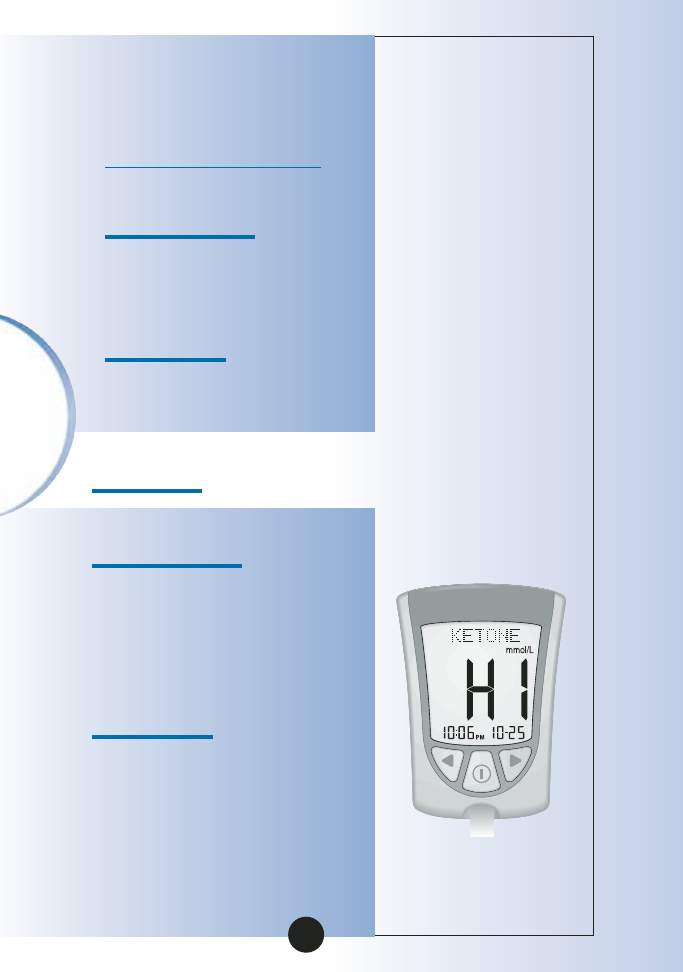
When:
•Blood ß-Ketone result
remains high or becomes
higher than 1.5 mmol/L:
What It Means:
You may be at risk of
developing diabetic
ketoacidosis (DKA).3-7
What to Do:
Contact your healthcare
professional immediately.
"HI" Result
What It Means:
Your monitor has determined
that your blood ß-Ketone
result is higher than 6.0
mmol/L, or there may be a
problem with the test strip.
What to Do:
Monitor your blood ß-Ketone
again with a new test strip. If
HI shows on the display
window again, contact your
healthcare professional
immediately.
Monitoring
Blood ß-Ketone
53
ART06986-Rev-B-MAN 8/22/05 11:02 AM Page 56
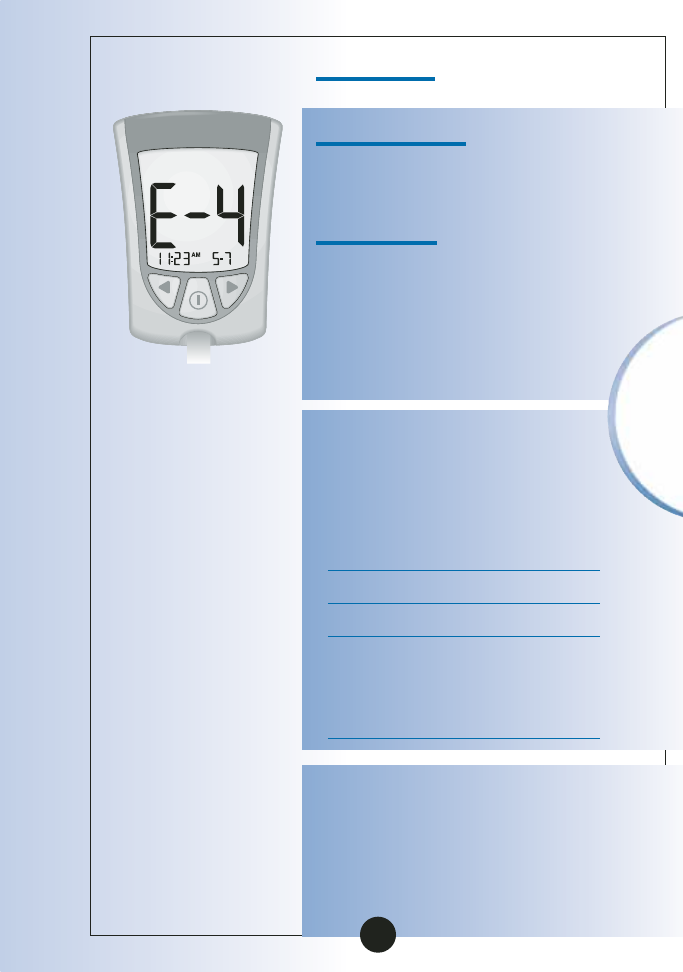
Monitoring
Blood ß-Ketone
"E-4" Result
What It Means:
There may be a problem with
the test strip.
What to Do:
Monitor your blood ß-Ketone
again with a new test strip. If
E-4 shows on the display
window again, contact your
healthcare professional
immediately.
Important: It is recommended
that you repeat the blood
ß-Ketone test with a new test
strip when:
•HI appears in the
display window.
•Your result is unusually high.
•You question your result.
•You obtain a 0.0 mmol/L
blood ß-Ketone result BUT
your blood glucose is higher
than 300 mg/dL (16.7 mmol/L).
Important: A result that is
incorrect may have a serious
medical outcome. Consult your
healthcare professional before
changing your diabetes
medication program.
54
ART06986-Rev-B-MAN 8/22/05 11:02 AM Page 57
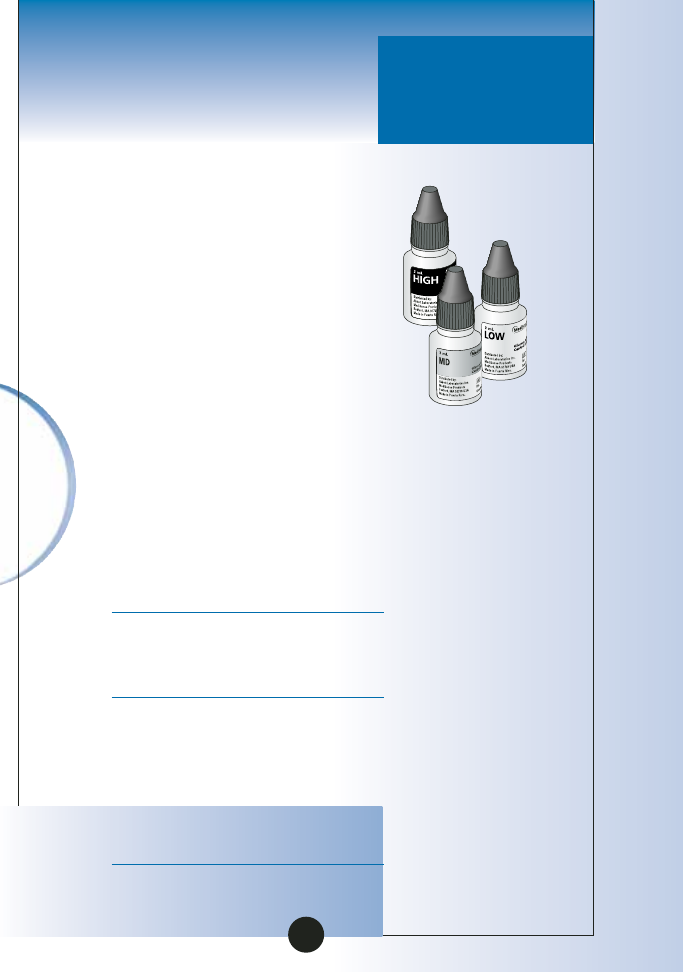
CHAPTER 6
Questions? Call
Customer Care:
1-800-527-3339
▼▼
Control Solution
Testing
▼
55
Doing A Control
Solution Test
Why Do A Control
Solution Test?
The control solution test tells
you that your monitor and test
strips are working correctly. A
control solution test is similar to
when you monitor your blood
glucose or blood ß-Ketone,
except you use a MediSense
Control Solution. You do not
use a drop of blood in a
control solution test.
When Is Doing A
Control Solution
Test Recommended?
•When you question
your results
•To make sure that your
monitor and test strips are
working properly
Important Information
about Control
Solution Testing
•For more detailed information
about control.
ART06986-Rev-B-MAN 8/22/05 11:02 AM Page 58
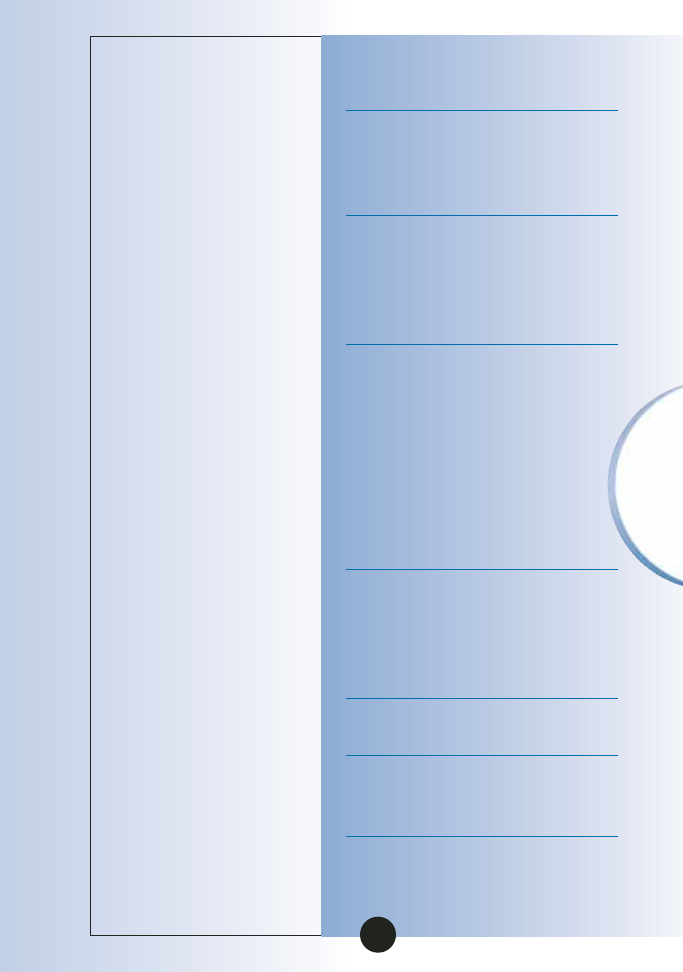
solutions, read the control
solution instructions for use.
•MediSense Control
Solutions may be used for
glucose or ketone control
solution testing.
•Do not use the control
solution if the expiration date
has passed. Check the
expiration date printed on the
control solution bottle.
•When you open a control
solution bottle for the first
time, count forward 90 days
and write this date on the
control solution bottle using
a pen that won’t smear or
wipe off. Throw away any
remaining solution after
this date.
•The results obtained from
control testing do not reflect
your personal blood glucose
or blood ß-Ketone levels in
any way.
•Do not swallow the
control solution.
•Do not inject the control
solution or use the control
solution as eye drops.
Control
Solution Testing
56
ART06986-Rev-B-MAN 8/22/05 11:02 AM Page 59
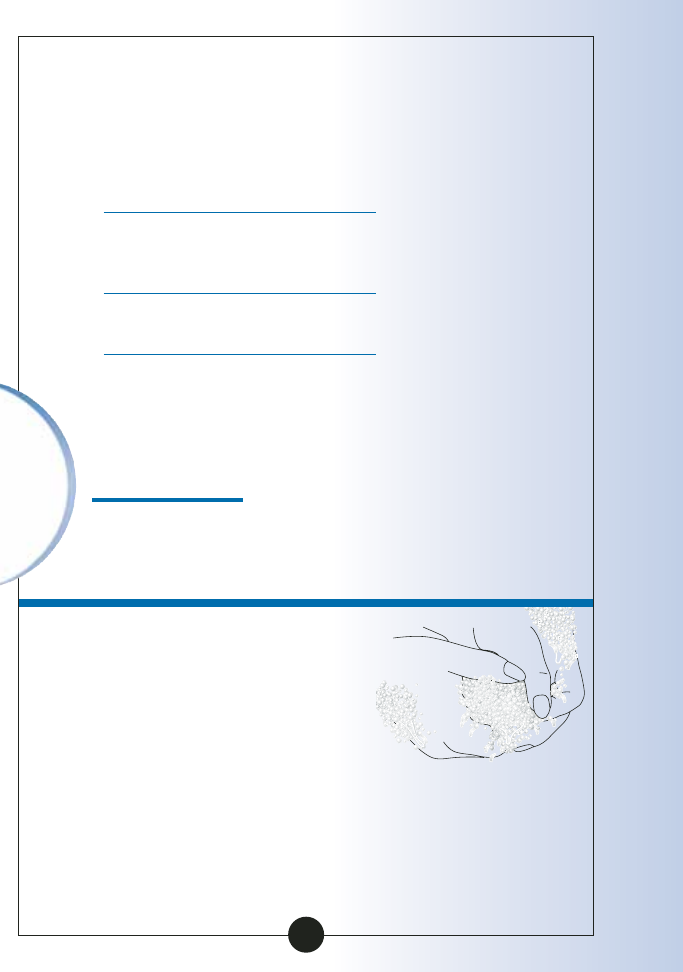
57
What You Will Need
•Precision Xtra monitor
calibrated to match the LOT
number (glucose) or
calibration CODE (ß-Ketone)
of the test strip you are using
•Blood glucose or blood
ß-Ketone test strip and its
instructions for use
•MediSense Control Solutions
and instructions for use
How to Do Control
Solution Testing
Getting Started
1Wash your hands using
warm soapy water and dry
them completely.
Control Solution
Testing
▼
▼
ART06986-Rev-B-MAN 8/22/05 11:02 AM Page 60
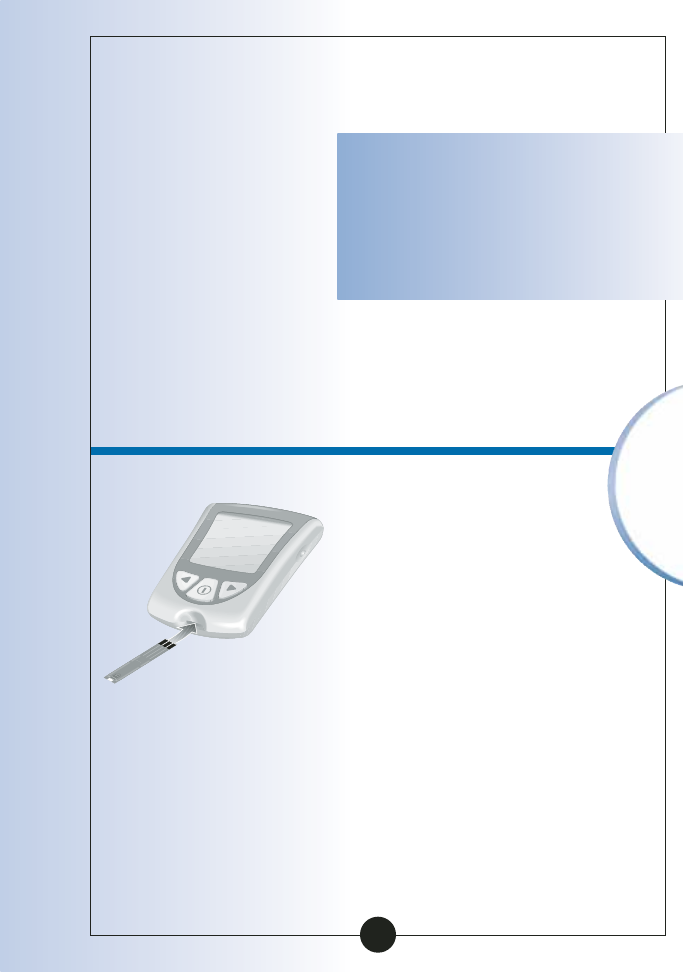
58
Control
Solution Testing
2Remove the test strip from
its foil packet.
Note: For pictures that
show how to open the
blood glucose test strip foil
packet, please see the
information card in the box
of blood glucose test strips.
3Insert the three black lines
at the end of the test strip
into the strip port.
ART06986-Rev-B-MAN 8/22/05 11:02 AM Page 61
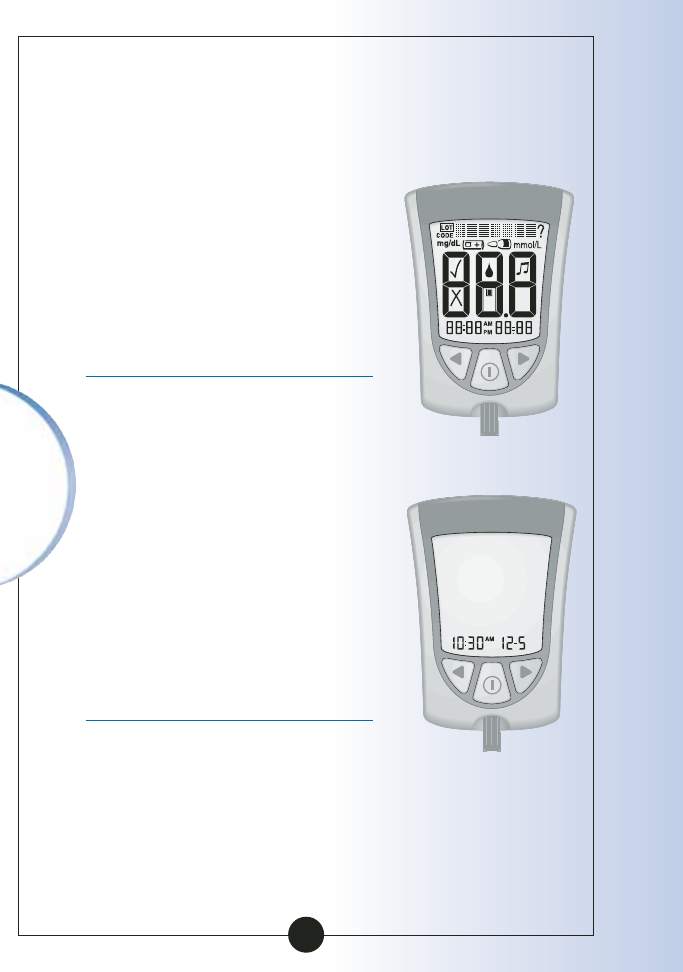
4Push the test strip in until
it stops.
The monitor turns
on automatically.
These items show on the display
window, one after the other:
•Display Check – Remember to
make sure that all items in the
picture here show on the
display window. (See Chapter 1
for more information about the
Display Check.)
•Time, month, and day (if set)
If date and time are not set,
dashes will show instead
of numbers.
Control Solution
Testing
59
ART06986-Rev-B-MAN 8/22/05 11:02 AM Page 62
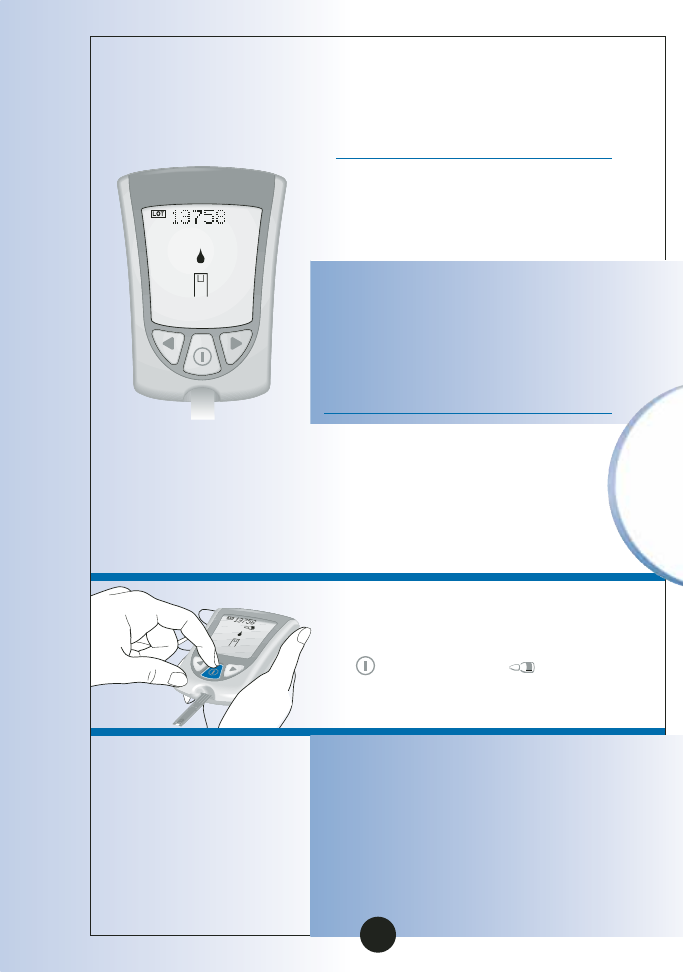
Control
Solution Testing
Control
Solution Testing
•LOT number (glucose) or
calibration CODE (ß-Ketone)
for the box of test strips you
are using.
•Apply Blood message, which
tells you that the monitor is
ready for you to apply control
solution to the test strip.
Note: If you are a doing a
ß-Ketone control solution
test, KETONE will show on
the monitor’s display window
with the ß-Ketone Apply
Blood message.
5To mark the test as a control
test, Press and Release the
button once. shows
on the display window.
Important: If you do not mark
the test as a control test, it will be
saved in your monitor’s memory
as one of your personal blood
glucose or blood ß-Ketone results.
This could affect your blood
glucose averages.
60
ART06986-Rev-B-MAN 8/22/05 11:02 AM Page 63
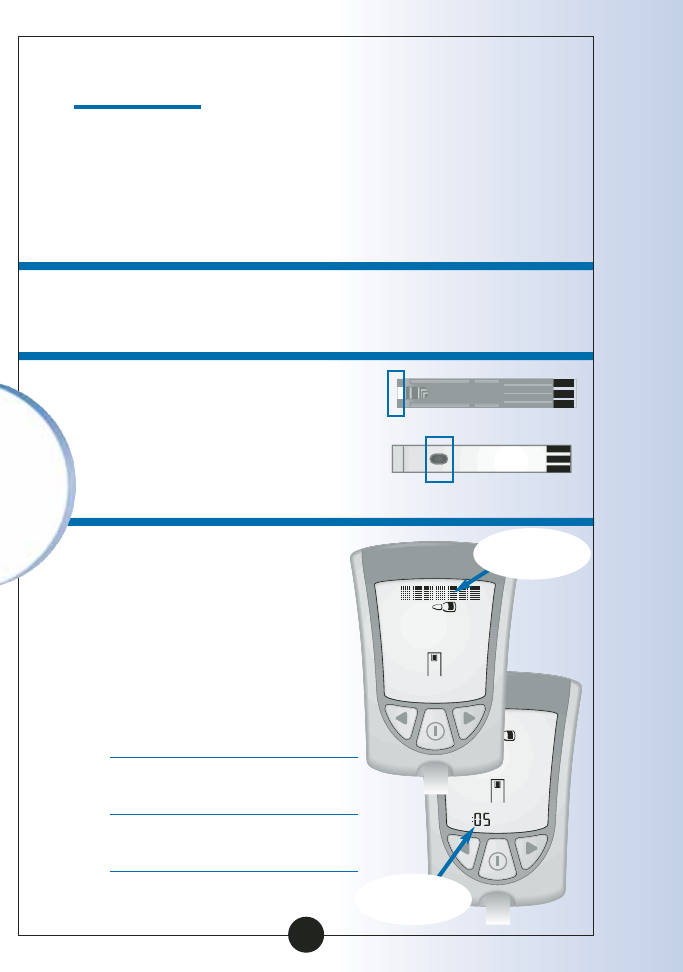
Applying Control Solution to
the Test Strip
1Turn the control solution
bottle upside down three
to four times to mix
the solution.
2Remove the cap.
3Apply a drop of control
solution to the test strip in
the area shown here. The
control solution is drawn
into the test strip.
4Continue to touch the
control solution to the test
strip until the monitor
begins the test.
The monitor begins the
test when:
•You hear the beeper, if the
beeper is ON.
•The display window shows
the status bar.
•Then the display window
shows the countdown.
Glucose
ß-Ketone
Status
bar
Countdown
61
Control Solution
Testing
ART06986-Rev-B-MAN 8/22/05 11:02 AM Page 64
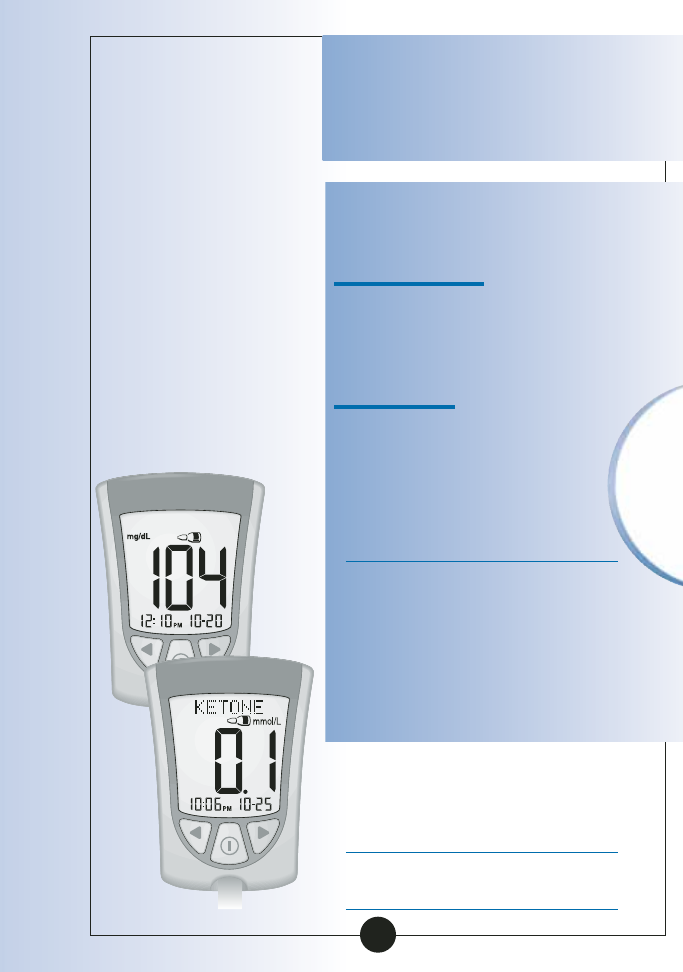
62
Glucose
ß-Ketone
Note: Do not remove the
test strip from the monitor
or disturb it during
the countdown.
Important: If the countdown
does not start:
What It Means:
You might not have applied
enough control solution to the
test strip.
What to Do:
•Apply a second drop of
control solution to the test
strip. Refer to your test strip
instructions for use for the
number of seconds you have
to apply a second drop.
•If the countdown still does
not start, or if the number of
seconds you have to apply a
second drop have passed,
discard the test strip, turn off
your monitor, and try again
with a new test strip.
5At the end of
the countdown:
•If the beeper is ON, listen for
the beeper.
•The control result shows on
the display window.
Control
Solution Testing
ART06986-Rev-B-MAN 8/22/05 11:02 AM Page 65
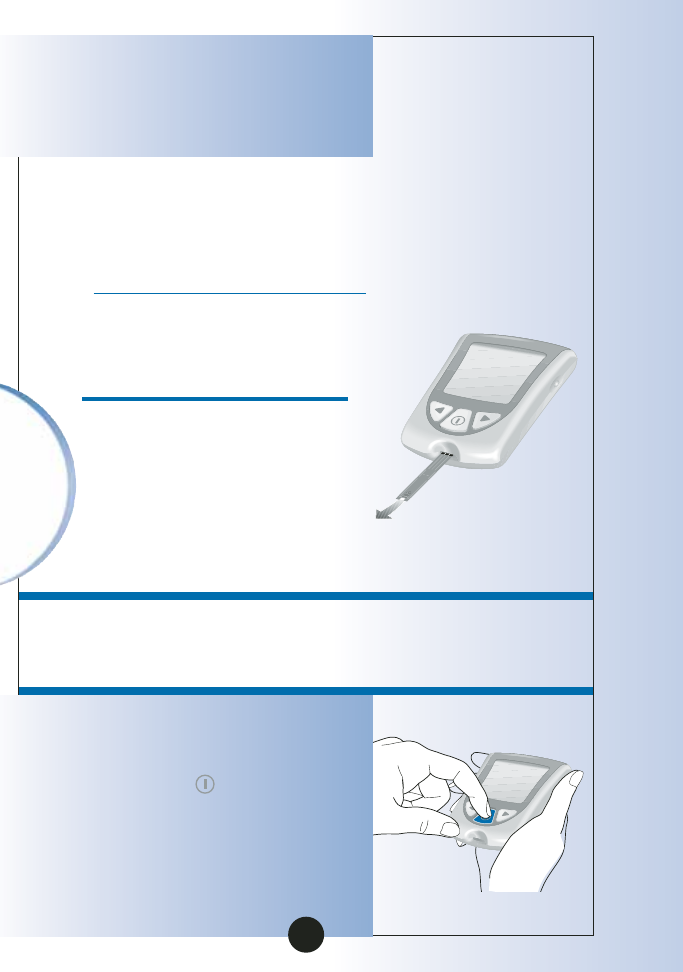
Control Solution
Testing
63
Note: If you are doing a
ß-Ketone control solution test,
KETONE will also show with
the result.
•The result is stored in your
monitor’s memory as a control
result. In your logbook, record
the result as a control result.
Shutting Off Your Monitor
1Removing the test strip from
the strip port turns off the
monitor. You can use the
opened foil packet to
remove and discard your
used test strip.
2Discard the test
strip properly.
Note: You may also turn the
monitor off by Pressing and
Holding the button. If you
do not turn your monitor off or
pull the test strip out, the
monitor shuts off automatically
after 60 seconds.
ART06986-Rev-B-MAN 8/22/05 11:02 AM Page 66
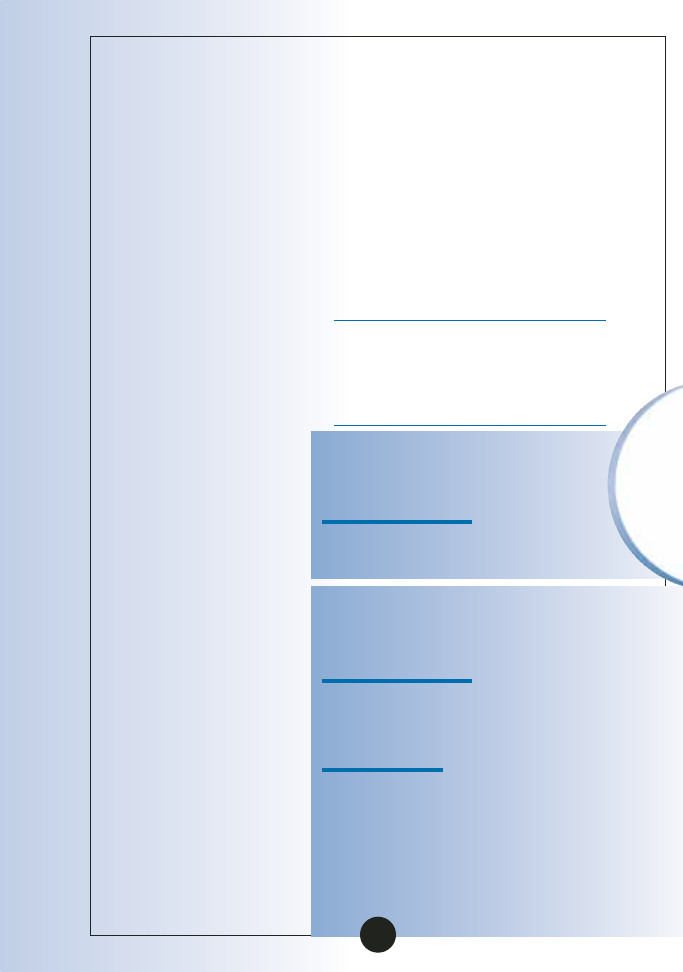
▼
Understanding
Your Result
Compare the control result to
the "Expected Results for Use
with MediSense Control
Solutions" range printed on:
•The blood glucose test
strip instructions for use,
for glucose control
solution testing.
•The blood ß-Ketone test strip
instructions for use and foil
packet, for ß-Ketone control
solution testing.
If the control result falls
within the range:
What It Means:
Your monitor and test strips are
working correctly.
If the control result does
not fall within the range:
What It Means:
Your monitor and test strips
may not be working correctly.
What to Do:
Repeat the test with a new test
strip and ensure the control
solution testing instructions are
followed completely. If the result
is still not within the printed
range, contact Customer Care.
Control
Solution Testing
64
ART06986-Rev-B-MAN 8/22/05 11:02 AM Page 67
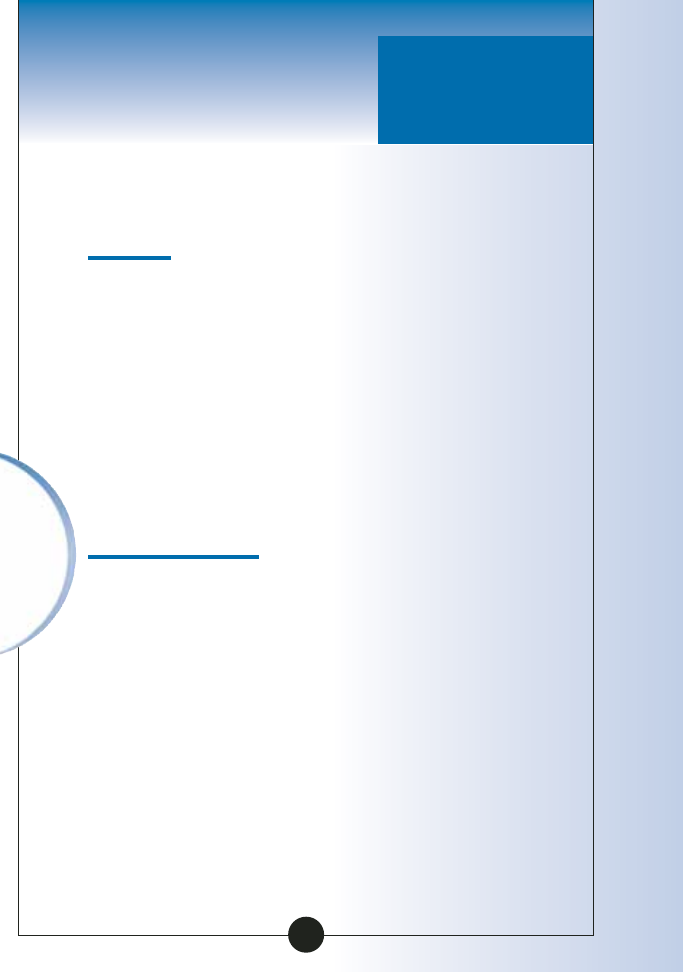
CHAPTER 7
Reviewing & Using
Your Results
What Can Your Monitor
Show You?
Memory
Your Precision Xtra monitor
has a memory that stores up
to 450 events. This is a
combination of control results,
your personal blood glucose
and blood ß-Ketone results,
and other monitor information.
You can review up to 450 of
your most recent events on
your monitor’s display window.
Glucose Averages
You can view the average of all
your blood glucose results from
the last 7, 14, or 30 days. If you
marked your control solution
tests, the averages do not
include control solution results.
(For more information on
marking control solution tests,
see Chapter 6.)
Questions? Call
Customer Care:
1-800-527-3339
▼
Reviewing Results
65
ART06986-Rev-B-MAN 8/22/05 11:02 AM Page 68
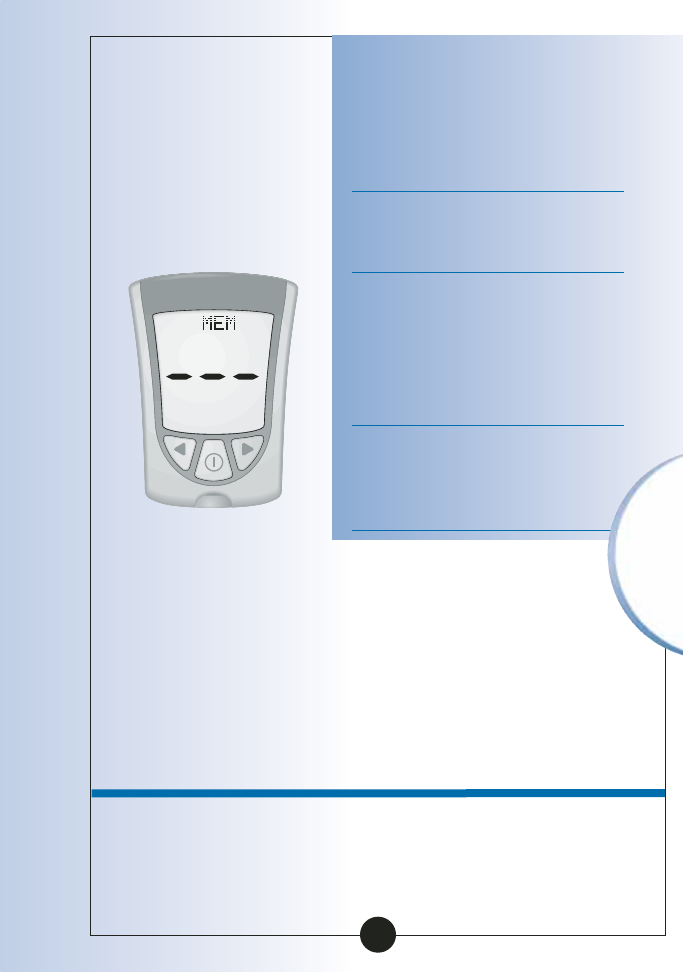
66
▼
Important:
•To review blood glucose
averages, you must set
the date and time
before monitoring.
•If you do not mark control
solution tests, this may affect
your glucose averages.
•Blood glucose averages do
not include blood ß-Ketone
results, glucose control results,
ß-Ketone control results, or
results that do not show the
time, month, and day.
•When there are no previous
results or blood glucose
averages to review, the display
window shows three dashes.
How to See Results
in Memory
1Begin with your monitor
turned off. Make sure
there is nothing in the
strip port.
Reviewing Results
➡
ART06986-Rev-B-MAN 8/22/05 11:02 AM Page 69
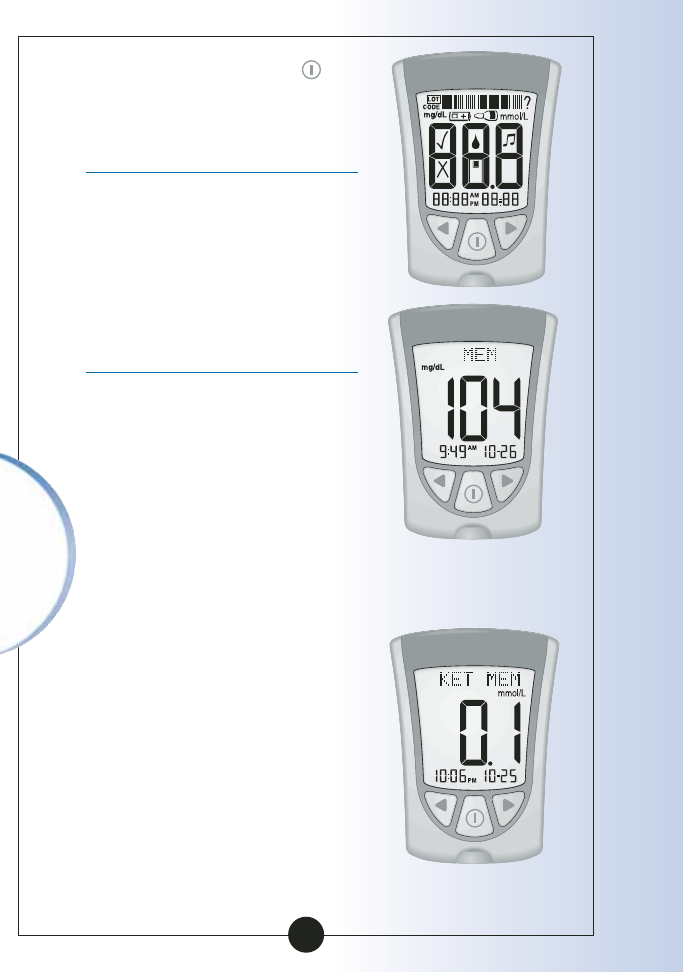
67
2Press and Release the
button.
•The Display Check shows on
the display window.
•Then your most recent result
shows with its units on the
monitor’s display window,
along with the time, month,
and day that you got the
result. (To set the correct date
and time, follow the steps in
Chapter 2.)
A blood glucose result in
Memory will show with the
letters MEM.
A blood ß-Ketone result in
Memory will show with the
letters KET MEM.
Reviewing Results
Blood Glucose result
in Memory
Blood ß-Ketone result
in Memory
ART06986-Rev-B-MAN 8/22/05 11:02 AM Page 70
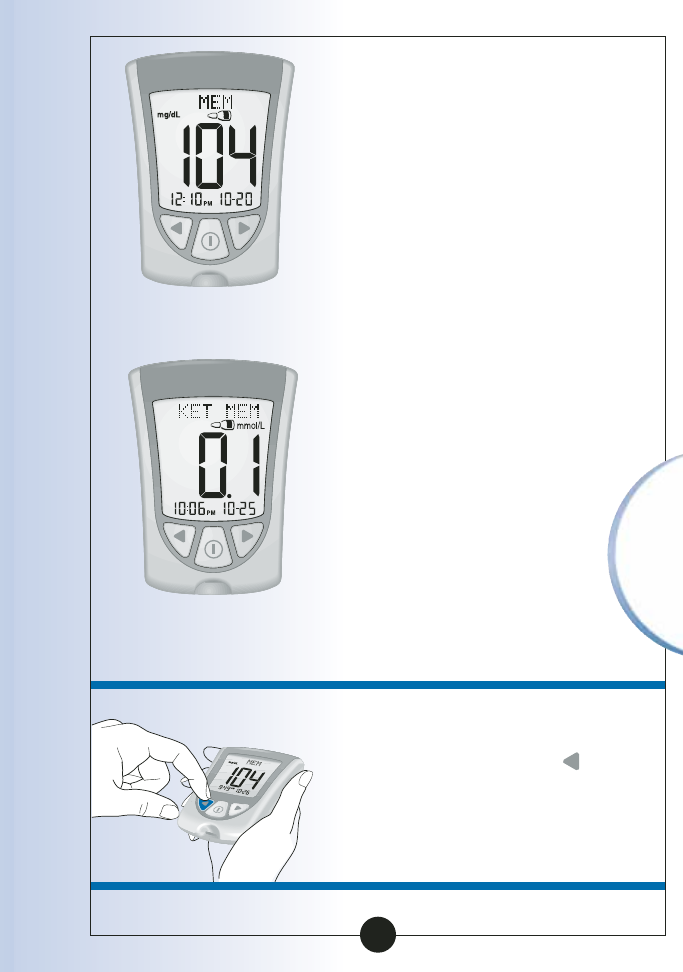
68
A control solution result in
Memory shows with a
control bottle, as long as
you marked the test as a
control solution test.
3To review previous results,
Press and Release the
button once per result.
Reviewing Results
Glucose control
solution result
in Memory
ß-Ketone control
solution result
in Memory
ART06986-Rev-B-MAN 8/22/05 11:02 AM Page 71
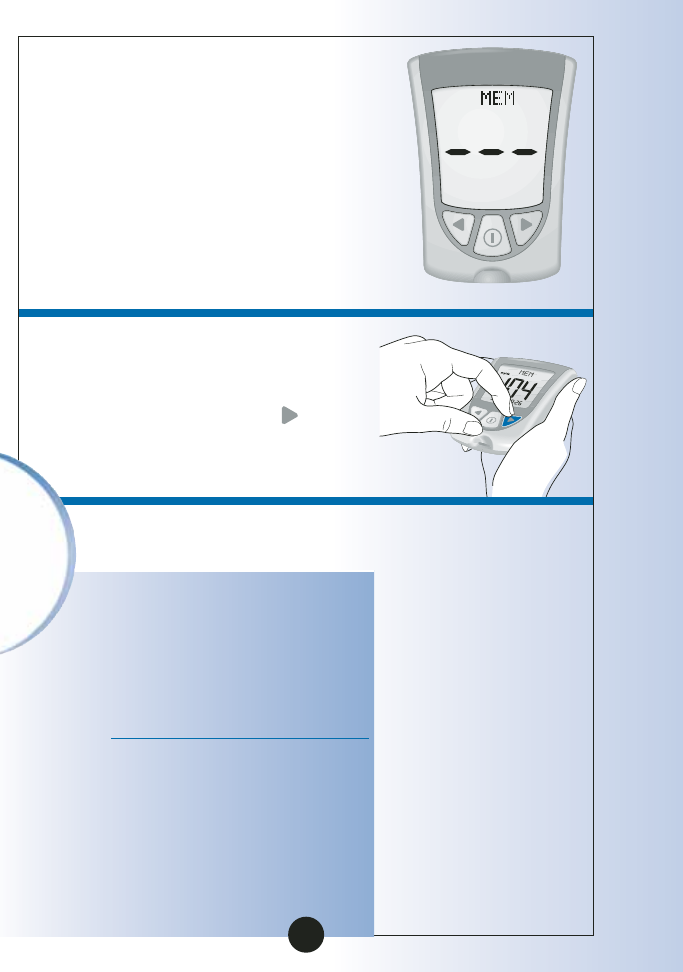
Reviewing Results
4When you reach the
last result in Memory,
the display window
shows three dashes.
5To return to a result you
previously reviewed, Press
and Release the button
once per result.
How to See Averages
Important:
•Results that show as LO
during blood glucose
monitoring are included as
20 mg/dL (1.1 mmol/L) in
blood glucose averages.
•Results that show as HI
during blood glucose
monitoring are included as
500 mg/dL (27.8 mmol/L) in
blood glucose averages.
▼
69
ART06986-Rev-B-MAN 8/22/05 11:02 AM Page 72
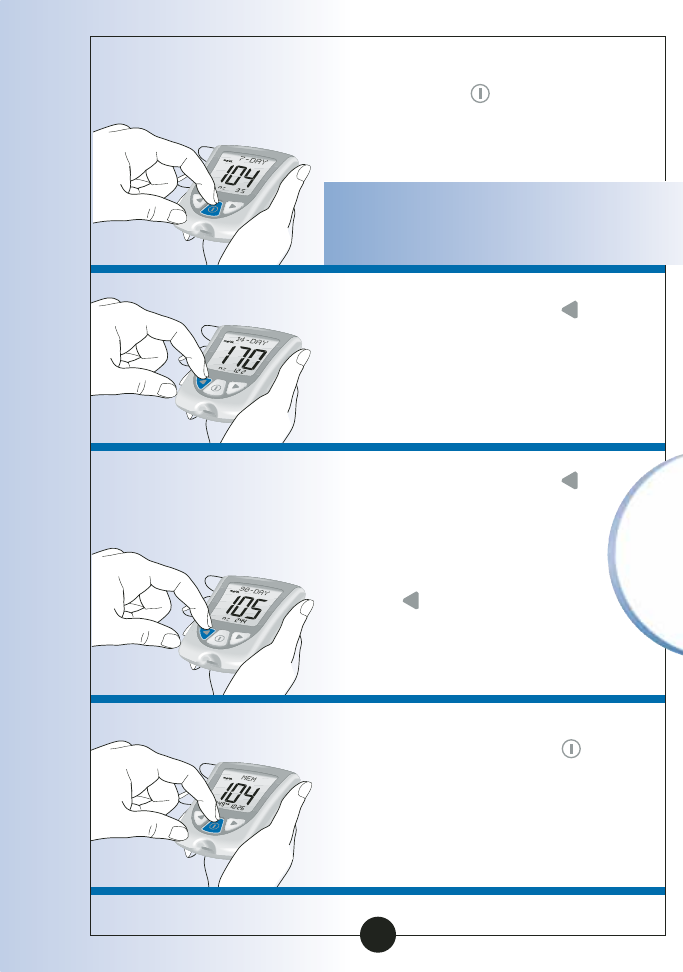
70
Reviewing Results
1While in Memory, Press and
Release the button at any
time to see the 7-Day
average of your blood
glucose results.
Note: n means how many tests
were performed within the 7-,
14-, or 30-Day average period.
2Press and Release the
button once to see the
14-Day average of your
blood glucose results.
3Press and Release the
button again to see the
30-Day average of your
blood glucose results. If
you Press and Release
the button again, the
display window shows the
7-Day average.
4Press and Release the
button at any time to return
to Memory.
ART06986-Rev-B-MAN 8/22/05 11:02 AM Page 73
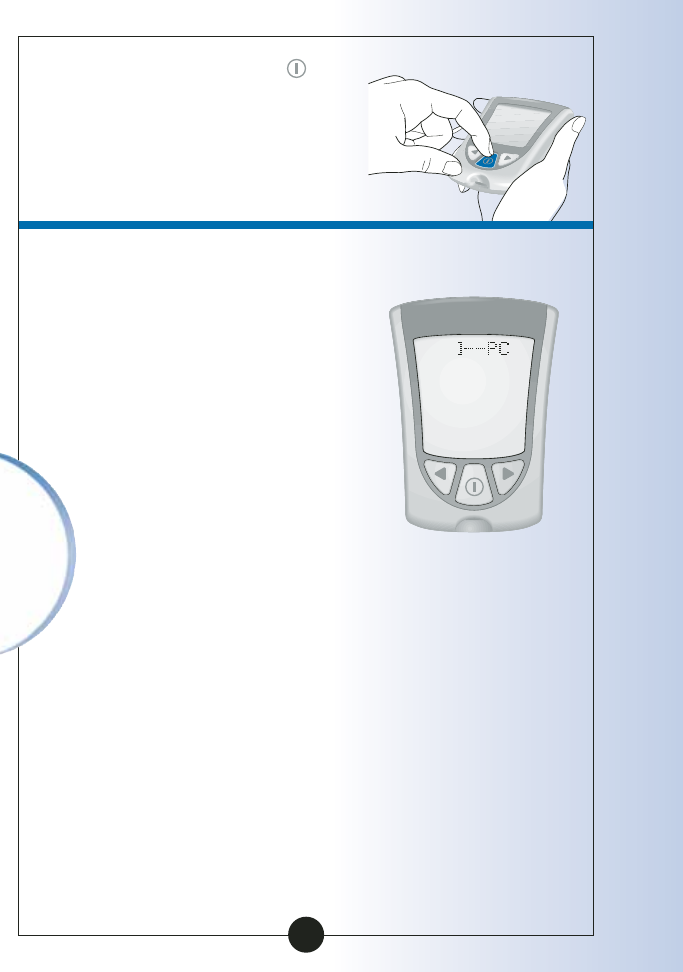
71
Reviewing Results
5Press and Hold the
button to turn off your
monitor. Otherwise, the
monitor turns off after
30 seconds.
Transferring Your Results
to a Computer
The results in your Precision
Xtra monitor's memory, along
with the time and date of the
reading, can be transferred to
a computer with the use of
the Precision Link®Direct
Software Version 2.5 and a
Precision Link communications
cable. For information on how
to purchase the software and
cable, contact Customer Care
at 1-800-527-3339. To install
the software, please follow
the instructions provided in
the Precision Link User's Guide.
▼
ART06986-Rev-B-MAN 8/22/05 11:02 AM Page 74
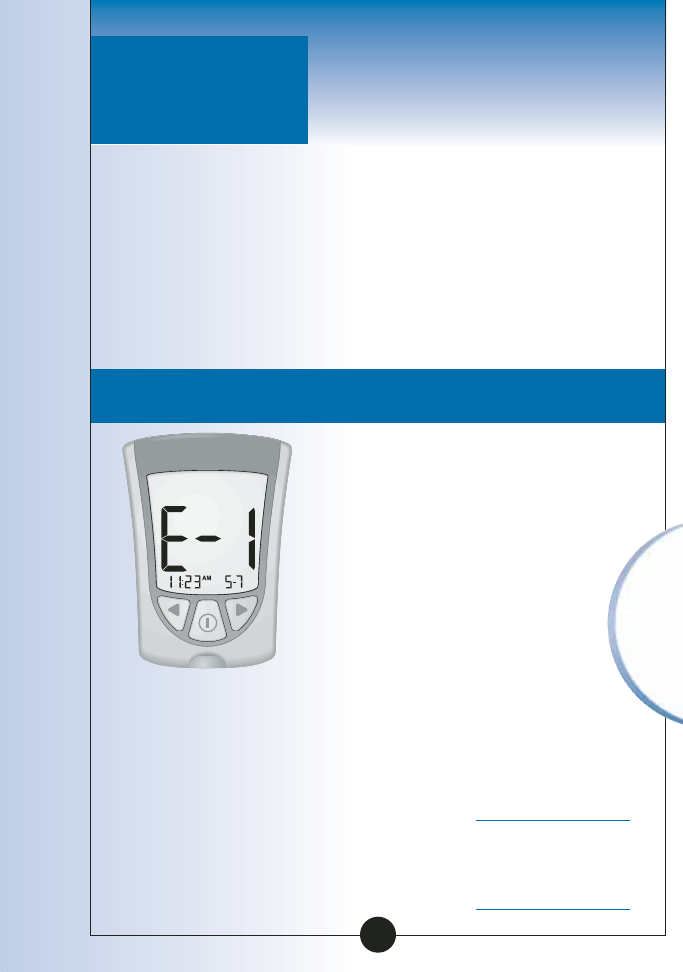
CHAPTER 8
Temperature is
too hot or too
cold for the
system to work
properly.
• Move your
monitor and test
strips to a location
where the
temperature is
appropriate and
monitor again
with a new test
strip. You may
have to wait
for your
monitor to
adjust to the new
temperature.
Refer to your test
strip instructions
for use for the
appropriate
operating range.
• If the error
message appears
again, contact
Customer Care.
Message What It What You
Means Need to Do
Questions? Call
Customer Care:
1-800-527-3339
Understanding &
Troubleshooting
Error Messages
There are times when error
messages may show on your
monitor’s display window.
In the next few pages, we
describe the error messages that
may show on your monitor’s
display window, what they
mean, and what you need to do.
Error Messages
72
ART06986-Rev-B-MAN 8/22/05 11:02 AM Page 75
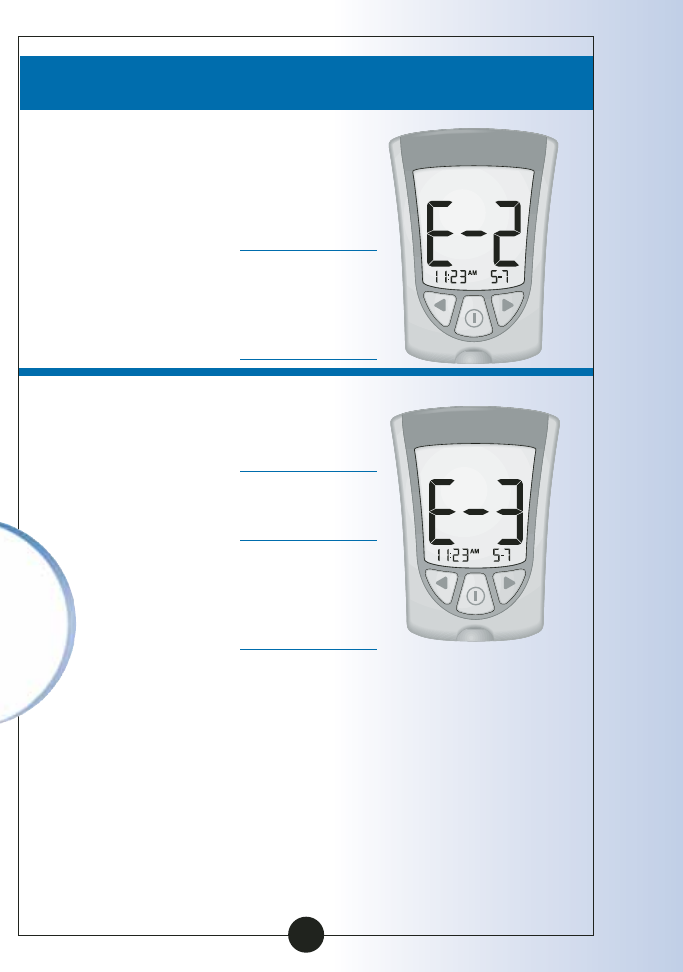
What It What You Message
Means Need to Do
Monitor error.
There may be
a problem with
the test strip.
• Turn the
monitor off,
then repeat
previous
monitoring
steps.
• If the error
message
appears again,
contact
Customer Care.
• Review the
monitoring
instructions.
• Monitor again
with a new
test strip.
• If the error
message
appears again,
contact
Customer Care.
Error Messages
73
ART06986-Rev-B-MAN 8/22/05 11:02 AM Page 76
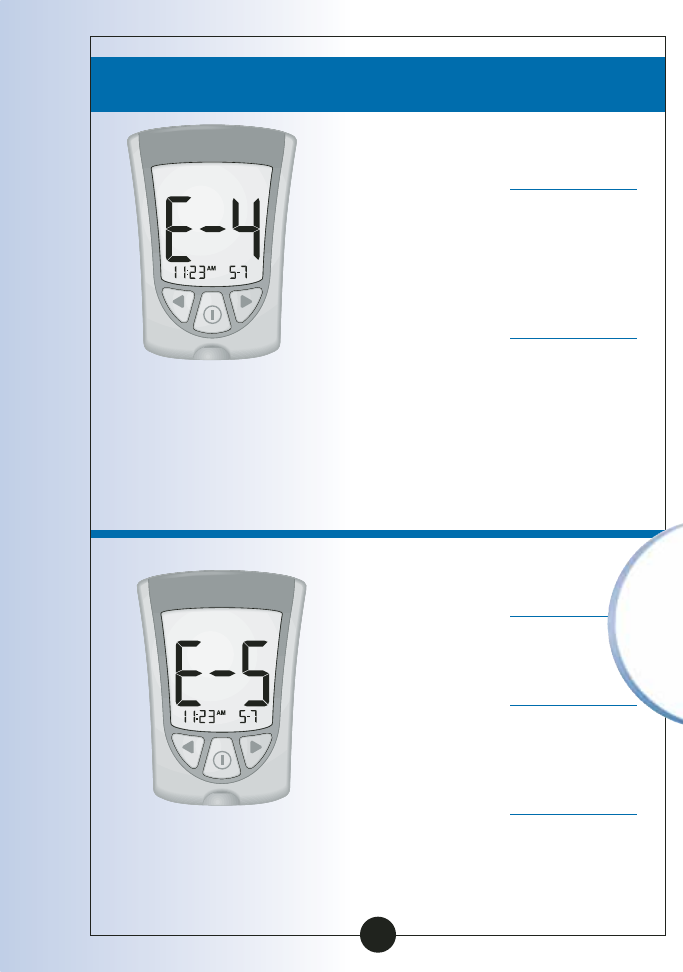
Message What It What You
Means Need to Do
Blood glucose
result may be
too high to be
read by the
system.
OR
There may be a
problem with
the blood
glucose or
blood ß-Ketone
test strip.
Blood applied
to test strip
too soon.
• Monitor again
with a new
test strip.
• If the error
message
appears again,
contact your
healthcare
professional
immediately.
• Review the
monitoring
instructions.
• Monitor
again with
a new
test strip.
• If the error
message
appears again,
contact
Customer Care.
74
Error Messages
ART06986-Rev-B-MAN 8/22/05 11:02 AM Page 77
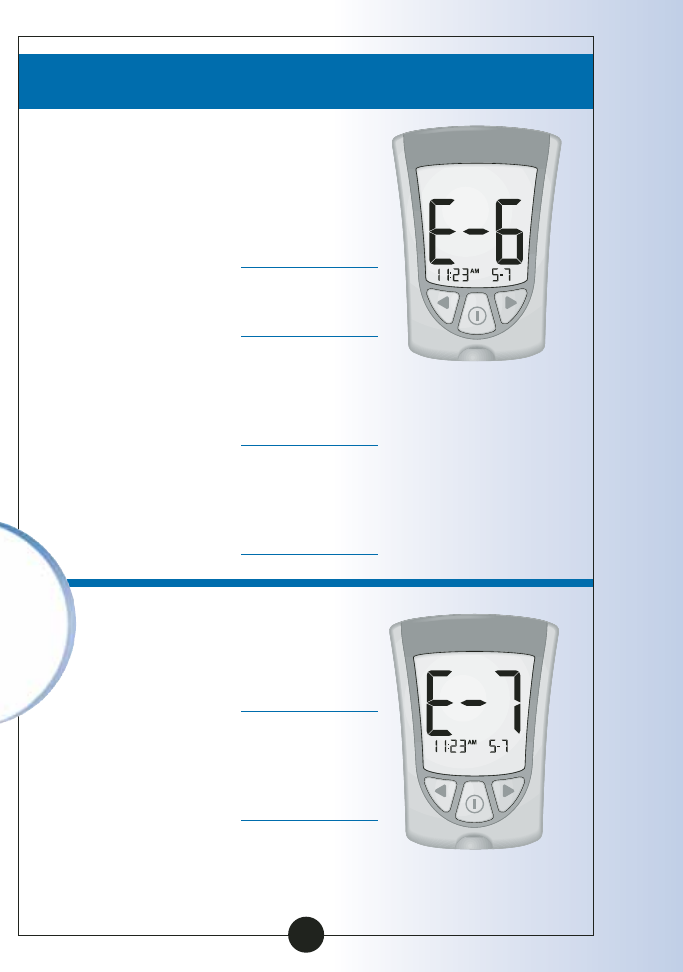
What It What You Message
Means Need to Do
Calibration/Test
strip error.
Test strip error.
Test strip is
damaged, used,
or the monitor
does not
recognize it.
• Repeat the
calibration
using the
calibrator bar
that came with
the test strip
you are using.
• Check the date
setting on your
monitor.
• Check the
expiration date
on the test
strip foil
packet.
• If the error
message
appears again,
contact
Customer Care.
• Monitor again
using a test
strip designed
for use with
Precision Xtra.
• If the error
message
appears again,
contact
Customer Care.
75
Error Messages
ART06986-Rev-B-MAN 8/22/05 11:02 AM Page 78
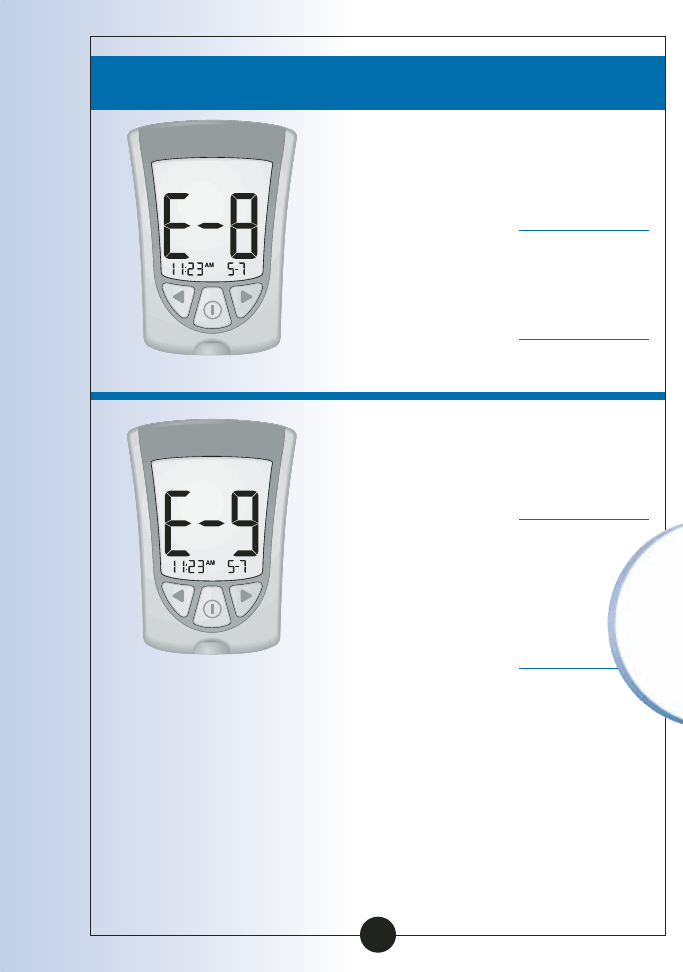
Monitor error.
Monitor error.
• Remove test
strip, turn
monitor off,
and try to
monitor again.
• If the error
message
appears again,
contact
Customer Care.
• Remove test
strip, turn
monitor off,
and try to
monitor again.
• If the error
message
appears
again,
contact
Customer
Care.
Message What It What You
Means Need to Do
Error Messages
76
ART06986-Rev-B-MAN 8/22/05 11:02 AM Page 79
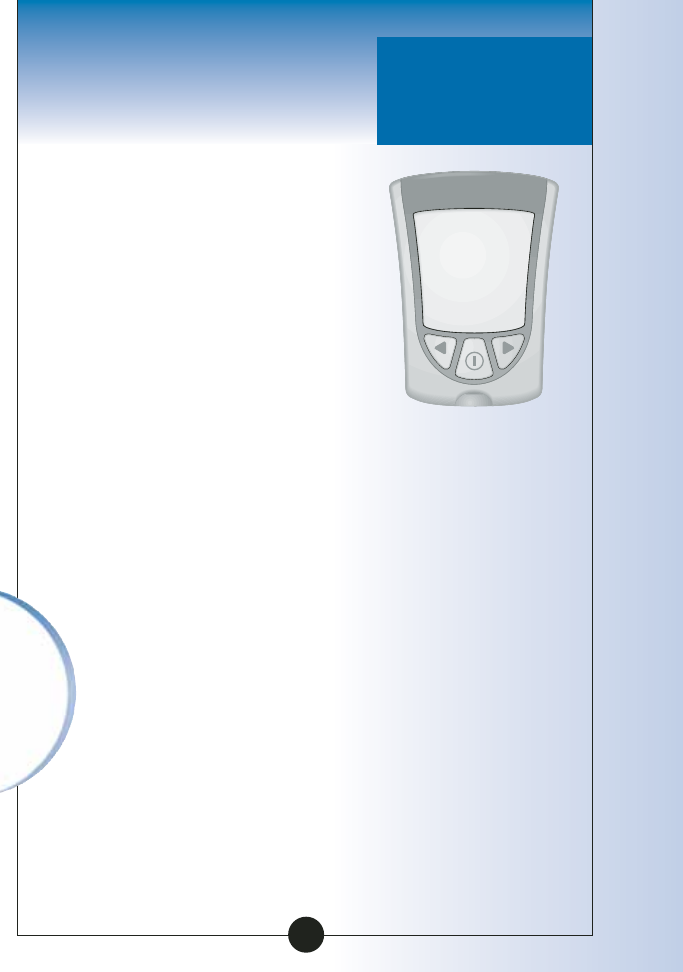
CHAPTER 9
Your Monitor’s
Specifications
& Limitations
Size
Length 2.94" (7.47 cm)
Width
Top 2.10" (5.33 cm)
Bottom 1.70" (4.32 cm)
Thickness 0.64" (1.63 cm)
Weight 1.48 ounces (42 grams)
Power Source One CR 2032 Lithium
(coin cell) battery
Battery Life Approximately 1,000 tests
Memory Up to 450 events including
control results, personal
blood glucose and blood
ß-Ketone results, and other
monitor information.
Questions? Call
Customer Care:
1-800-527-3339
Specifications
& Limitations
77
ART06986-Rev-B-MAN 8/22/05 11:02 AM Page 80
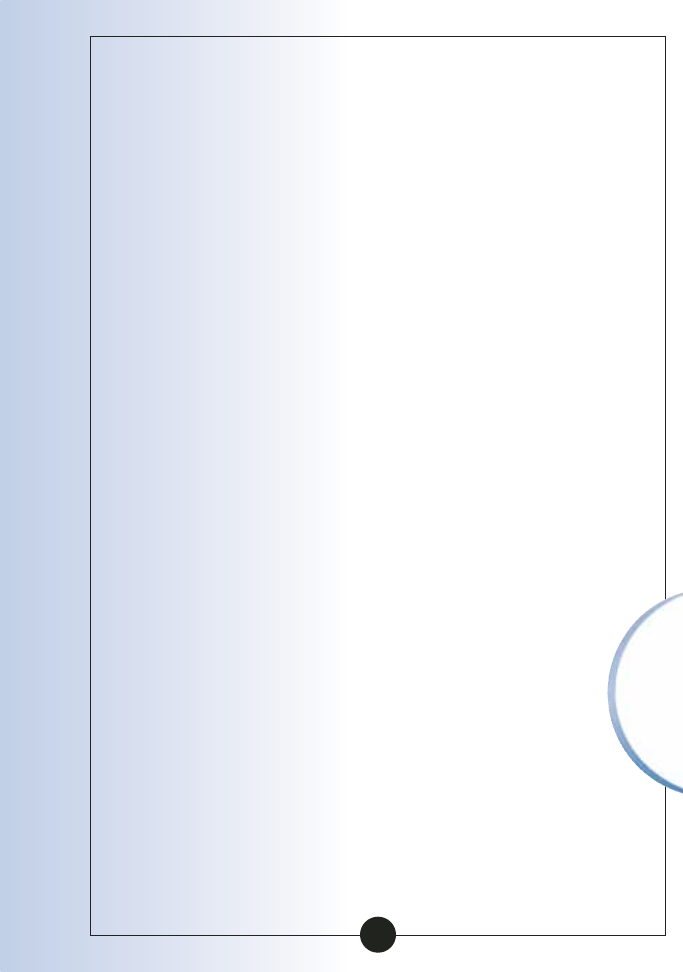
Specifications
& Limitations
Storage
Temperature
Monitor: –13° to 131ºF (–25º to 55ºC)
Test Strips: See test strip instructions
for use.
Control Solution: See control solution instructions
for use.
Blood Glucose See blood glucose test strip
Assay Range instructions for use.
Blood ß-Ketone See blood ß-Ketone test strip
Assay Range instructions for use.
Control Solution See blood glucose or blood
Range ß-Ketone test strip instructions
for use.
Functions - Blood glucose monitoring
- Blood ß-Ketone monitoring
- Memory
- Glucose averaging: 7-Day,
14-Day, and 30-Day Averages
- Control solution marking
and testing
- Backlight: If ON – Stays ON
during countdown; turns OFF
30 seconds after result is
displayed. If OFF – Stays OFF
during countdown; stays OFF
during data upload.
- Beeper: If ON – Beeps when
calibrator is fully inserted
and when countdown starts
and finishes.
78
ART06986-Rev-B-MAN 8/22/05 11:02 AM Page 81
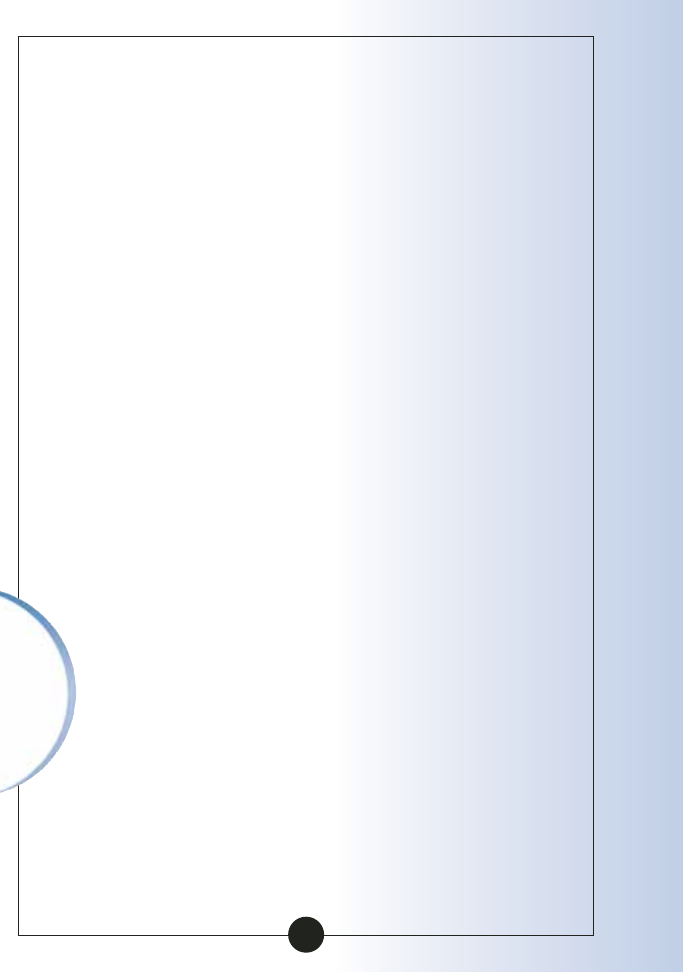
Specifications
& Limitations
Data port Yes
Monitor Operating
Range
Temperature: 50º to 122ºF (10º to 50ºC)
Relative Humidity: 10% to 90%, non-condensing
System Operating
Range
Temperature: The system operating range is
the operating range of the test
strip you are using. See
“Limitations of Procedure”
section in test strip instructions
for use.
Relative Humidity: 10% to 90%, non-condensing
79
ART06986-Rev-B-MAN 8/22/05 11:02 AM Page 82
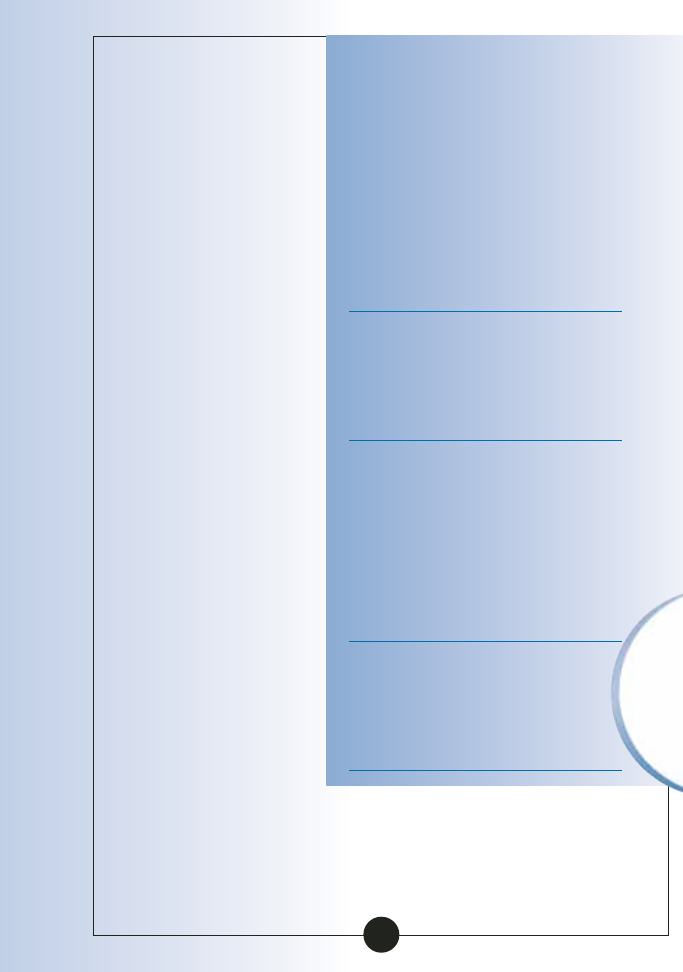
80
▼
Important Information
about Using Blood
Samples from the
Forearm, Upper Arm, or
Base of the Thumb:
•Contact your healthcare
professional before you begin
using any one of these
alternative sites to test your
blood glucose.
•Sampling from any one of
these alternative sites may
cause minor bruising and may
leave marks that go away in a
short time.
•There may be times when
alternative site results are
different from fingertip results.
This happens when blood
glucose levels change rapidly
(for example, after you eat a
meal, after you take insulin, or
during or after exercise).
•Use alternative sites to
monitor your blood glucose
before, or more than two
hours after, you eat a meal,
take insulin, or exercise.
Specifications
& Limitations
ART06986-Rev-B-MAN 8/22/05 11:02 AM Page 83
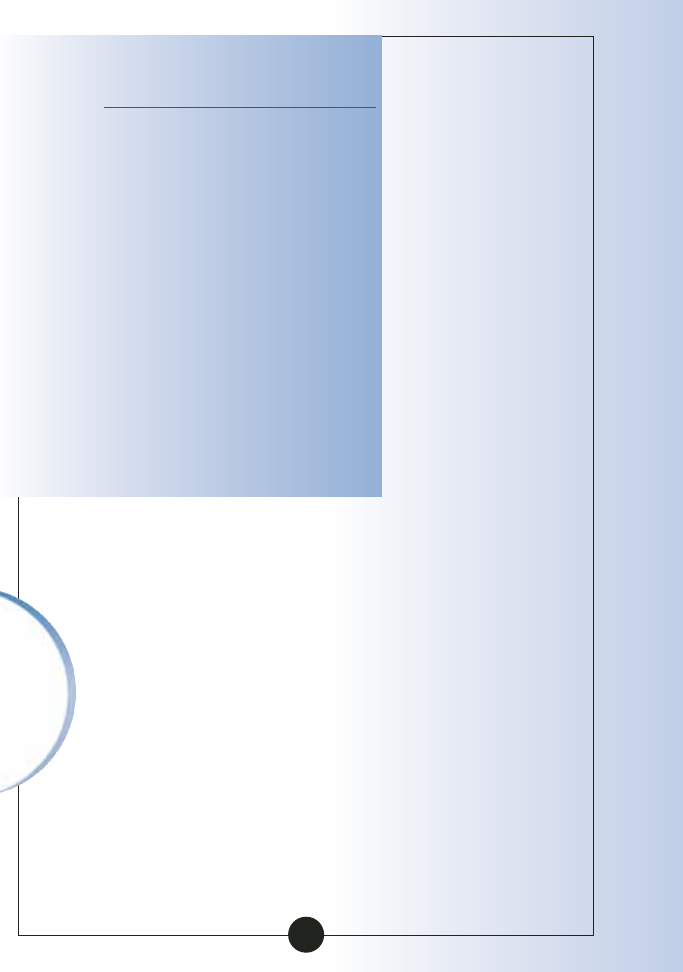
81
•Do not use blood samples
from alternative sites when:
1.You think your blood
glucose is low or is
changing rapidly,
2.You have been
diagnosed with
hypoglycemic unawareness,
3.The results from
alternative sites do not
match the way you feel,
4.It is within two hours
of eating a meal, taking
insulin, or exercising, or
5.You monitor your blood
ß-Ketone.
Specifications
& Limitations
ART06986-Rev-B-MAN 8/22/05 11:02 AM Page 84
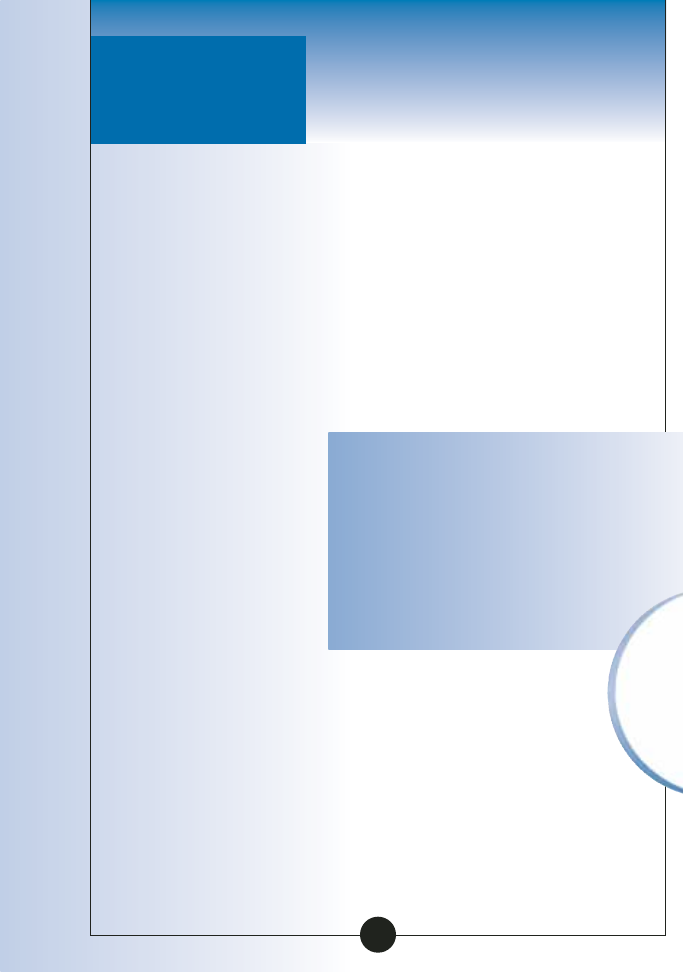
Questions? Call
Customer Care:
1-800-527-3339
CHAPTER 10
▼
82
Caring For
Your Monitor
Cleaning Your Monitor
Store your monitor in its
carrying case.
If the surface of your monitor
gets dirty, you may clean it. Use
a damp cloth and mild soap.
Healthcare professionals:
Acceptable cleaning solutions
include 10% Bleach, 70%
Alcohol, or 10% Ammonia.
Important:
Do not try to clean the
strip port.
Do not pour liquid into the
strip port or buttons.
Do not place your monitor in
water or any other bath.
Caring for
Your Monitor
ART06986-Rev-B-MAN 8/22/05 11:02 AM Page 85
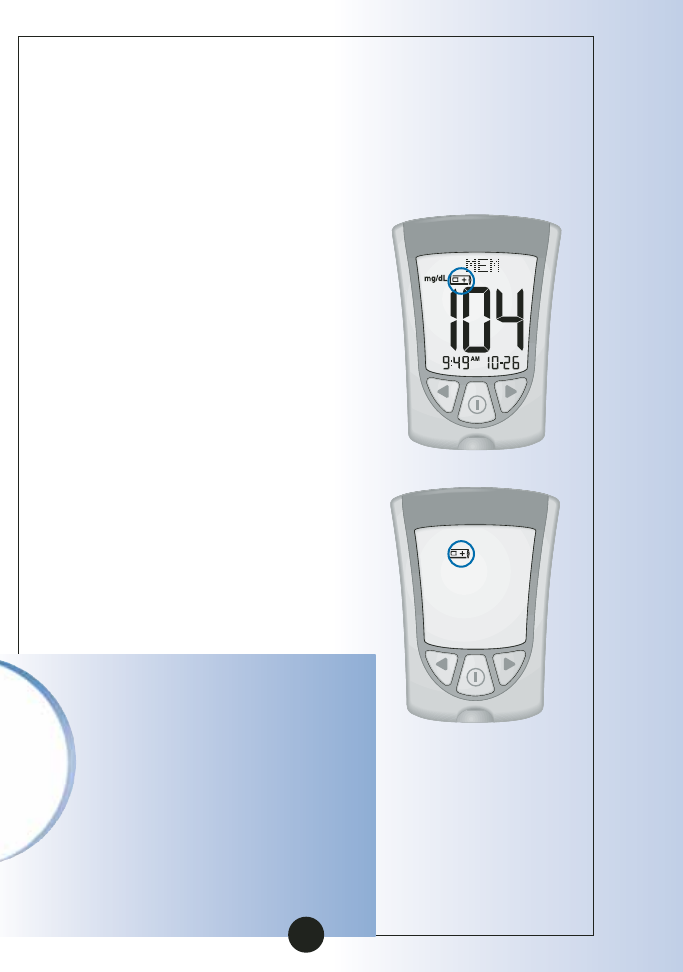
▼
Caring for Your
Monitor
Replacing Your
Monitor’s Battery
When your monitor needs its
batteries replaced, the display
window shows one of
two things:
This means the battery is
low. You may still use your
monitor and the results will be
accurate. However, the
backlight is not useable. It is
recommended that you replace
the battery at this time.
This means the battery
must be replaced. The
monitor is not useable. The
monitor turns off automatically.
Important:
Do not remove the old battery
until you have a new battery to
install. It may be necessary to
reset the time and date once
you install a new battery.
Caring for Your
Monitor
➡
➡
83
ART06986-Rev-B-MAN 8/22/05 11:02 AM Page 86
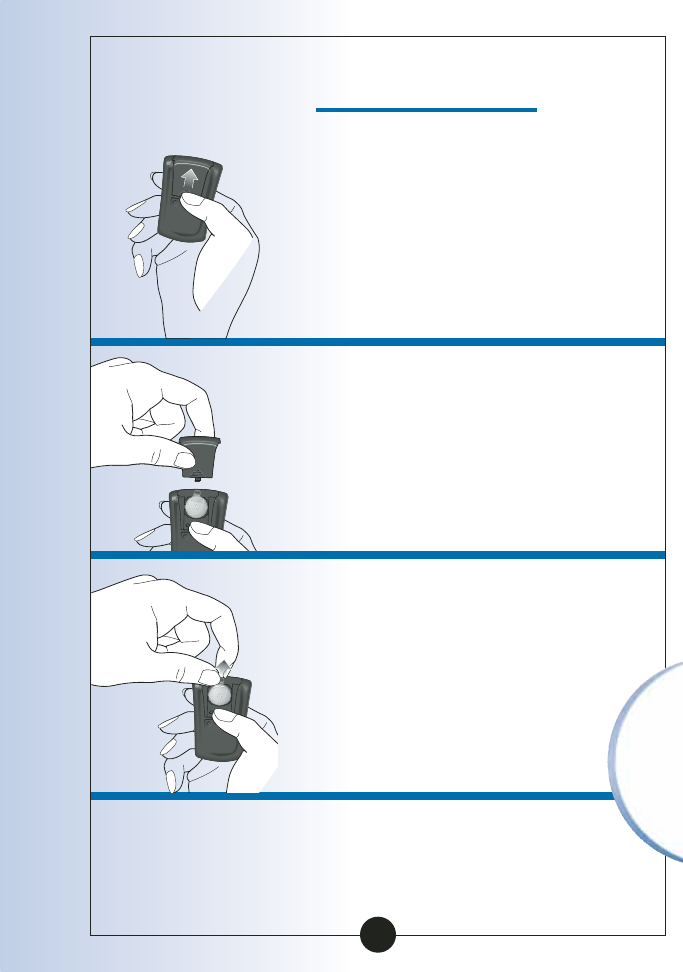
How to Replace
Your Monitor’s Battery
1Gently push the battery
cover in and up with
your thumb.
2Lift the battery cover out of
the monitor.
3Pull on the plastic tab
sticking out of the monitor
to remove the old battery.
84
Caring for
Your Monitor
ART06986-Rev-B-MAN 8/22/05 11:02 AM Page 87
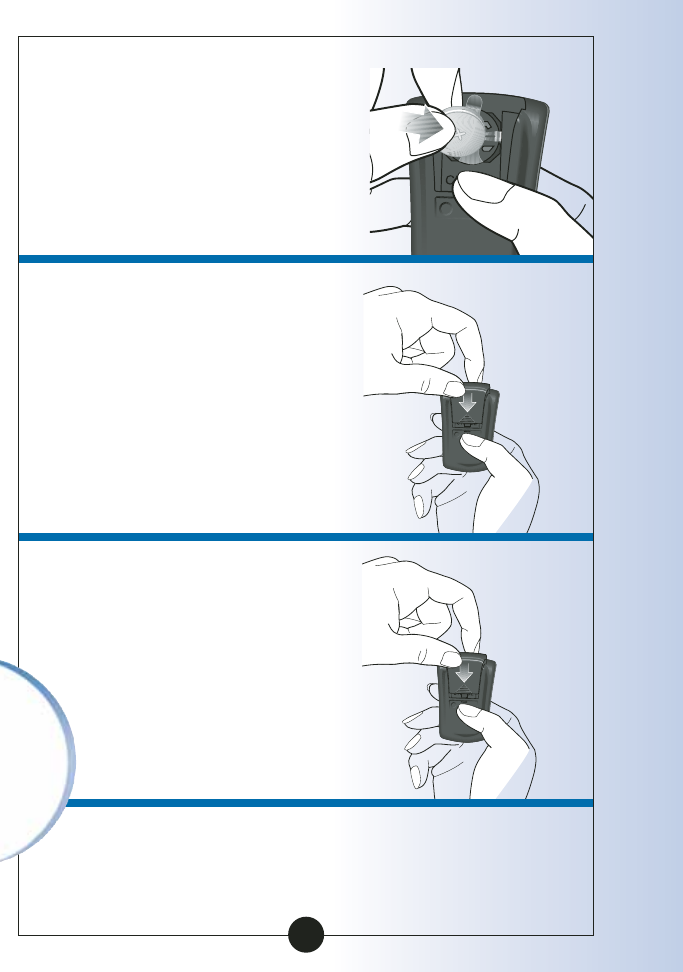
4Insert a new CR 2032
Lithium (coin cell) battery
with the plus sign (+)
facing up.
5Place the notches
on the battery cover
into the appropriate
molded areas.
6Gently push the battery
cover in and down until
you hear a click.
Caring for Your
Monitor
85
ART06986-Rev-B-MAN 8/22/05 11:02 AM Page 88
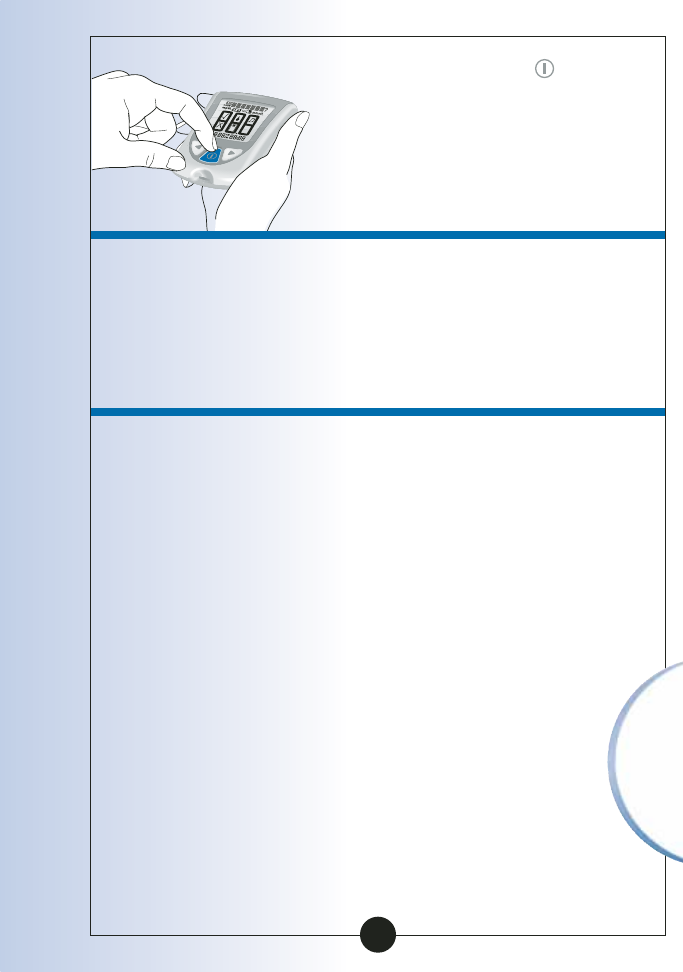
7Press and Hold the button
to turn your monitor on. If
your monitor does not turn
on, review the battery
installation steps and reinstall
the battery.
8Check the date and time on
your monitor. You may need
to reset the date and time.
(See Chapter 2, Setting Up
Your System).
9Be sure to discard the
old battery in compliance
with your local
government’s regulations.
86
Caring for
Your Monitor
ART06986-Rev-B-MAN 8/22/05 11:02 AM Page 89
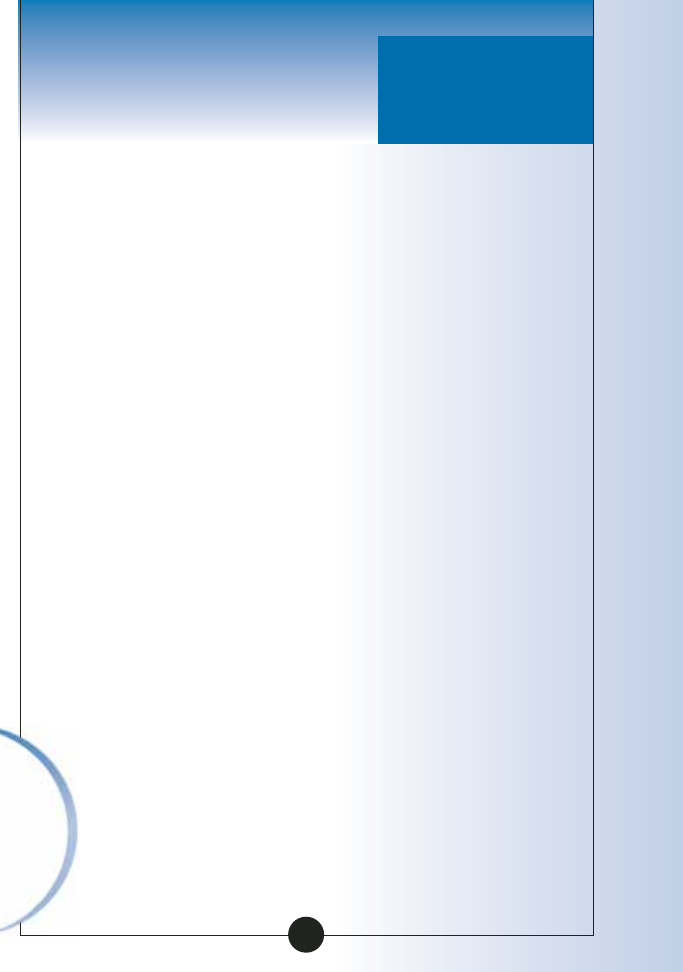
Questions? Call
Customer Care:
1-800-527-3339
Support, Guarantee &
Limited Warranty
Support
Abbott Laboratories, Abbott
Diabetes Care, is committed to
providing you with support.
Call us with any questions you
may have about your Precision
Xtra monitor:
1-800-527-3339.
Outside the United States,
please contact your local
Abbott Laboratories, Abbott
Diabetes Care office
or distributor.
You can view interactive
product demonstrations online
at: AbbottDiabetesCare.com
▼
CHAPTER 11
Support, Repair,
& Guarantee
87
ART06986-Rev-B-MAN 8/22/05 11:02 AM Page 90

88
Guarantee & Limited Warranty
Precision Xtra Advanced Diabetes Management System:
Abbott Laboratories Inc., Abbott Diabetes Care (“Abbott”) offers
a Limited Warranty, as set forth below, to consumers who buy
a Precision Xtra Advanced Diabetes Management System
(“Monitor”) within the United States. Other purchasers, please
contact your local authorized Abbott distributor for information
about possible guarantee and/or warranty coverage for
your purchase.
90-day Guarantee: Abbott offers consumer purchasers a 90-day
money back guarantee. If you are not fully satisfied with your
Monitor, call Customer Care at 1-800-300-0978 (toll free) for a full
refund. Refund will be limited to amount paid by consumer net of
any rebates. You must have a copy of the dated itemized purchase
receipt and the original packaging to obtain this refund.
Limited Warranty: Under the standard warranty your new
Monitor is covered for a period of four years from the original date
of purchase, as long as it has not been modified, altered, or
misused. Lifetime Warranty is a benefit of enrollment in the
Precision Friends for Life Program and choice of replacement
monitor will be at the discretion of Abbott.
Under the warranty, Abbott will replace, free of charge, this
Monitor, if it is defective in material or workmanship. NO OTHER
WARRANTIES, EXPRESS OR IMPLIED, ARE MADE. ABBOTT WILL
NOT BE LIABLE FOR ANY INCIDENTAL OR CONSEQUENTIAL
DAMAGES RESULTING DIRECTLY OR INDIRECTLY FROM THE
FAILURE OF THE PRODUCT TO PERFORM IN ACCORDANCE
WITH SPECIFICATIONS.
Some states do not allow the exclusion or limitation of other
express or implied warranties or incidental or consequential
damages, so the above limitations or exclusions may not apply
to you.
For Warranty Service, contact Customer Care for assistance
and/or instructions for obtaining a replacement monitor at
1-800-527-3339. Abbott may require, as a condition to obtaining
warranty service, that you return the Monitor, postage prepaid, to
an address specified by Customer Care.
Your Rights Under State Law: This warranty gives you specific
legal rights, and you may also have other rights that vary from
state to state.
Free Lifetime Monitor Upgrades: Monitor upgrade requires
enrollment in the Precision Friends for Life Program and use
of your Monitor for a minimum of three years. Choice of
replacement monitor will be at the discretion of Abbott.
Support,
Repair, & Guarantee
▼
ART06986-Rev-B-MAN 8/22/05 11:02 AM Page 91
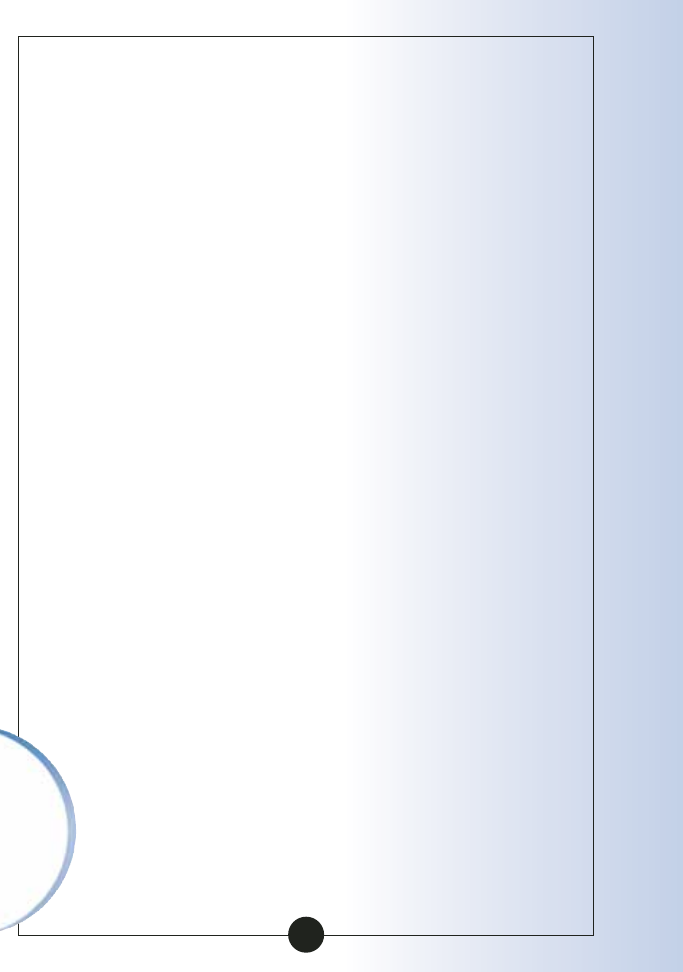
References
References
1. Directive 1999/45/EC of the European Parliament
and of the Council of 31 May 1999 concerning the
approximation of the laws, regulations and
administrative provisions of the Member States
relating to the classification, packaging and labelling
of dangerous preparations.
2. Schade DS, Eaton RP. Metabolic and clinical
significance of ketosis. Special Topics in
Endocrinology and Metabolism 1982; 4:1–27.
3. Wiggam MI, O’Kane MJ, Harper R, Atkinson AB,
Hadden DR, Trimble ER, Bell PM. Treatment of
diabetic ketoacidosis using normalization of blood
3-hydroxybutyrate concentration as the endpoint of
emergency management. Diabetes Care 1997;
20:1347–52.
4. Harano Y, Kosugi K, Hyosu T, Suzuki M, Hidaka H,
Kashiwagi A, Uno S, Shigeta Y. Ketone bodies as
markers for Type 1 (insulin-dependent) diabetes and
their value in the monitoring of diabetes control.
Diabetologia 1984; 26:343–8.
5. Ubukata E. Diurnal variation of blood ketone
bodies in insulin-dependent diabetes mellitus and
non-insulin-dependent diabetes mellitus patients: The
relationship to serum C-peptide immunoreactivity
and free insulin. Ann Nutr Metab 1990; 34:333–42.
6. Luzi L, Barrett EJ, Groop LC, Ferrannini E, DeFronzo
RA. Metabolic effects of low-dose insulin therapy on
glucose metabolism in diabetic ketoacidosis. Diabetes
1988; 37:1470–77.
7. Hale PJ, Crase J, Nattrass M. Metabolic effects of
bicarbonate in the treatment of diabetic ketoacidosis.
Br Med J 1984; 289; 1035–8.
89
ART06986-Rev-B-MAN 8/22/05 11:02 AM Page 92

Distributed by:
Abbott Laboratories
Abbott Diabetes Care
Alameda, CA 94502
USA
Customer Care available 24 hours a day, 7 days a week at 1-800-527-3339
or visit us online at: AbbottDiabetesCare.com
Reorder No.: 70297-01
MediSense and Precision Xtra are trademarks of Abbott Laboratories.
© 2005 Abbott Laboratories.
ART06986 Rev. B 8/05
PRT06986 Rev. B 8/05
ART06986-Rev-B-CVR 8/15/05 2:11 PM Page 2